Travellers can budget on the move with NAB’s new Traveller Card


By James Richards
- Updated 20.10.2021
- First Published 16.09.2014
National Australia Bank has made its Traveller Card even easier for jetsetters to use with a new capability to manage funds through internet banking from anywhere in the world.
NAB General Manager Cards & Personal Loans, Michael Shurlin said customers could load money onto their Traveller Card in up to ten different currencies before they take off on holiday and then manage their travel budget within internet banking while they were on the move.
“This new functionality makes NAB’s Traveller Card even easier to use, as we know customers take their smartphones and tablets with them on their holidays to make their travel easier,” he said.
“The technology introduced by NAB in June shows customers now find it easier to use their card, with a 30% increase in the amount of funds customers load while travelling.”
NAB is waiving the initial load fee of 1%, so customers can prepare to go overseas by setting up their Traveller Card with their funds and no fee.
NAB General Manager Digital, Todd Copeland said NAB was the first Australian Bank to link a travel card to its internet banking platform, giving customers the ability to manage their travel funds in real-time on both NAB internet banking and mobile internet banking.
“Being able to open up your internet banking and handle all your Traveller Card needs on-the-go is a great tool for our customers, and gives them more time to spend on their holiday.”
“Almost 60 per cent of NAB customers access their banking via a mobile or a tablet device, so it was important to provide a mobile solution for customers who are travelling.”
In addition to being able to load funds in real-time, customer improvements include viewing balances, transaction history and funds transfer between different currencies on the go.
Customers can cash out their cards online and keep the card open to use again in the future, and with real-time rates, customers can lock in rates via internet banking 24 hours-a-day, seven days-a-week. Ordering new NAB Traveller Cards has also been made easier and faster for customers.
Previously reloading cards overseas required BPAY payments, and steps involving pre-authenticating billers and setting up NAB as a preferred biller.
- Announcements
Related Articles

- Half Year Results
Video: NAB CEO Andrew Irvine discusses 2024 Half Year Result
In this video interview NAB CEO Andrew Irvine reflects on NAB’s 2024 Half Year Results, economic conditions and the bank’s strategic direction.

NAB announces 2024 Half Year Results
NAB has today released its 2024 Half Year Results to the market.

- Executive Team
NAB Executive Leadership Team changes
National Australia Bank Group Chief Executive Officer Andrew Irvine has announced changes to NAB’s Executive Leadership Team.
Quick links
National australia bank — nab.
Sometimes When The Unexpected Happens, We Realise What We Truly Value. Whether A Home, Farm, Business Or Your Passion, NAB Is Here To Support You.
Business Research and Insights
For more business news and analysis, visit NAB’s Business Research and Insights.
About James
James’s latest articles.
- NAB backs the ‘jab’ with new campaign
- Australia’s economic recovery will continue at pace: NAB CEO
- JBWere full member of RIAA
- NAB welcomes interim issues paper on banker remuneration
Add Your Card to Apple Pay! Now you can effortlessly add your Cash Passport card, powered by Mastercard ® to Apple Pay directly from your Cash Passport app. Click here to know more about Apple Pay.
The smarter way to travel
Multi-currency Cash Passport™. One Card, Ten Currencies.
Get your card Get the app

Multi-currency Cash Passport
10 currencies, locked in rates.
Lock in exchange rates each time you load and top up. Load up to 10 different currencies on one card. Pound Sterling, Euros, US Dollars, Australian Dollars, Canadian Dollars, New Zealand Dollars, South African Rand, Turkish Lira, Swiss Francs and Emirati Dirhams.
Stay in control
Manage and track your Cash Passport on the go via your mobile, tablet, laptop or PC. Login to My Account and stay in control of your money.
Accepted at millions of locations
Preload your Cash Passport and use like you would a credit or debit card in-store, online or to withdraw local currency at ATMs.
Global assistance
Help is only a call away. If your card is lost, stolen or damaged, we can replace it quickly or provide you with emergency cash up to the available balance on your card (subject to availability).
Today's exchange rates*
Running low on travel money.
Multi-currency Cash Passport is reloadable, allowing you to top up any of your currencies, anywhere, anytime.
You can top up in 5 ways:
- Bank transfer (via phone or internet banking)
- Via the mobile app
- Over the phone
- In participating branches
Learn more about your top up options.
Keep track of your travel money
You can use your mobile, tablet, laptop or PC to login to My Account and stay in control of your travel money.
Register for My Account , so you can:
- Track your spending
- Top up your card
- Transfer between currencies
- Retrieve your PIN number
- Suspend your card temporarily
You can also download the Cash Passport mobile app, available for iOS and Android devices.
Travel with confidence
Safe and secure access to your money
Cash Passport uses Chip and PIN technology which means you can rest assured you have additional security making your card safer than carrying cash. Accepted at millions of locations and cash machines worldwide.
Looking for a back-up card for safe keeping? Simply purchase an additional card when ordering online or in-store.
We're here to help
We're only a call or email away at all times. Our global assistance team will help you if your card is lost, stolen or damaged.
We can replace your card quickly or provide you with access to emergency cash up to the available balance on your card (subject to availability), so you can keep enjoying your holiday.
Need further help?
View our frequently asked questions or feel free to contact us .

Cash Passport™ app
The new Cash Passport app has an improved design that makes managing your travel money faster and easier.

Start travelling smarter in just a couple of taps. Activate your Cash Passport card from your mobile, download the app from the iOS or Android store, log-in, and load up with your preferred currency. Simple!
Now you can securely store your payment card details in the Cash Passport app, so whenever and wherever you are, you can top up with up to 10 currencies, including Euros, US, Australian and Canadian Dollars and British Pounds at the touch of a button.
Stay in control the smart way. The new message centre feature lets you stay on top of tailored notifications, including low balance and transaction alerts. Keeping you up to date with your own personal need to know information.
Move money between your currencies with just a couple of taps – it’s that simple! Quickly move money between 10 currencies and spend more time enjoying your holiday.
Priceless Cities
Priceless Cities is a program available exclusively to Cash Passport cardholders and provides access to unforgettable experiences in the cities where you live and travel.
There’s a world of possibilities waiting for you to explore, so why not break free from your routine for a moment, a night, or even a weekend? Fuel your passions. Make memories to last a lifetime. Start Something Priceless.
Find out more
Multi-currency Cash Passport is issued by PrePay Technologies Limited pursuant to license by Mastercard International. PrePay Technologies Limited is authorised by the Financial Conduct Authority under the Electronic Money Regulations 2011 (FRN: 900010) for the issuing of electronic money and payment instruments. Mastercard is a registered trademark, and the circles design is a trademark of Mastercard International Incorporated.
*Foreign exchange rates can fluctuate and the rate that applies one day will not necessarily be the same on any other day. The exchange rates set out on this website apply to top-ups that are made via this website only and that are applied to your card account within four hours. We will provide you with the applicable exchange rate at the time you top up.
Apple and the Apple logo are trademarks of Apple Inc. registered in the U.S. and other countries. App Store is a service of Apple Inc. registered in the U.S. and other countries. Google Play and the Google Play logo are trademarks of Google LLC.
Today’s exchange rates*
The Best Travel Debit Cards for Australians In 2024
Tom Goward | 27/03/2024
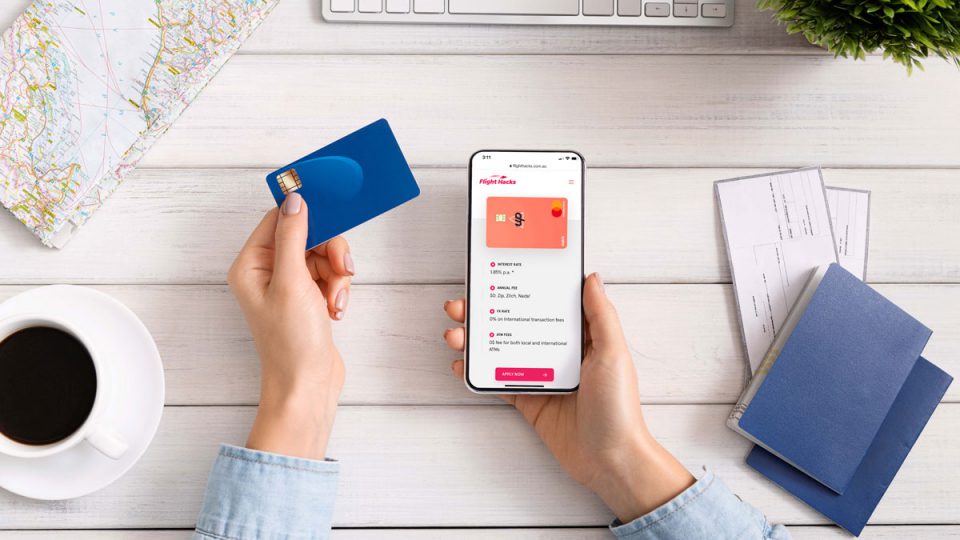
TLDR ; our experts rated Up ($15 free bonus), Ubank ($10 free on with code C7N1TAZ ) & Revolut (Free $15 exclusive Flight Hacks bonus) as the best travel debit cards for 2024.
No matter where you’re going or for how long, making use of a good travel debit card is one of the easiest ways to save money overseas. The problem is that amidst the excitement, the importance of selecting the best travel debit card often slips the minds of many Australians until the eleventh hour. Most novice travellers fail to realise their mistake until arriving home with an overstuffed suitcase and card fees that could’ve been easily avoided.
The harsh reality is that banks and airport currency exchange services will often rip you off, despite their claims of ‘zero fees’ or ‘0% commission’. Think about it, how can an exchange booth afford the insane airport rent if they don’t make a cent from running their business?!
The good news is that Australians have a few brilliant options when it comes time to select a travel money card. While the array of choices can be overwhelming, with a little research and planning, you can save a considerable sum just by using the right card!
WATCH: our video comparing 11 of the most popular travel cards in Australia!
In this post:
What About Prepaid Travel-Branded Cards?
Foreign exchange rates: visa vs mastercard, making a €500 card purchase, withdrawing €500 from an atm, up debit card, ubank debit card, revolut australia, macquarie transaction account, hsbc everyday global account, wise multi-currency account, honourable mentions – best travel debit card, qantas travel money, commbank travel money, travelex money card, nab visa debit, anz plus transaction account, westpac travel money, ing orange everyday, summing up: our expert tips, travel debit cards faqs, global spending: travel debit card 101.
Many amateur travellers will use their day-to-day debit card overseas, simply because it’s easy to use a card that already has your money loaded and ready to go. But before tapping away, it’s important to understand the fees you’ll be in for.
When making international purchases, there are three main fees you should understand;
- International Transaction Rate: Charged when you make a purchase with an overseas merchant, often as a percentage of the total transaction. In Australia, many banks charge a foreign transaction fee of 3% or higher.
- Overseas ATM Withdrawal Fee: Charged for the privilege of withdrawing your own money at an overseas ATM, typically a fixed dollar amount per withdrawal. Sometimes the ATM operator will charge an additional fee for using their ATM. How fun!
- Foreign Exchange Markup: This is where banks are especially sneaky. While you might think you’re getting the real exchange rate, like you’d see searching Google or XE, banks will make up their own rate which includes a hidden fee on top. Of course, you will only be shown the ‘final price’ to hide the fee applied to the real rate.
If you’ve been looking for the perfect card to use overseas, you would have seen big banks and loyalty schemes offering travel money cards. But just because your day-to-day bank offers a dedicated travel card, it doesn’t mean you should get one. In fact, if a card has the word “travel” as part of its name, RUN AWAY while you still can. That is, unless you like being shafted by some of the richest companies in Australia.
Prepaid options like the Commbank Travel Money Card and Qantas Travel Money Card typically offer a portal where you can preload a foreign currency, before arriving at your destination. While it might sound logical to have your money in the correct currency before payment, the fees involved can be astronomical. Despite the promise of “fee-free load options”, there’s almost always a huge foreign exchange markup when you send Australian Dollars to a prepaid card.
The other downside is that you’re forced to lock-in the exchange rate when loading Australian Dollars. While this is marketed as a perk, it’s also a potential disaster if the exchange rate moves against you, after you’ve transferred your entire spending money across. So, unless you have a crystal ball that predicts when the exchange rate is best, I wouldn’t see it as a benefit myself.
Although Visa and Mastercard don’t offer cards themselves, they do have a say in determining the foreign exchange rate you’ll get. While prepaid cards devise their own inflated rates, the best cards, which we will share below, utilise the Visa or Mastercard exchange rate without applying a markup. The difference between the two is almost non-existent, so there is no point in selecting your card based on the payment network.
The table below shows how much Visa and Mastercard offered for 1 AUD as of 27th March 2024. As you can see, the rates are identical, except for JPY where the difference is minuscule anyway.
How Much Can I Save By Using A Good Card?
How much you can save will depend on the fees associated with your day-to-day card, how much you spend and where you spend it. Let’s compare transactions if you were to use the Commbank Travel Money, Qantas Travel Money or Up Debit cards.
The Commbank Travel Money card charges a flat 3% fee for currency conversion on purchases and withdrawals. Qantas Travel Money claims to have “no fee” for purchases in their marketing material, but their foreign exchange rate adds an insane markup.
As an example, say you paid your 500 Euro hotel bill using one of these cards. Based on our testing (on 27th March 2024), Commbank would charge a $24.92 fee, while Qantas slaps a disgusting $47.13 or 5.67% markup on top of the real exchange rate. Remember – the Qantas card has access to Mastercard’s foreign exchange rates, and if they so pleased, could offer the same true fee-free rate as Up’s Mastercard option.
The Commbank Travel Money card charges $3.5 for ATM withdrawals, charged in the currency from which you’re making the withdrawal. Qantas charges a different rate depending on which currency you’re withdrawing, but for Euros, it’s €1.5. Of course, Up doesn’t charge a fee.
As an example, say you need to withdraw 500 Euros from an ATM. The conversion fees are the same as above, but you’d need to pay an additional fee for using the ATM. Keep in mind that the ATM you use could charge its own fee, but this will apply to most cards so it’s the same across the board.
Our Picks: Best Travel Debit Cards In 2024
Now that you understand how critical it is to utilise a good debit card overseas, it’s time to explore the best options for Australian travellers. Not all banks provide the same features, so be sure to shop around and find a good fit for you. We’d also recommend packing at least one backup card in the event your main card becomes lost or stolen.
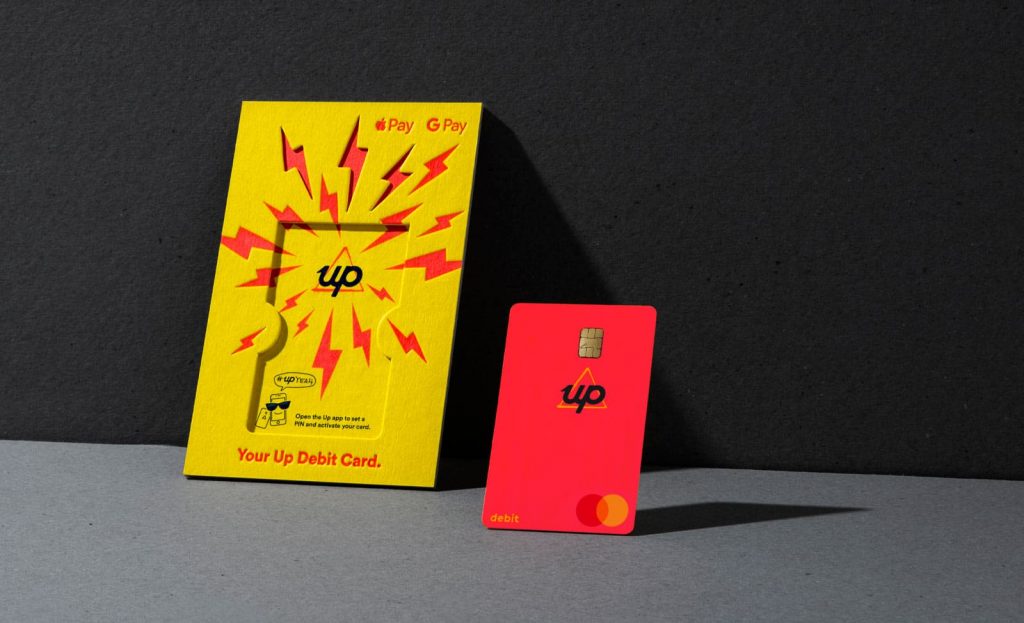
- Payment Network: Mastercard
- International Transaction Rate: 0%
- Overseas ATM Fee: $0
- Account Fee: $0
Sign-Up Bonus: $15 – For a limited time, you can receive a $10 welcome bonus for becoming an Upsider! Join using our Up Bank invite code to score $15 after joining.
Up is a digital bank (owned by Bendigo & Adelaide Bank) that proves it’s possible to love your bank. Setup is a breeze, and of course, Up charges absolutely nothing when you use an Up Debit card overseas. As a neobank, Up doesn’t have any physical branches, with everything easily handled from within the best banking app I’ve ever used. It’s super clean by design and packed full of useful features like payment splitting, the ability to detect recurring charges, easy payments to friends by name and detailed spending insights.
Want the full story? Check out our detailed Up Debit Card Review !
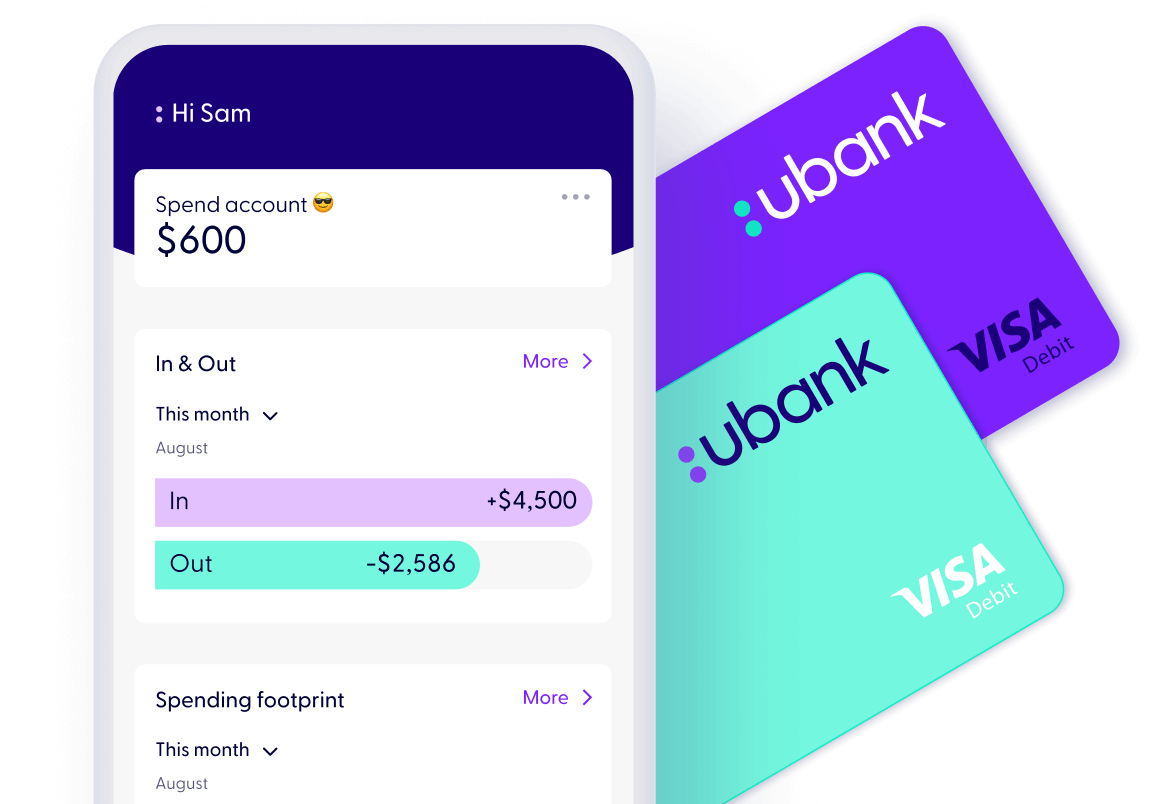
- Payment Network: Visa
Sign-Up Bonus: $10 – For a limited time, you can use our Ubank referral code C7N1TAZ to score $10 in your new Ubank account after making 5 purchases within 30 days of signup.
Ubank is another digital bank with zero fees for using your connected debit card overseas. While the app isn’t quite as fantastic as Up’s offering, Ubank is still a great option. The upside is that Ubank also offers savings accounts that have consistently given some of the highest interest rates in Australia. Not to mention joining takes just a few minutes and they offer a joint account option.
After more info? Read out our complete Ubank Debit Card Review !
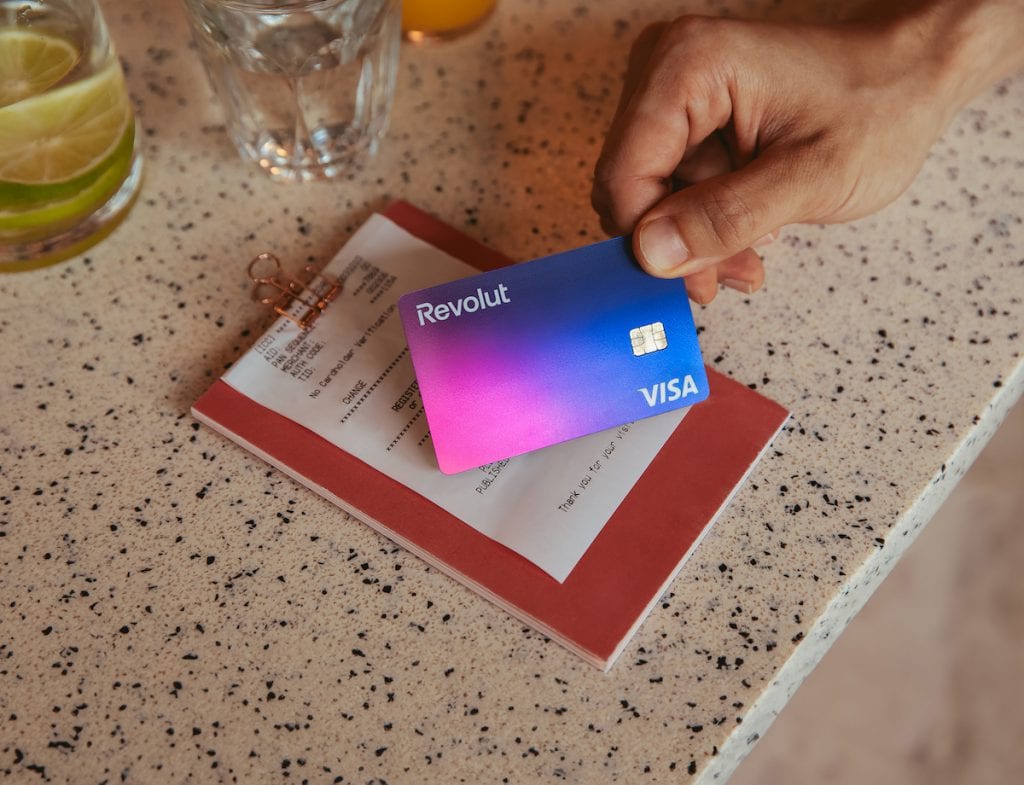
- Overseas ATM Fee: $0 ($350-$1400/m fee-free limit based on plan)
- Account Fee: $0-$24.99/month (based on plan)
Sign-Up Bonus: We’ve partnered with Revolut to offer Flight Hacks readers an exclusive $15 in their new account. Join via this link to score $15 after making 1 transaction within 14 days.
Everything money is accessible with Revolut, from spending on your debit card to investing in stocks and EFTs, crypto, gold and silver. From a travel perspective, Revolut offers minimal fees and the ability to preload your card with one of several currencies or spend using AUD at the current exchange rate. SmartDelay also offers complimentary airport lounge passes for you and up to 3 friends when your flight is delayed by more than an hour.
Revolut is also great for those travelling with anyone aged 6 to 17, thanks to the option for parents and legal guardians to create a linked account for their children. The main account holder gains access to a bunch of insights and controls, while under 18’s can spend their own funds with the same money-saving perks as the main account holder.
In Australia, Revolut offers users a free Standard plan, in addition to increased perks on a Premium ($9.99/month) or Metal ($24.99/month) membership. While also including a solid reinforced steel card, the Metal option offers monthly benefits like three fee-free international payments, unlimited fee-free weekday currency exchange and fee-free ATM withdrawals up to $1,400. Not willing to pay for a full year? You can always upgrade for your trip and cancel the plan once you return home.
Ready to learn more? View our Revolut Australia guide !
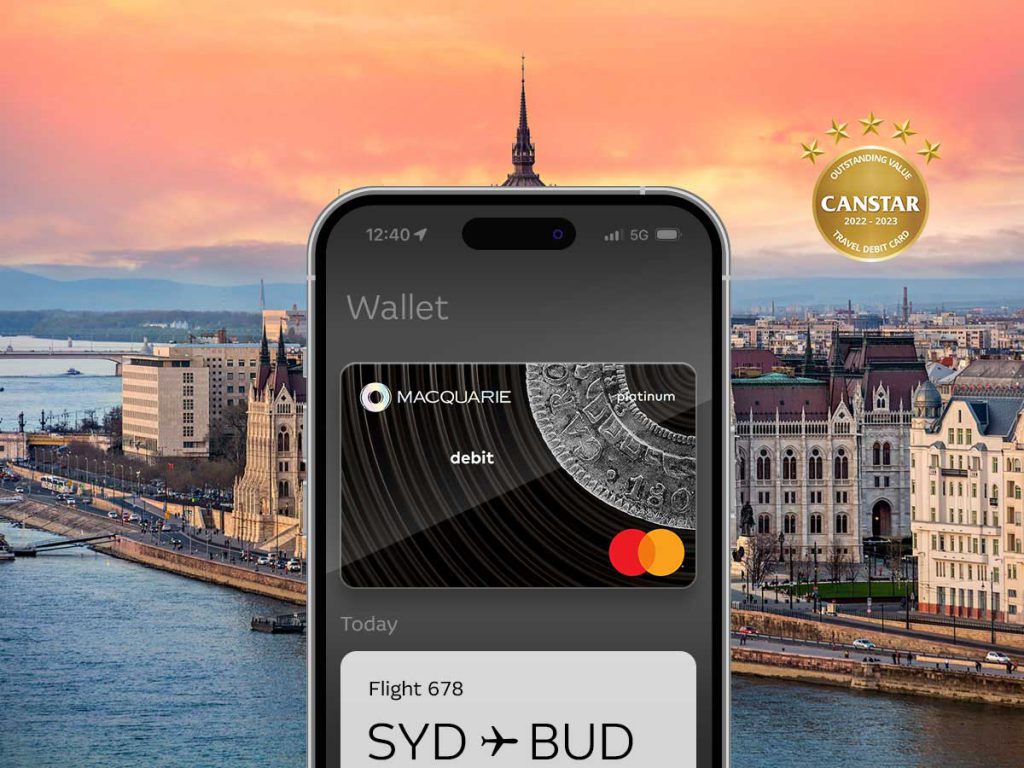
- I nternational Transaction Rate: 0%
If you’re after a debit card for travel from a big bank, but not quite big enough to rip you off, Macquarie has you covered. Although the app and online banking portal are in desperate need of an update, the product itself is hard to fault.
Macquarie also offers a few perks like a luggage return service that will pester the airline on your behalf, if they mishandle your checked baggage. There is a small service fee for this, but if your bag is not returned within 96 hours, you’ll receive a $100 payout per lost bag. In addition, cardholders have access to a concierge service, card purchase cover and wallet guard cover. Considering this is just a debit card, those are some nice benefits to have up your sleeve.
Deposits made on a Macquarie Transaction Account can also earn interest, up to 4.75% p.a (as of March 2024).
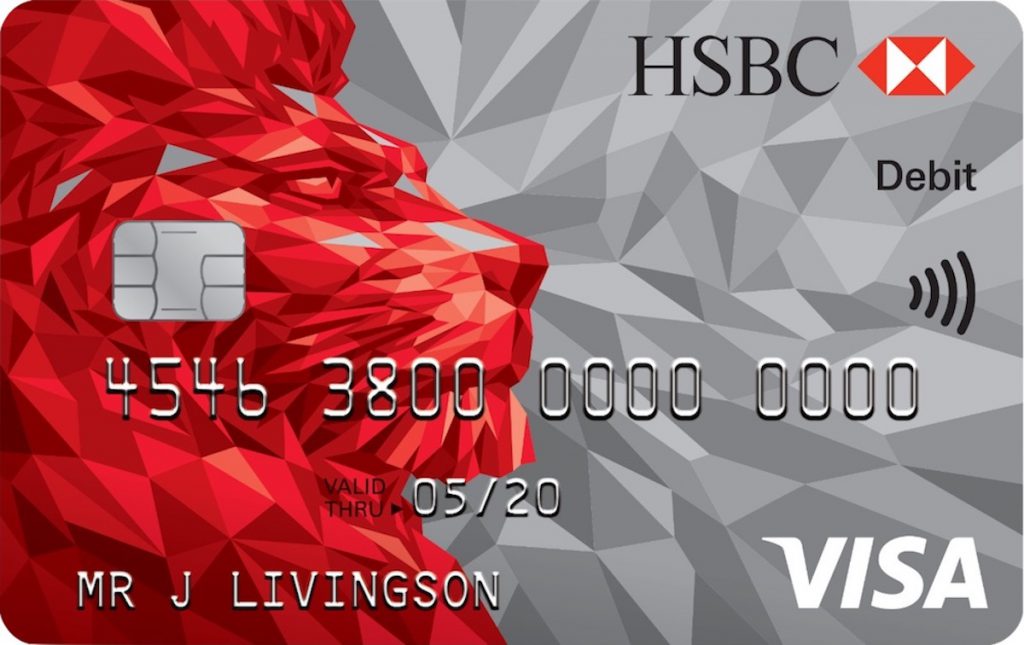
HSBC’s worldwide reach makes its Everyday Global Account an attractive offering. If you need to make an ATM withdrawal, you can visit a HSBC ATM to guarantee zero withdrawal fees around the world! The exception is in Argentina, France, Greece, Mexico, Malta and Turkey where there is a small fee.
There’s an option to buy and transfer between ten currencies (AUD, USD, GBP, EUR, HKD, CAD, JPY, NZD, SGD, CNY), although HSBC does hide a foreign markup here by using their own HSBC Daily Exchange Rate. For the best rate, simply load AUD onto the debit card before spending overseas, where the Visa exchange rate will apply with zero markup.
Plus, if you deposit at least $2,000 into your Everyday Global Account before the last business day of each calendar month, you can earn 2% cashback up to $50 per month. You’ll earn cashback on eligible purchases with Australian merchants under $100, when you spend via payWave, Apple Pay or Google Pay. There are a few transactions that won’t be eligible, including public transport, car parking and vending machines.
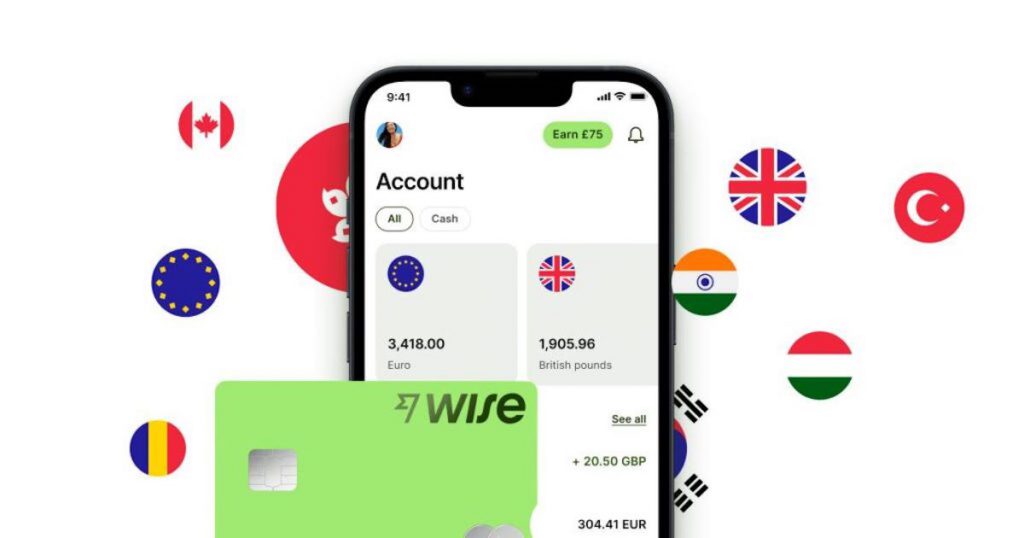
- Overseas ATM Fee up to 350 AUD/month: $0
- Overseas ATM Fee over 350 AUD/month: $1.50 ($1.50+1.75% for 3+ withdrawals)
- Card Load Fee: 0% to 2% depending on currency
- Physical Card Fee: $10
Wise (previously Transferwise) used to offer one of the best cards out there, until moving to an overly complex fee structure that feels very ‘banky’. That includes a $10 fee if you’d like a physical debit card, and high fees for withdrawing money overseas, once you go over the small monthly allowance. We do appreciate that those fees aren’t hidden, and you’ll see the exact exchange rate and the Wise fee applied before completing a transfer.
Because they still offer a real mid-market rate and are one of the best options for transferring foreign currency between friends, Wise still makes our list. They also offer a cool virtual card feature, that can be useful for pesky subscriptions or transactions where you want to cancel your card afterwards, without the consequences.
All up, Wise is a solid option if you need to make a bunch of transfers, but one to avoid if you plan on using overseas ATMs.
Keen on Wise? Why not read our Wise Australia review !
We’d be here all day if we reviewed every Aussie debit card with zero foreign transaction fees and fee-free overseas ATM withdrawals. Our guide above covers the best options for most travellers, but there are a few cards that deserve an honourable mention.
- Bankwest Easy Transaction Account
- ME Bank SpendME Transaction Account
- Suncorp Everyday Options Account
Australia’s Worst Travel Debit Cards Revealed
Many big banks and frequent flyer schemes market travel money cards, but often, these come packed with hidden fees that make them completely useless. Unless you enjoy giving away your money (in which case you should send it directly to us), here are some popular options to avoid;
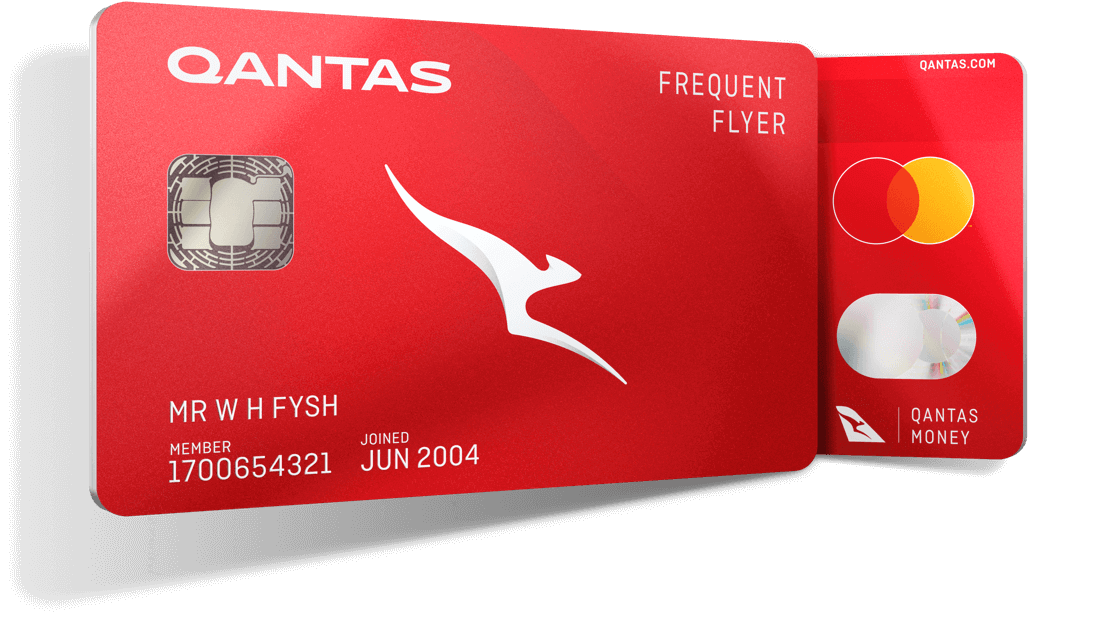
- International Transaction Rate: “free” with hidden markup
- Overseas ATM Fee : approx. $1.95 – $3.00 (varies with currency)
- Card Load Fee: 0.5%
Qantas Travel Money is possibly the worst travel card out there. While advertising zero exchange fees, the ridiculously expensive “Qantas Travel Money Daily Rate” is used when you transfer funds between currencies or make a purchase. For example, in our €500 spend test above, using the Qantas Travel Money would cost a whopping $47.13 more than using a fee-free Up debit card. That’s a hidden markup of 5.67% – and Qantas will still charge an ATM fee!
For international purchases, you can earn 1.5 Qantas Points for every $1 equivalent spent in foreign currency. Even though we love Qantas Points, the insane nearly 6% markup is a complete ripoff and not worth paying to earn points.
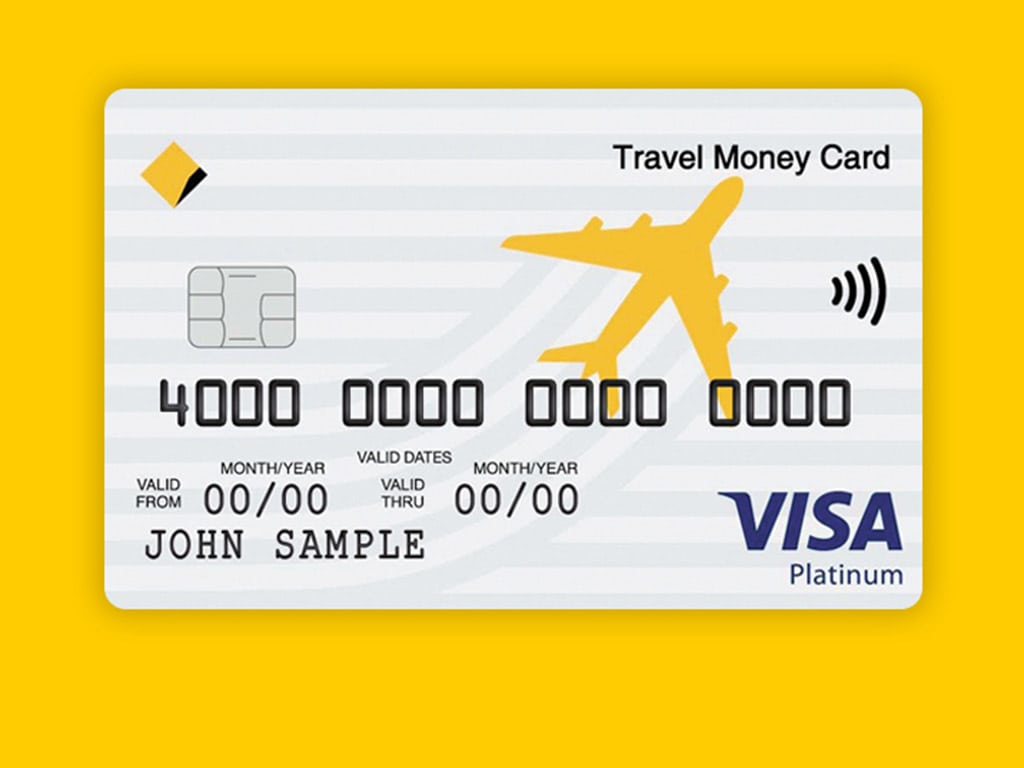
- Foreign Exchange Rate: 3%
- Overseas ATM Fee: A$3.50
- Card Load Fee: “free” with hidden markup
Despite its widespread usage, the Commbank Travel Money Card is another terrible option for overseas spending. That popularity comes from Commbank’s extensive customer base within Australia, with many travellers sticking with the one bank, instead of exploring better alternatives. But the thing is, each of the no-fee options listed above can be funded instantly from your existing Commbank account, so there is no upside to using Commbank Travel Money.
While the card itself is free to hold, there’s a 3% conversion fee applied with each transaction made in a different currency. Additionally, you’ll pay $3.50 for every overseas ATM withdrawal. Commbamk becomes an even worse option once you realise how misleading their advertising of “no reload fees” is. While technically true, Commbank makes up its own exchange rate for card loads, which is approximately 4.4% worse than the Visa rate (at the time of writing). Essentially, this translates to a 4.4% fee when loading foreign currency onto the Commbank Travel Money Card.
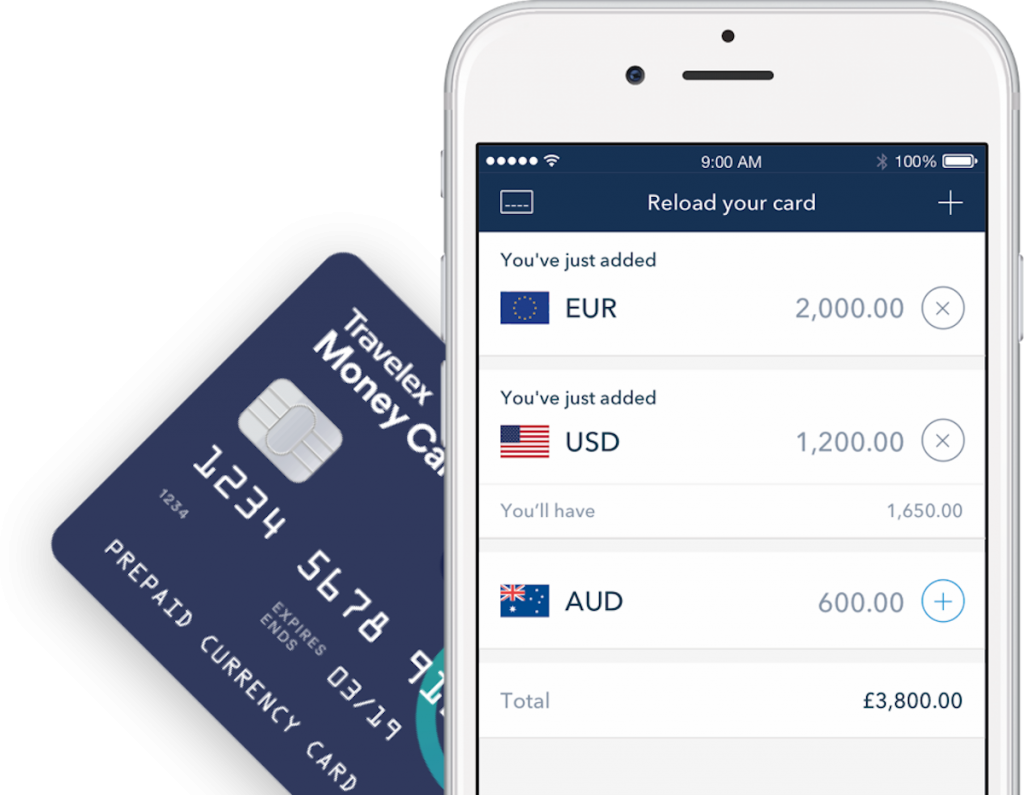
- Overseas ATM Fee: $5
- In-Store Load Fee: 1.1% or $15 (whichever is higher)
- Online Load Fee: $0
- Inactivity Fee: $4 monthly (once your card is inactive for 12 months)
- Closure Fee: $10
You only have to read the endless list of fees to realise the Travelex Money Card is about as deceptive as it gets. Travelex does offer unlimited fee-free overseas ATM withdrawals, which is nice, but once you realise the other fees that are adding up and decide to close your account – oh wait, there’s a fee for that! You’ll also need to pay Travelex a monthly fee for the privilege of NOT using your card, once it becomes inactive for 12 months.
Travelex’s PDS says their foreign exchange rate is “set and determined by Mastercard”. What they don’t openly admit is that there is a hidden markup, which is easily spotted when you compare the Travelex exchange rate to that offered by Mastercard.
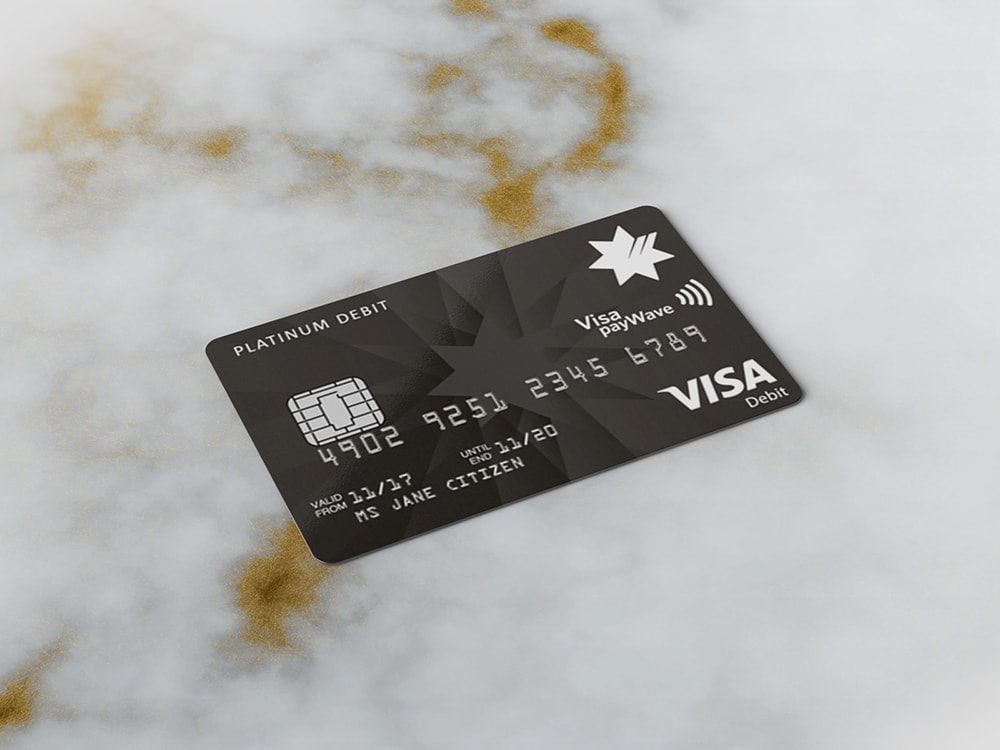
- International Transaction Rate: 3%
When NAB acquired Citibank in Australia, they removed one of the best big-bank travel cards available (the Citibank Saver Plus) and directed new customers to the NAB Visa Debit Card. As far as international spending, this new option is an absolute waste of plastic.
Instead of guaranteed free transitions at Citibank’s enormous overseas ATM network, you’ll get charged $5 at every single overseas ATM – yay! There’s also a juicy 3% international transaction rate, so you’ll pay a fee regardless of how you spend your money overseas.
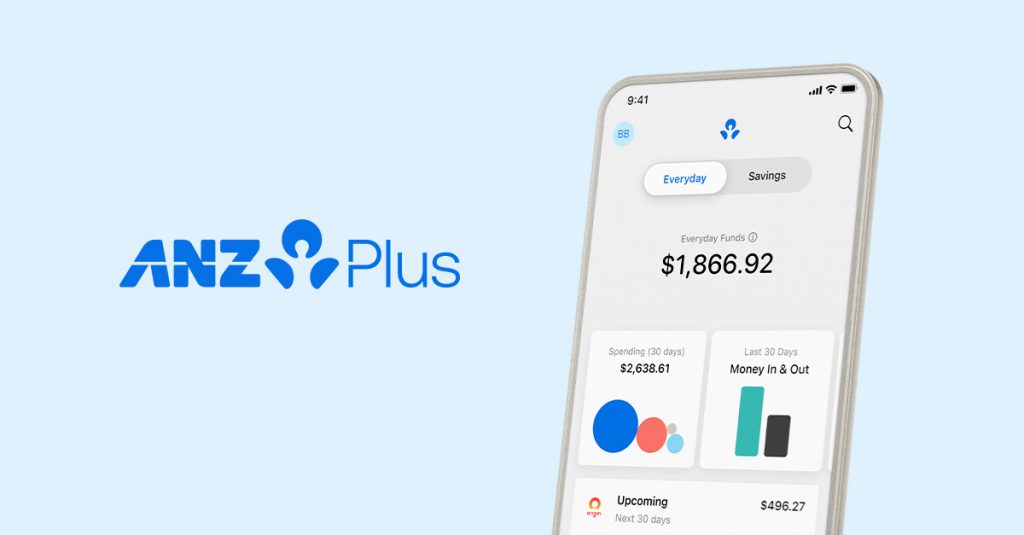
ANZ Plus is ANZ’s new digital banking service that comes with a transaction account and a linked savings account. ANZ and ANZ Plus are like two peas in a pod, except one pea decided to get a snazzy makeover and call itself ‘Plus’. It’s as if ANZ woke up one day and thought, ‘You know what this bank needs? Another version of itself that’s slightly better but nearly identical’.
In all honesty, ANZ Plus is a solid product to use within Australia, with a cool banking app, competitive interest rate and useful insights to help you save money. But the good news stops there, with ANZ’s better version of itself keeping the fees for international use. You’ll pay $5 for overseas ATM withdrawals and a 3% fee on foreign transactions.
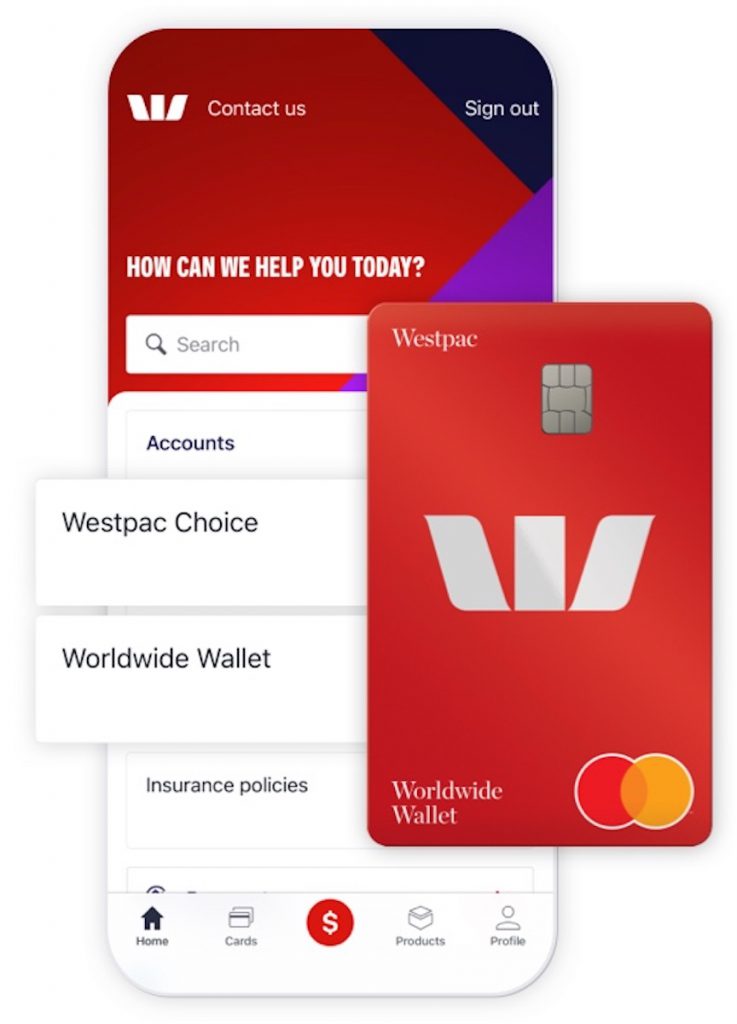
- Foreign Exchange Rate: 0%
- Overseas ATM Fee: approx. $1.50-$3.50 (varies with currency)
As far as big-bank travel cards go, Westpac’s Travel Money Card (also known as the Westpac Worldwide Wallett) isn’t quite as terrible as the rest. Although there are still hidden fees when you load your card, as well as when you withdraw money from an overseas ATM. The only reason we say Westpac’s travel card isn’t as awful is that they use the Mastercard rate when spending in currencies you don’t have loaded, without a markup. But overall, this is still one to avoid.
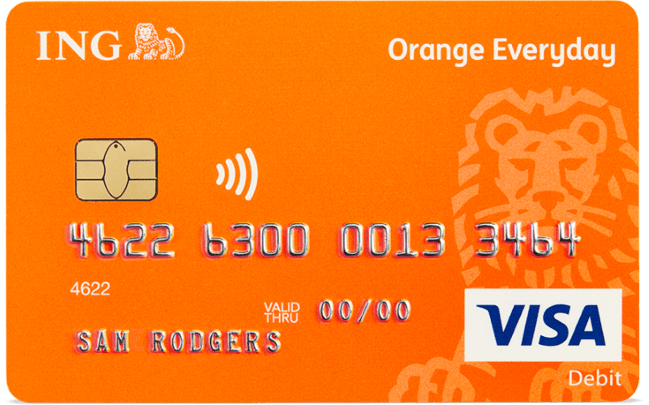
We used to love ING’s Orange Everyday card for overseas spending. But as the card became more and more popular, ING decided to capitalise by introducing international transaction fees, and then raise them even higher.
You can get all international transaction fees rebated, but you’ll need to make at least 5 eligible purchases and deposit at least $1,000 to one of your personal ING accounts every month. The same can be said for overseas ATM withdrawals, of which the first five fees can be rebated provided you make at least 5 eligible purchases and deposit at least $2,000 to one of your personal ING accounts every month.
Because of this unnecessary step to qualify for zero fees, we no longer recommend the ING Orange Everyday for travel.
With so many fee-free travel debit cards available, there’s no reason why you should pay banks every time you need to spend money overseas. With a little research into a travel debit card that suits you, it’s pretty easy to save thousands in bank fees.
Alongside a fee-free card, be sure to employ these tips when spending overseas;
- Never pay in Australian Dollars: It’s one of the biggest travel card scams out there as merchants will make up their own terrible foreign exchange rate, and then charge a fee on top, to convert the local price to Australian dollars. You’ve probably paid with an EFTPOS machine or used an ATM that asks if you want to pay in AUD instead of the local currency. While it might sound like you’re getting a better deal with Australian dollars, this is almost never the case. Be sure to pay in the local currency, using a fee-free card above.
- Check for fees applied by the ATM: While any good debit card will offer zero ATM fees, that doesn’t stop ATM operators from charging their own fees. The machine should tell you before charging a fee.
- Be prepared with multiple card options: In case your card stops working, is stolen or becomes lost it’s a good idea to have a backup card.
- Use your travel debit card for online purchases: Avoid foreign transaction fees when shopping online with overseas merchants by using your card for travel.
I am going to visit [insert destination] – which card should I use?
The cards we recommend above are great for spending overseas. Be sure to consider the features important to you (eg. no ATM fees) when selecting a card for travel.
Which card uses the best currency conversion rates?
We have compared Visa and Mastercard’s spot rates above – there is little difference. Be sure to use a card that uses these spot rates, without applying a markup.
Can I use any Australian debit card overseas?
Nearly all Australian debit cards with a Visa or Mastercard symbol will work around the globe. There are a few exceptions, for example, many cards are currently blocked within Russia and other regions of conflict.
Should I tell my bank where I’m going?
It’s not something we regularly do, but it doesn’t hurt to notify your bank that you’ll be travelling overseas to avoid international purchases being mistaken for suspicious activity.
Why shouldn’t I transfer a bunch of AUD to the currency I will be spending?
It’s a bad idea to convert money ahead of your trip unless you have a crystal ball and know which way the exchange rate will move. If the exchange rate changes in your favour, you could lose out big time. The most accurate rate is achieved with a fee-free card loaded with AUD, using the payment provider’s spot rate
Can I use any frequent flyer credit card overseas?
While your Australian credit card will work overseas, most will charge a 3% fee when spending in a foreign currency. If your card earns a high number of points per dollar, that fee could be worth paying. It just depends how many points you’re going to get, and what fee you’ll be charged.
Which travel debit card is best for international travel?
The best travel debit card is going to have low or no international transaction fees, as well as the features that best suit you. Be sure to check out the best cards listed in this guide.

Chief Operating Officer & Aviation Nerd at Flight Hacks
Off to Singapore and KL in October, got the BankSA Worldide Wallet card. Unsure whether I’d be better off using a card like the Up debit card instead.
Seems like an “ok” product but they charge for ATM withdrawal, in Europe 2 euros per transaction, 2USD in the US and 1.5GBP in the UK unless you use one of their partner ATMs. I’d say use UP if you’re unsure about whether the ATM you’re about to use is affiliated with Bank SA to save on the fee.
Hi Emmanuel, with the up debit card an u bank card , can you load the money from central america on there to take out? and or can you use the card over there anyway?
No, you can’t. If you want to load a foreign currency, I’d use Revolut or Wise.
Re: unbanked & up – both are digital banks so when I go overseas to Europe how do I notify these digital ‘banking institutions’ of my overseas travel dates so they don’t block my cards?
Hi Jefr, digital bank only means they don’t have a physical branch you can walk into. Personally, I can’t recall the last time I went into a physical bank. As for letting them know you’re travelling, I’ve never done this with either Ubank and Up and have had zero problems. When it comes to fraud, 99% of happens online so they do have a function where you can turn on or off international payments within the app. When you’re traveling and shopping, most of the banks now are smart enough to detect genuine transactions and don’t block you.
I have the Citibank one, it’s fantastic I find. Good rate which I locked in before travel so I know exactly how much I have to spend, I am even in Hawaii at the moment and even though the ATM operator says it charges $4.35USD per withdrawal, my card has not charged it.
I think it’s a mistake to lock in rates before you travel unless you have a crystal ball and know which way the FX market is going to move. Personally, I prefer to convert on the spot which gets you the best rate each time.
Not sure why Wise (previously known as Transferwise) makes on the list but HSBC Everyday Global Account didn’t make the cut. They also offer $0 ATM fees (no cap on withdrawal per month) and 0% overseas transaction fee.
Hi JW, it’s definitely not a complete list and HSBC is a pretty good product as well. I’ve got an HSBC Everyday Global Account but don’t use it because the app is a pain.
how about Bankwest https://www.bankwest.com.au/personal/bank-and-save/bank-accounts/easy
Also not a bad product, does pretty much the same as Up/Ubank etc.
what do you think is the best travel card for Moldova? I know not many people go there, but being a non EU country whose currency isn’t in much demand, I think we get stung when withdrawing from an atm. I’m using the QANTAS travel card. It was many currency wallets, but no Moldovan Leu. In Chisinau, Moldova seems to default to taking US dollars. I get the feeling we are double converting. AUD to USD and then to Leu. Ouch!
Do you know any other alternative?
Hi Ben, one of the debit cards listed here will work just as well. You should never convert money beforehand unless you have a crystal ball and know which way the FX markets will move 😀 The Qantas travel debit card isn’t a great product as they take a much too large percentage on every transaction or conversion you make. I would just use a debit card (or credit card) that doesn’t charge FX and let your bank do the conversion on the spot, much easier.
Thanks for a very interesting article about these attractive products. However, a doubt remains – how do these cards make money out of you? That is, what they do not take with one hand, must be taken by the other.
Hi Tom, most products listed above are not advertised as a “travel card”; why is that you may ask? It’s because the features they offer don’t make them much money, sure they might get a cut from the Mastercard or Visa spot rate but that’s not their main breadwinner. These products offer these specific features in the hope that you will move away from your traditional bank (think Westpac, Commbank, ANZ) and do all your everyday banking with them.
What do you think is better the citibank card, ubank or travelwise? 🙂 Tossing between those 3.
I’d go with Ubank since they are an actual Australian bank and the limits of Transferwise are somewhat limiting (no pun intended). Citi is also good but the app and website are not user friendly IMO. Bonus of Ubank is that they give you $20!
Could you please elaborate more on what the limits are for the Transferwise?
No limits for card payments but there is a very restrictive limit for ATM withdrawals which is $350 a month with max 2 cash out transactions. After that, they charge a fee.
I already have Suncorp and Commbank credit cards and before reading your article I applied for Wise and Resolut. I’m going on cruise which takes USD then group tour of Europe. Would I be better off canning Wise and getting UBank for for atm withdrawals, use Revolut for in store transactions? Also, what should I use to pay hotel accommodation with. Any that I should leave at home? Thank you in advance.
Hi Karen, some Commbank credit cards don’t charge international FX fees so worth checking this, if you have one with no markup it would be best to use that for card purchases and then use a Ubak/Wise card for ATM withdrawals, Wise has limitations on ATM use so hence it’s not our go to for these things, Ubank/Up are both free and no limits (other than daily) for ATM use. I always reccomend taking a few cards and never rely on just 1 option.
JEN, Citi have withdrawn from the multi currency markets since they where purchased BY NAB. SAD, they were a great card
I have been researching some of the reviews on the cards, some adamantly say don’t use ING because of poor customer support when something goes wrong. Do you know of any that standout as having a good track record for customer support?
I’ve used ING in the past, and didn’t have a bad experience. That said, I’ve never been in a situation where I would need real customer support. For what it’s worth, Up bank has a chat feature within the app so that’s handy when you need a replacement card or something.
Can confirm support is not great, had several issues lately. Call centre times 20-30+ minute wait minimum, which especially sucks while overseas. Need to use Skype, etc or request a call back which can take days. Trying to resolve via messages is useless, appears they are unable to authorise anything this way.
On the plus side only ones that refund ATM fees so unfortunately still recommend them, have saved me a significant amount. Make sure you have several backups, to be honest have all the cards recommended – no fees and no stress if issues occur.
Hey Immanuel, Which is the better of Ubank and Up and why, especially considering you say Mastercard gives better rates than Visa? Thanks in advance!
Also between those and Travelex which I keep reading about?
Maybe times have changed but Travelex offers the worst travel cards/services IMO. As a general rule it’s safe to avoid anything that has the word travel in its name.
I found out that Travelex have competitive rates on their card – and the fees are $0 from our point of view. We can’t protect ourselves from the other side, but at least we can protect ourselves from the Australian point of view.
Plus, you can talk to a physical person in store about it. You can’t do that with the others – I’ve tried wise – and you do a chat – which i hate. I prefer the customer in person approach – especially if things go wrong – you can talk to a person in person and over the phone – and they have toll free numbers around the world for help.
Rates and fees are one thing – BUT HELP AND SUPPORT is a big factor for me when using a Travel card overseas.
Hi Miguel, I would argue the opposite. Travelex makes some of the worst products on the market, that said they do offer convenience (exchange money at the airport). For this, you’re paying a conversion fee of 3.65% (based on the Visa spot rate AUD-USD calculated today), this might not sound like a lot but it’s a rip-off in my book. Up, Ubank, Revolut, Citi Bank, ING etc. offer far superior products with full support (they have a banking license) and best of all they don’t charge fees, on top of that they’re just everyday bank accounts which is an added bonus. The physical people you talk to at Travelex are just salespeople, I’m not sure what sort of support you would need/expect from them? Personally, I carry multiple (free) cards with me so if one gets blocked for whatever reason (which has never happened) I just switch to the other one. Cheers, Immanuel.
Both are pretty much the same, bonus is that you get $20 with Ubank. For rate difference between Visa and MasterCard to matter much you would need to spend a lot of $$, instead, I would prioritise ease of use.
Going to US in 2 weeks. Just wanted to check your advice please. You mentioned “You should never convert money beforehand unless you have a crystal ball and know which way the FX markets will move”. Does this mean I should load up a Ubank Card with AUD and use this for both direct purchases and ATM withdrawals & rely on spot rates? It seems from the discussions above that foreign exchange occur at the UBank end. Is this a correct understanding?
Hi Geoff, your understanding is spot on. Converting currency in advance, hoping you will get a good deal is the equivalent of gambling, nothing wrong with it but the chances you get it right are just as good as the chance of getting it wrong. Ubank is just like any other Australian bank account, free to have money in your account and once you pay with your card it will be converted on the spot by Ubank.
Is there a conversion fee when you buy on the spot with a Ubank or Up card? Also can i book accommodation here in Australia and then just pay at the hotel using the Ubank card and it will just convert with no transaction or conversion fees?
Ubank is an Australian bank, they issue a free debit card (just like any other bank in Australia). You can’t have any currency other than AU$ on it so yes, your account will always have AU$ and it will be converted on the spot to pay for any transaction in any currency that’s supported by Visa, as per our article there’s 0% conversion fee imposed by Ubank (that’s why we like it). The card and bank account have no fees so of course you wouldn’t be charged a fee for booking accommodation using this card either.
Thanks for the article. Do the recommended cards offer travel insurance?
Hi Raymond, for cards with travel insurance you can check out our frequent flyer credit cards here , I can’t think of any debit cards that would offer free travel insurance. Since insurance is very personal, I can’t give you a recommendation as I don’t know your circumstances. However, I can tell you which one I personally use. For me I rely on Amex Business Platinum travel insurance as it’s activated even if I don’t use the card to purchase my flights, it also covers additional card holders so anyone I have listed on my account is automatically covered.
Amex non business credit card don’t give you travel insurance unless u buy your ticket with their card. The issue is if you buy a points flight, which is only technically paying tax, not actual flight, they won’t cover you with travel insurance when u claim as haven’t actually bought a fight. Hard lesson to learn.
ANZ Black or Platinum give you 6 months travel insurance per trip ( including family traveling with you) plus 6 months income protection of $1700/month(may be more $ now, they paid that much in 2017). As long as you spend $250 of your trip eg accommodation on your ANZ card and have a return ticket which can be a points bought one before leaving Australia. Also any auxiliary card holders are entitled to this insurance cover if travelling independently from you. Both my adult children used this to cover them on international trips at great savings. Also earn the most points / $ spend with ANZ black of any credit card except maybe business AMEX card. I never paid for travel insurance and have saved heaps over the years with this. Non cover you for extreme sports though or riding motor bikes if don’t have a bike licence in Australia or illegal to in the country you are riding eg Vietnam. Also can get a certificate prior to leaving saying they are covering you in certain countries of travel if needed.
Hi Immanuel I have a 15 year old daughter going on a 3 month student exchange to Italy at the end of this month. A number of travel websites recommend paying in cash in Italy so regular ATM use will be expected. She will be staying in a smalll village in Tuscany so may not have access to some of the “international/fee-free” ATMs. She will likely be spending around $600 per month (which exceeds some of the monthly fee-free ATM limits). A lot of the recommended debit cards have restrictions for under 18s. What do you recommend for her? Thanks
Hi Stephen, I believe all of these products have an age limit of 16 or older, not sure why but no doubt has something to do with government legislation. What I would do is open an account in your name and just give her the card to use and app login to manage her money. Paying by card is much more popular in Europe now than it ever was and it’s especially usefull when adding the card to a mobile wallet such as iPhone/Samsung etc. Ubank and Up are both very much geared towards young people so I think those would be good options to try out.
Great discussions. Thanks all. How about these cards Westpac – http://www.westpac.com.au/international-travel/travel-money-card/ Commbank Travle money card – https://www.commbank.com.au/travel/travel-money-card.html?ei=prod_TMC
Please advise. Thanks once again.
Westpac is alright but they charge ATM fees so I’d pass for that reason alone. Commbank, avoid unless you want to pay 3% on your transactions. The problem with these cards is that they want you to load it up with foreign currency, however, unless you’re a successful FX trader by profession, the chance of you timing the markets is slim. So essentially you’re gambling on the idea of currency either going up or down, if you were to just let your card convert it on the spot, you would always pay the market price which would then average out over time.
Thanks Immanuel, great discussions. How about wise card and what’s your opinion about it.
Also good but the limits are somewhat prohibitting.
Do you know if you need to convert currency with the Westpac worldwide wallet? I’m travelling to Vietnam and it’s not a listed currency. I would like to withdraw cash.
Hey Mae. Yes, Westpac Worldwide Wallet would require you to convert AUD before using the card, essentially gambling on the exchange rate. While that could work in your favour if the exchange rate worsens, you could also lose out big time. Westpac Worldwide Wallet does not currently support VND. Because of this and the extra fees Westpac charges, you might prefer the UBank or Up cards as mentioned above. Happy travels, Tom.
What is the best travel card for ATM withdrawals. We intend to pay for most things such as meals, taxifares and public transport by cash in the UK and Ireland. Is this the most cost effective method or are we better off just presenting our card when paying for goods and services. TIA
Hi David, Ubank and Up both don’t charge ATM fees so that would be my pick. When paying, it might be easier by card as then you don’t have to convert any leftover currency back but it depends where you go. Small towns in Europe for example sometimes don’t have card facilities so it’s just easier to pay in cash.
Hi Immanuel.
Just confirming, is the link below the ‘travel’ card for UBank, as it is coming up as a ‘transaction’ account rather than ‘travel’ card, so I want to make sure it is the right one?
https://www.ubank.com.au/banking/transaction-account
Any other advice regarding using this card (if the correct one) or UBank’s travel card (please send link) would be greatly appreciated.
Kind regards
Hi Joe, they only have 1 type of account as far as I’m aware. The product isn’t advertised as a “travel card” because they don’t really make money from it. That said, it makes an excellent travel card because it doesn’t charge fees, it’s easy to manage, free and they give you $20 for joining. As previously mentioned, by warry when a product brands itself as “travel” related; there are usually fees associated.
Hi, I was just wondering with up bank do I have to create another account with wise. Just a bit confused. Thanks
Hi, no you don’t unless you plan to send money to family/friends via international transfer. If you just want to use the debit card to pay for stuff and take money out of the ATM, you don’t need to do anything.
Hi Immanuel, Do you know which card would be best to take to Bali? My son will be taking AUD cash as well to change over there for a more favourable rate but lots of cash is a risk.I’ve also heard that ATM’s charge their own fee (randomly) and when making purchases using a credit or debit card a 3% fee is charged. Can you confirm or deny? 🙂 Thanks
Hi Jenny, I wouldn’t take cash, the rate you would get from a vendor will most certainly be worse than what you can get at an ATM. The debit cards listed above such as Up, Ubank etc don’t charge any fees. If an ATM charges you fees, it will always disclose this before you proceed with the transaction, most often it’s a fixed amount. Always use reputable bank ATMs and you will be fine 🙂
Hi Immanuel, thanks for the advice above.
Which is the best card for us?
My partner is heading of the the USA, Canada. Then we are flying across to meet her in Netherlands, then Scotland followed by a trip to Italy for a holiday.
She likes the Wise Travel, I like the Macquarie. I think the limit on withdrawals from atms is a pain in the wise one. She thinks the Wise one has a better currency conversion rate since Macquarie uses Mastercard rate.
What are your thoughts? It’s hard to find detail on ubank and what their currency conversion rate is.
If you plan to use the ATM a lot, I’d stay clear from Wise as they are very limited on withdrawals. If the cards are free, get both that way you always have a backup. Personally, I take an Up debit card and Ubank debit card, if one gets blocked or I lose it somehow I have a backup and it takes seconds to transfer funds from one account to another.
Hi. Just trying to understand how you transfer money if one card has been lost/ stolen, wouldn’t every transaction be blocked ??
You can just lock the card it self. This means you can still use the account.
I just wanted to come here to say thank you Immanuel, so much information – exactly what I wanted to know and have been agonising over! The fact you are still answering the questions a few months after the article was written!
Hey Chantelle, thanks for the kind words! We’re actually planning to add more products to this article soon to expand the comparison for people.
Ditto from me – your info has been really helpful to me to choose the right card for travelling o/s. Just got word from Citibank that they will be closing down their travel card that I have used for last 10 years, so I am in the market for a new one. This article and the follow up discussions have been invaluable. I’m tossing up between UBank & Up Bank. Thanks again for a very informative article and more importantly, the follow up discussions.
Thanks Lisa! Both Ubank and Up are pretty much identical when it comes to real world use. It will come down to which app you find easiest to use. Try them both, it’s free after all 🙂
Totally agree!! How often do we find a site with an article and ability to comment…only to never hear from the author…way too often!
I travel internationally on occasion (Australia bound next month) and I think this discussion is incredibly valuable!! I’ll be getting both Up and Ubank as there is really only an upside to both.
Thanks for the feedback Bryan! When readers take time to comment, we take time to respond. It’s also very useful for others reading this article as it adds information that might not have been clear or mentioned in the main content.
Hi After reading all this I’m still not too sure. I’m traveling to UK and USA in December 22 and have applied for a Revolut card, what do you think? Regards Elly
Hey Elly, Revolut is also really good. You might even want to consider switching to their premium product for the duration of your travel as it might be worth it 🙂
Hi, Interesting article on paying for things overseas! One question/comment. I think it is necessary to advise the bank that your card will being used overseas? Otherwise the bank may put a stop on the account in case it is being used illegally.
Hi Neil, I personally don’t advise them and haven’t experienced any issues (with debit cards that is)
Hi Immanuel, we are travelling to Thailand next year. My sister uses Latitude 28 Degrees Global Platinum Mastercard. Is this any good? Otherwise, I’ll go with the Ubank card. Thanks for some great advice. Regards, Melissa
Yes, it’s good, no FX fees but it’s a credit card so not good if you want to take cash out. Ubank is a debit card/bank account so it’s perfect for taking cash out of ATMs etc.
Hi Just want to which debit card is best for Switzerland? I am traveling from Australia
Hi Ali. Any of the six cards we have listed above will suit your travel to Switzerland.
Im going to europe this year, ill be using card a lot, dont think i need to use atm much. Im considering either UP, wise or NAB platnium. I have considered the NAB platnium because they offer free travel insurance. Do you have any more advice, which would be best for me. Thank you.
Hi Karla, if you plan to use the card a lot it should work out ok since they charge $10 a month account-keeping fee which can be offset by the cashback rebate of up to $10 per month. Just make sure you read the T&C of the insurance to make sure it’d adequate for you.
Hi Immanuel going to Bali and if I get the UBank card do I just put aud in it, and when I pay at restaurants does it just convert to IDR then or do I have to change my Aud to idr.
Hi Chrissie. Good choice! Just load your UBank card with AUD and when you pay it will convert to IDR automatically. Blue skies, Tom.
Hi, thanks for providing such great information it’s really helped narrow down the search for the best debit card to use for our honeymoon. We are travelling to Cancun Mexico and considering either Citibank Plus or HSBC Global account. Do you think we will be fine with these cards?
Hey Adele. HSBC is a good product, although the app needs some serious work. Citi will serve you well along with the other cards listed here. Happy travels, Tom.
Am going on a six month trip – 3 months total in Morocco and Tanzania, and then 3 months in Europe. Am agonising over how to do the money thing – don’t want to carry wads of cash and don’t want to pay loads of fees if I pay by card or make frequent atm withdrawals. Would the Ucard be a good option for me if I just load it up with AUD before I go?
Ubank, Up, Revolut… all good options and will do exactly what you need.
Choosing a card is really hard as the reviews are not that great with any of them. Want to get a card which offers security for my money and easy access to it. I am planning to go to Europe and am worried I wont be able to use my card because its blocked or funds have disappeared (comments in a few google threads). Are all these cards covered by the government guarantee? Are these cards supported by large banks with good customer support should something go wrong?
Many thanks
Hi Diane. We have listed the best cards for travel above, you may wish to consider these for your trip to Europe. Under the Financial Claims Scheme (FCS), deposits of up to $250,000 are protected at licenced banks in Australia. As for the neobanks cards above, Up is backed by Bendigo Bank and UBank by NAB. In my experience, their customer support is fantastic. Cheers, Tom.
Hi Diane. We have compared Visa and Mastercard currency conversion rates above – there is little difference here. As long as you are using a card with zero foreign transaction fees, these are the rates that will apply. Cheers, Tom.
Thank you for the article. My concern is how long will it take for money to be transferred from another bank account onto these Travel Cards so that funds are available? Are you better off getting a travel card from your current bank to get the instant transfer?
Hey Poppy. If your current bank and the the card you will use for travel both support Osko, deposits will be instant. You can check what banks support Osko by clicking here . Cheers, Tom.
Surely ING is worth a mention? As far as I know they’re the only one that offers ATM fee rebates. Unfortunately they’ve recently limited this to 5 per month (whether domestic or international), but depending on the country this could still be worth ~$50. If you only withdraw cash once a week or so while travelling this really isn’t an issue. It’s saved me 100s of dollars in the past while travelling so I’m happy to deal with some sub par support!
Hey Jordan. We did have the ING Orange Everyday card listed when putting this guide together a few years ago. ING was since removed after the benefits became slightly more restrictive, although it’s still a worthy contender for travel. Blue skies, Tom.
We’re going to Argentina in January, which is a money minefield! – with the official dollar rate via banks vs the blue dollar that is worth nearly twice as much when exchanged for USD cash. Apparently the govt is in the process of introducing blue dollar (or better) rates for tourists using foreign cards, so that makes taking a debit card instead of wads of USD cash much more feasible. Are you aware of this? Do you have any advice at all? If not, we’ll take a chance on one of your recommended cards and hope that it works over there. Thank you!
Hi Diane, yes Argentina isn’t your typical country haha the “blue dollar” is the black market exchange rate for USD to the native peso and indeed, you will be much better off bringing USD (make sure you get the newer bills) as everyone in the country wants them. You will still be able to use a debit card at ATMs but when doing so you will convert at the official rate which as you stated is far from favorable. Are you transiting via the USA before getting to Argentina? In this case, I would get USD cash from US ATMs using an Australian debit card, this way you will get the best exchange rate, then take the cash to Argentina and exchange it to Peso on the black market.
Thanks so much for your reply and advice Immanuel. We are flying direct from Sydney to Santiago and from there to Buenos Aires, so no opportunity to use a US ATM I’m afraid. We’ll continue to watch the situation (with a sceptical eye) and assume that USD cash is still the way to go. Sigh.
Hi Diane, if you use Western Union they give you the Blue $ exchange rate. Initially I thought this was only with US $ but according to a discussion on Travel Advisor, it works for other currencies as well. By setting up an account and have Argentina as your home, you can apparently transfer au $ to Pesos while you are in Argentina. Although sometimes hard to find a WU office that hasn’t run out of $, and not always an instant transfer. Apparently you can play around on the WU site to check your exchange rate before doing this. If you already have USD in $100 bills, all very new and clean, you can go to an Arbollito on Florida St and exchange. Remembering the Blue rate does fluctuate.
Cheers Annmarie
link to recent TA conversation if you want to read info https://www.tripadvisor.com.au/ShowTopic-g294266-i977-k13815837-o30-How_to_get_dollar_blue_exchange_rates_through_Western_Union-Argentina.html
Hi there, I am travelling to the UK and Europe for 4 weeks and tossing up between two options which I can’t choose from. Is it better to use a fee free card overseas (Up in particular) and convert on the spot and cop the varying exchange rate, or preload a travel card so I have converted funds, but risk the fees from ATMs and conversion fees when I need to do so? Cheers
Hi Michael. Check out our section on travel-branded cards above. It is just as likely to lock in a bad exchange rate as it is to lock in a good one. It’s up to you, but seeing I don’t hold a crystal ball I avoid gambling on the exchange rate. Once you pay in foreign currency using Up it will be converted to AUD at the current rate with no fees or markup. Cheers, Tom.
Thanks mate, I’ve made the decision to use Up and even going to change my regular banking there cause I love it! Thanks again
Signed up for the U Bank card, used the code – it appears that actually the referrer gets the $20 credit, not the new signed up customer. I used the code C7N1TAZ as mentioned above.
Hey Dinny. To score the $20 you will need to be a brand-new UBank member and make three card purchases. Cheers, Tom.
Hi! Im travelling to the UK and Europe for a month is December and would prefer to use a travel card as opposed to cash. I’ve looked at all of these options but the reviews are a little worrying. Have you used any personally? What would you suggest? Im ideally trying to not spend a whole heap on fees and things and I dont plan on taking much out at an ATM if at all. Also looking for a card that wont cost be a fortune to put the left over money back into my bank account once ive returned. I was originally going to get a qantas card but once again reviews arent very good. Thanks
Hi Hunta. We have tested and would recommend any of the above. Up or UBank might be your easiest option. Cheers, Tom.
Hi there! How about the Macquarie debit card? seems as good as Ubank!
Yes just as good but you don’t get free money for signing up haha! Also, I’m not sure if their application process is as straightforward. Both Up and Ubank instantly activate your digital wallet while you wait for a physical card.
Thanks for the detailed articles team, I’ve always used cash when I travelled in the past but after reading this article I’ll use debit card instead.
Quick question though, would you recommend using Australian credit card overseas? I understand there’re fees (1-5%) but it earn points in return. Still tossing if points are worth the additional fees.
Hi Daniela, most Australian credit cards will charge you a 3% fee on each converted amount. It’s pretty high but if you earn points it can somewhat offset the cost. There are some credit cards that have no fees and earn points but the earn rate is generally pretty bad + they also have annual fees which might outweigh the benefit of saving 3% Macquarie Platinum Qantas, ANZ Travel Adventures, and Bankwest are a few you can look into.
Hi Immanuel, My 15 year old daughter is going to Japan on exchange for a year. I am a bit worried about sending her with a card in my name in case she is questioned (why she has a card in another person’s name). Other kids are going with CommBank as kids 14 and over can use it but I don’t like the sound of their fees. Any suggestions? Thanks
hey Elizabeth, to play it safe you can always have a Commbank account as a backup. Transferring money from Australian banks is instant via Osko so in theory you could give your daughter a card in your name (to take advantage of the low fees) and have a Commbank card as back up if it should be required. That said, you can also use mobile wallets to store Up, Ubank etc for contactless payments, this way the name on the card isn’t shared or displayed.
If I already have a Ubank account (for savings), will this suffice for using on overseas trip? Don’t have a card attached to it, but daresay I could apply for one. Travelling in the new year to UK and France. Thanks
Hi Denise, yes the Up savings account you got now is what you can use overseas. If you don’t have a physical card, you can order it via the app. It usually takes a week or so.
Which is the best card for recieving overseas payments like the japanese yen, etc. ?
Hi Zara. Any of the above cards can receive overseas payments, but Wise was designed especially with regular international payments in mind. Cheers, Tom.
Hi Zara – this is an excellent site and your advice much appreciated. My 19 year old son is going to Japan for working ski holiday next week for 7 weeks. He will need to use cash Yen in most places and hence, a number of ATM withdrawals. From what I read above, he would probably be best off just using his existing Bendigo Bank debit Mastercard – as he can use for payments as well as ATM withdrawals. Do you agree? Thanks in advance – Ian
Hi Ian, Bendigo bank charges 3% on each converted transaction overseas (that’s very high). Since your son is 19, he would be much better off switching to a bank that doesn’t charge those fees. Up bank, Ubank, Revolut, ING etc all offer better banking features and no fees.
Hi Immanuel, I plan to use Macquarie debit card for my upcoming overseas travel. How does Macquarie debit card compare to Citibank? And would Aud convert to other currencies automatically when I pay with my debit card?
Hey Linh. Your Australian Dollars will convert automatically for all cards listed above. Both Macquarie and Citibank offer good products with zero fees, although I’m not a fan of their mobile apps. At least Citi has a worldwide presence. Cheers, Tom.
Hi, I’m travelling to Vietnam, I have the 28 degree MasterCard but need a debit card to withdraw cash. What are your thoughts on Westpac worldwide wallet? I don’t want to lock in a currency.
Hey Mae. I wouldn’t recommend the Westpac Worldwide Wallet as you will pay extra fees compared to any of the cards we have listed above, for no reason. You would also need to lock in the currency, plus the card does not support VND. The 28-degree MasterCard is also one I would avoid, as you can’t make fee-free withdrawals and they apply a markup to overseas transactions. You might prefer the UBank or Up cards as mentioned above. Happy travels, Tom.
Just fyi – ubank is no allowing joint accounts at the moment. Very annoying as all their marketing says they do, but you get to the “new account” section and get a weird error message. Only after 50mins on hold to the call centre did it all become clear.
The argument is that they are being used for phishing which seems odd/unlikely – each of the joint owners need to give over ID but after Optus etc who knows.
I’ll be checking out some of the others – thanks for the tips!
Interesting, I didn’t know! Any benefit to having a joint account?
I’m hoping to take advantage of the exchange rate for japAn before it drops, I have a trip booked in April.
Can you please advise which travel card would be best. I want to transfer $2000 across as a piggy bank. And then continue to use my up account for purchases once this $2000 is gone.
Would it be better to do this or go to a cash exchange in Australia and change money before I leave as a lot of purchases will be in cash?
How do you know the Aussie will drop against the JPY? If you know for sure, why only bet $2,000? Jokes aside, Revolut would be my #1 choice for converting currency.
I feel that when you recommend these cards you take customer service into account. UBank has been in the news of late for poor service and I wouldn’t have believed it unless I experienced this myself. My daughter is in Rome with a UBank card, that we got for her because we read this review. They did an upgrade last night during the early hours of the morning AEDT but that was peak time in Europe. She was not able to use her card and then when they came back online, she still can’t use the card. I was in a queue for over two hours, which is minimum for them, no chat option, which is terrible for a bank. I spoke to someone and they assured me they would fix it and they still haven’t. Luckily her friends are with her and they are paying for her items, but this is a terrible bank it really is. Please factor this into your reviews and don’t worry about the referral fees, think about the people this affects.
Hi Bill. Sorry to hear about your daughter’s poor experience. I have never had an issue using my UBank card overseas, including getting through on the phone. In my experience their customer service is fantastic, but perhaps following the NAB takeover this is no longer the case. Of course, we would always recommend having a few good travel debit cards at hand, in the event that one card is stolen or stops working. Limiting yourself to a single card is undoubtedly risky, hence why we have listed several above. All the best, Tom.
Hi, I’ll be traveling to Germany and Denmark at the start of next year, all of these cards look viable. Is there a specific one that you would recommend…maybe location-wise? Thanks
Hi David. I am a fan of Up Bank for their outstanding customer support and ideal app layout. But yes, all of the above could work for your travels. Cheers, Tom.
Hey Tom, just opened both an Up Bank and Wise account for my Europe trip , thanks for your help there. If I understood correctly, if I tap and buy something with the Up Bank card, it converts the Australian dollar I have in my account at the Mastercard rate and if I tap and buy something using the Wise card, it converts using the Wise Transfer rate? (assuming I haven’t preloaded the Wise card with Euros already)
Hi Tom So is this correct? I miss my choice if card(atm between Up, UBank & Wise) with AUD and use it to pay for things OS (Canada). Therefore I won’t be charged any fees and the money is converted to CAD at the time of transaction? If I choose to withdraw actual cash OS then I may incur a fee of over $350 is withdrawn for the month?
Hi Jo, each card is different: Up, Ubank don’t have withdrawal limits, Wise & Revolut do have limits on free withdrawal, go over and you will incur a fee. Hope that helps?
Hi Immanuel Yes thanks so if I’m mainly using the card as a debit card and not to withdraw cash, then any of those 4 would be ok? If I want to withdraw cash – more than $350 a month- (I’m assuming it’s withdrawn as CAD) then Up & Ubank are best? Is this correct?
Hi, Im going to Europe for 2 months next year which would be the best travel card with the lowest fees? as i will only be using euros and pounds for the trip. My last pre- covid trip I used an ANZ travel card but they dont offer them anymore.
I would go for either Ubank or Up if you want unlimited ATM use with no fees. If you won’t take out much cash but prefer to pay via card, go with Revolut .
Hi Immanual, I’m travelling to Mexico and Hawaii in feb for the whole month and I’m stuck on which card to get. I’m unsure if I should get a prepaid or a debit card. Do you have any tips? I assume in Hawaii I’ll be using eftpos (transaction) more, whereas Mexico I think cash. But I’m really not sure, I’m just going off what people have said in travel blogs. Thanks!
Hi Ava, the answer to your question is in the article, but in short: pre-paid travel cards suck. Get a debit card or if you want to convert currency before your trip, get Revolut. Pro tip: get 2 accounts, that way you have a backup in case you lose a card or it gets blocked.
Can you sign up to revolut as an Australian? I was looking into Up too. What would be better?
I’ve got HSBC, Revolut, Wise and Qantas. Don’t know why people criticise the HSBC website and app, I’ve never had any issues. Exchange rates are pretty good and there’s 2% cashback on paywave purchases under AUD$100 (not sure if this applies OS). Revolut and Wise have the best exchange rates. Revolut Metal plan offers more ATM withdrawals. Lounge access is nothing special (slightly below normal fee unless there’s a +1 hour delay). Wise has no subscription fee. Qantas exchange rates are terrible, points bonus kicks in for overseas spending. I think Wise is the best all-round option if you don’t need many ATM withdrawals.
Hey John. I find the HSBC app outdated and clunky, but if it works for you that’s great. The HSBC 2% cashback will only apply to purchases made in AUD. Personally, I feel Wise and Revolut are far superior as above. Cheers, Tom.
Hi Emmanuel Travelling overseas first time to Europe for five and half weeks. Spain, France, Italy and Greece. I’m looking at both of these, Up Mastercard Debit card and UBank Visa Debit card, as you said have a back up. 1- I have a westpac bank account, how do I transfer money onto these cards from westpac, will I be charged any fees for transferring? 2- For security is it best to have a seperate westpac account with x amount $ in it that is for transferring onto these two debit cards while over seas? 3- Reason I ask about seperate westpac account, if scammed or the debit card is hacked can the scammers get into my main westpac accounts? 4- Do I transfer onto both cards or just one at a time? 5- Would I only have one as back up with no funds on it, and if needed can I transfer while in Europe? 6- As you mentioned, if the card I’m using eg: Up Mastercard Debit card is stolen, lost or blocked can I automatically transfer the funds on that card to my back up card eg: UBank Visa Debit card? Or because it’s compromised I wont be able to transfer those funds to my back up Debit card? 7- If that happens are my funds gone/ lost. Or will the banks that back these cards reinburst me for funds lost? 8- Is Up Mastercard Debit card backed by Bendigo Bank and UBank Visa Debit card backed by NAB bank? 9- With any funds left on these two cards once back in Australia can all the funds be transferred back into my westpac accounts, is there fees to do this? Thanking you in advance for your reply to all my questions.
1 – You can make a bank transfer the same way as any other bank account/debit card. 2 – Personally I don’t worry about this. 3 – No they are separate banks in the same way Westpac and Commbank are separate. 4 – Up to you, but it can be nice to have a backup. 5 – It is good to have a backup loaded with enough cash to get you out of trouble, but it is very easy to transfer in a pinch. 6 – Yes you can transfer funds and lock the card. 7 – It depends but you might be protected under the FCS. 8 – Yes. 9 – Yes you can transfer AUD back with no fees.
Cheers, Tom.
Hi my grand daughter is travelling to the U.S.A, For sport competition, what would be the best travelcard for her as she is a minor.
Hi, the Revolut card will be the best option as you can set up a free sub-account for a minor. See our full review for more details on this feature: https://flighthacks.com.au/revolut-australia-review/
Hi Immanuel I’m travelling for the fist time overseas to the Pacific Islands of Fiji for a 2 week holiday with family and kids. What card would best suit me? I do have accounts with Commonwealth and ANZ if it matters? Regards Mick
Hi Mick. Any of the cards we have covered in this article could work well for your trip. Enjoy Fiji! Blue skies, Tom.
I’m off to Nepal and Bhutan shortly. What is your opinion on the NAB Platinum Visa Debit Card? I believe it’s targeted at o/s travel but I wonder why it hasn’t made your recommendation list. Cheers
Hi Simone. We haven’t included the NAB Platinum Visa Debit as there are better cards out there (eg. Up Bank, UBank and Revolut). NAB charges a $10 monthly card fee, $5 per overseas ATM withdrawal and $1 per overseas ATM balance enquiry (in addition to what the ATM itself charges). You might be better off with one of the cards mentioned in this article, as many won’t charge these fees. Cheers, Tom.
Hi Tom, We are going to the Maldives in Feb and Europe in June/July, it looks like UP or Revolut are our best options. We are with HSBC which doesnt have OSKO. Would we be best to open an account with these other banks for easy transfer. Do you know if you can get multiple cards for the one account with UP & Revolut?
Hi Heidi, I find that transfers from HSBC usually take 1 business day so while it’s not instant like it is with Australian-based banks, it’s also not that slow. You can only get 1 card for your Up/Revolut account but both options also allow you to generate digital cards which you can generate as often as you want.
Hi – I am curious about the markup fees on these cards. Upbank clearly states they don’t do forex markup fees, but I cannot find information on the others. HSBC Everyday Global Rewards does have a forex mark up fee for the currencies you can load into the card for example. What about Ubank?
Hi Alee, HSBC charges a markup if you exchange money within your account; there’s no fee if you exchange it using the spot rate by paying or using your card in a foreign country. As I’ve said many times in these comments: there’s no benefit in exchanging money beforehand UNLESS you have a crystal ball and know what a currency will be worth at the time that you need it. So I never exchange money, all the cards we listed here do that automatically when you pay or use an ATM and do so without any fees.Ubank doesn’t have any exchange fees for the fact that it doesn’t have the option to convert currencies ahead of time, it simply converts based on the best spot rate as stated above.
Hey! Firstly this is the greatest thread regarding travel cards! Thanks for the replies!
I am travelling to Europe in June with my partner, we are heading to Denmark, UK, Greece, Croatia, Albania, UAE, Italy, France, Macedonia and Lebanon (just over 3 months).
I was originally considering Wise, however I see your point on withdrawal caps without fee.
Tossing between the Citibank plus, Wise, HSBC global and now the UP and UBank (open to others)
What would be your best recommendation for no fees and best exchange rate for these countries?
Could I get 4 best card recommendations for;
1/ Exchange rate and fees? 2/ Exchange rate, fees and atm withdrawal 3/ Atm withdrawal 4/ A extra card to carry to withdraw USD dollars to take to Lebanon (don’t want to be carrying a large amount of cash that I need for my last destination)
Thank you in advance! 🙂
Hi Faydi, personally, I use Revolut, Up and Ubank. Mostly because I like the apps they have; my issue with Citi and HSBC is that the mobile applications are somewhat clunky and not as user-friendly. When it comes to rates, all the cards we’ve listed here either use Visa or Mastercard spot rates (these are the best you can access as a consumer), all the cards listed above have no fees. In any case, I would made sure to have at least 2 debit cards (they are free anyway) so you can transfer money between if one stops working for whatever reason or if you lose a card. With Lebanon, from what I hear, it’s best to avoid ATMs because they will exchange your money at the official rate, since the people there want USD, there is a “black market” rate which is much more favourable but this would mean you have to carry some USD with you.
Hi Emmanuel,
Regarding withdrawing USD to use in Lebanon, my plan was to withdraw the USD in a different country (possibly from Macedonia) so I’m not carrying the cash for 2 months around Europe.
Any cards that are best for withdrawing money from ATM’S?
There’s also ING Orange everyday card? Similar product/benifets?
Thank you for taking the time to hear me out. What would be your best recommendation as I am trying to do a lot of research on what would be the best debit card to use for overseas this year. Travelling through to Italy, Spain, Portugal, Greece, Malta, London and Dubai. Would probably mainly try to use the debit card mostly for purchases if that’s what would be best recommended and do minimal cash withdrawals from the ATM. What would be best for saving money on 0 fees and also what would offer the best exchange rate? Secondly would you recommend to load whichever card with AUD and then spend overseas and then apparently when I go through the eftpos machine select the purchase in euro option or exchange the AUD to euro before travelling? And lastly with taking out cash in euro or gbp would you recommend to take out at an exchange rate or public ATM when overseas or exchange it in AUS before travelling ?
Hi Nicholas, in the article, we have listed all our favourite cards. These are the best you can get (in our opinion). While features and fees might vary slightly, it’s negligible. If you plan to mostly pay using the card, I’d go for Revolut as the app is my favourite. As a backup, take Up or Ubank. You can’t go wrong. As for loading money: ALWAYS load AUD. Unless you like to be ripped off. Your card will do the conversion for you at the ATM or eftpos machines. And yes, always chose to pay in local currency overseas, never let the machine offer you a converted AUD rate. As for ATM, again, always take out cash at your destination if you can. This way, you will avoid the fees.
Hi. In regard to using an ATM with an Australian account, do I press the debit or credit option using a debit card??
Debit card because that’s what it is 🙂
Hi there. You mention… many of our top picks use either Visa or Mastercard’s exchange rates, without applying any markup. which ones are these?
All the cards we mention in this article 😀
Between Wise and Revolut which one do you think is better? and why?
Revolut, as they have no fees and the app is better/more functionality.
Hi Immanuel, What a great article! Thank you so much. Can I ask how you think the Mastercard rate compares to the mid-market rate offered by Wise? Thank you.
Wise has a variable fee of 0.44, so the Mastercard spot rate is still better. I’m planning a real-life comparison between all the cards so that should interesting 😀
Hi there. I’m slightly confused with all these options. I have been flying to EU in past and using INg.. would UBank compare? What do I go for? Thank you.
Hi Irena, nothing wrong with ING; it’s actually a really good travel card. The only reason we haven’t listed it is because in order to get the benefits out of ING it takes a lot of requirements to maintain. In our opinion, it’s too annoying to keep track of. Ie: in order to get the fees waived you need to make 5 purchases a month and deposit $1000. This is ok if you use it all the time but it’s too much work if you casually use it as a travel card.
How would you compare the Qantas Frequent Flyer Card thet can be loaded with dollars and used overseas
We have a whole section in the article dedicated to this product and even compared it with the spot rates, did you read it?
hello , we are travelling from AUS to US and staying in multiple hotels and conscious of the Hotel pre-auth holds whilst using Debit cards – could you recommend the best travel credit card for first time users
Hi Ren, there are a few credit cards that don’t charge 3% on top of each converted transaction but the downside is that they have poor points earn rates, and usually they also have high annual fees. Personally, I have Amex Platinum but also use Macquarie Qantas Platinum Visa (only because I get this product fee free). Key ones to look at are Bankwest Platinum & World Mastercard, ANZ Adventures Visa, and Commbank Ultimate Mastercard. There are probably some others I’ve missed but these are the main ones that earn points. I avoid credit cards that don’t offer rewards as they have no purpose other than to create debt. One exception might be 28 Degrees as they have a fee-free card with no annual fee.
Thank you for your reply , totally on your same page about not wanting to get a credit card either but unsure on other options when hotels will take large holds which can take some time to be released , have you used debit cards previously ?
Regarding withdrawing USD to use in Lebanon, my plan is to withdraw the USD in a different country (possibly from Macedonia) so I’m not carrying the cash for 2 months around Europe. Any cards that are best for withdrawing money from ATM’S? Thanks! 🙂
Hey Great article! I am travelling to Japan and Mexico in a month and was wondering what cards I should use while travelling and why. I have the following transaction accounts/cards already Up, Ubank, ING and Commbank debit. I also have a Westpac altitude black credit card. Thanks
Hi Wade. Glad you enjoyed the article. Check out our six cards listed above as we have outlined what you should use while travelling. Cheers, Tom.
Hi thank you this article was very useful for me as I was planning on using a travel money card with preloaded converted currency. I will be travelling to Europe soon, I currently have a Bankwest Easy Transaction account. They do not charge international transaction fees or ATM withdrawal fees. However I don’t know whether they charge any hidden foreign exchange markup fees. Would you recommend this card for travelling.
Hi Fiona, the Bankwest debit card is actually another good one! They also use Mastercard spot rates, so it will be comparable to the likes of Ubank/Up. They have no hidden fees from what I can see. One thing I didn’t like about BW in the past is their somewhat clunky mobile app, but maybe this has been updated since? In any case, make sure you have a backup card of some sort; transferring money from a Bankwest to another OSKO-supported account such as Up, Ubank etc, would be instant.
Thanks for this article, it is really helpful as we try and narrow down our best option. Do you happen to know if the UBank one lets you have a joint account for the times my partner and I are not together ? I will control the app (not his forte) but I would prefer we both have a card we can load to Apple Pay so we can go our own ways at times.
Hey Karen! Yes, they do offer a shared account, you can choose this option during the sign-up process. It will also give you 2 debit cards (one purple and one aqua) to keep it simple to manage. Both of you will need to download the app to verify your identity etc.
Great article – I got the Ubank card without fuss and it has worked without hassle – at a good exchange rate too (way better than i could get cash pre departure).
Only concert is in Apple Wallet you have to choose between Visa, eftpos Savings, eftpos Cheque. Neither of the first 2 worked, i didn’t try Cheque, but the physical card worked. Don’t know why this would be
Hey Alex, thanks for the kind words! As for Apple pay, sounds odd? Which country did you experience the issue? I’ve got Ubank added to apple pay but never had an issue.
Hi Great advice. I am travelling to America, England and Switzerland this year. I will mainly use a card for tap and go purchases what would you suggest. With the CHF is it costing me twice as it appears most options is Euro and not CHF. Thank you
Hi Sarah, both CHF and EUR are very much on par at the moment. Nor sure why it would cost you double? If you don’t take out much cash, I would go with Revolut.
Hello. What would be the best card to use in New Zealand (I am in Australia).
Thanks in advance.
Hi Chris, all the cards we mention here are our favourites. You can’t go wrong with any of them. Personally I use Ubank, Up and Revolut.
Hi! Great article! Have planned a trip to Japan and Korea for March and this is exactly what I needed do THANKS. I’m thinking of getting the Citibank and the UBank cards — thoughts on these for Japan and Korea? I’d be interested in hearing your thoughts on the Citibank card since they have been acquired by NAB. Or do you have any other recommendations on top of the previous ones in the article?
Additionally, along with my current NAB debit card (for emergency, if the previous two cards fail), would you recommend bringing a credit card as well? Thanks again!!
Hi! Yes, Citi is now part of NAB, but NAB also owns Ubank. The key difference would be in the user-friendly side of the apps. Personally, I’m not a big fan of the clunky Citi mobile app. Also, Ubank gives new members $30 with zero strings attached… might as well have a free beer in Japan at their expense 😉
Hi, I’m travelling to Hawaii in a few months and need a new travel card. I’ve always used the Virgin one which was great, but it’s now closed. I’ve been looking at the Westpac Worldwide Wallet, just keen to here your thoughts? They seem to have no fees and the best conversion rate at the moment. The downside it seems is I have to be a Westpac customer. I’ve had poor customer service with uBank before so I want to steer clear of them.
Hi Sam, it’s an “OK” product; however, they do charge ATM fees which we’re not a huge fan of. In Hawaii, you’d be stung US$2 each time you take out cash. As for the exchange rate, it’s a MasterCard, so the spot rate will be identical to Up & Ubank (owned by NAB) and all other debit cards that use Mastercard for their product.
Hi, is it true that Wise has one distinct benefit for travel….it allows purchase verification codes via the app….not SMS? This would be a game changer for me when using o/s sim in phone.
Hi Gary, yes both Wise and Revolut use the app for the verification of payments (usually happens when you make a purchase online)
Hi Immanuel,
I’m travelling to Europe and with NAB – and they don’t seem to have a free option! I’ve clicked the link to Up included in your article. I just followed the prompts and now have a digital card – am I now free to use the digital card on my phone in Europe and incur no fees? Thanks so much for this article by the way!
Hi Micaela, yes that’s correct! You can use the digital card with your phone to tap and pay without fees. Make sure to always pay in the currency of the country you’re in. Sometimes (actually most of the time) the machine will prompt you to choose between Euro or Australian dollar. Always chose Euro as otherwise, you’ll pay 5% for no reason. Up should get you a free physical card within a few days as well though.
Is the westpac worlwide wallet able to be used in unsupported countries such as Denmark? Will it just convert the aud in the account at the time of a purchase?
It will just convert at time of purchase using Mastercard spot rate with no markup. The card is ok but we don’t rate it highly since they charge ATM fees for taking out cash overseas.
Thank you for the article and recommendations. I have been leaning towards the Citi Debit Card to use alongside the Latitude 28 degrees credit card for my 6 weeks overseas trip to Italy in May. This was because the Citi Debit Card has essentially no fees and a worldwide presence (although I am concerned about the constant reference to non user-friendly app). I have just read that NAB will cease sign up to new Citi accounts from May 20th 2023 but will still support active Citi accounts which were opened prior to that date (I’m guessing they are trying to move customers to their UBank product???). Sounds to me that there would be extra risk going abroad with a Citi debit card and it seems from posts by your readers, that there is some question surrounding recent customer service with UBank. I plan to use the Latitude card for most of my purchases and the Debit card for incidentals and ATM withdrawals where necessary. This will be my first foray into the world of internet banking and as such I’m still uncomfortable with the idea of a ‘digital bank’. I will therefore hold my savings in my regular bank account and transfer money from there to my ‘travel debit card’ and my Latitude 28Degrees account. I am thinking to get another debit card as a backup for my Citi card and to cover bases am thinking to go with a Visa network card. I have read your article in Flighthacks re: Revolut Premium. I note that the Standard card does not have 24/7 customer support and I am not keen on paying the monthly account keeping fees when I return to Australia. Could you suggest a pair of Debit cards that can team with my Latitude card to see me comfortably through my travel?
Hi G, digital bank just means they don’t have a physical branch, apart from that they have to comply with all the regulations like any other bank. For example Ubank is just a brand from NAB but geared to a younger audience which means everything can be done via their mobile app. I can’t recall the last time I visited a bank branch. As for support, I have all of these cards and travel frequently. Not once have I had to get support, so for me, it’s not a priority. As always, when it comes to feedback regarding banking support, you will be able to find negative comments on every bank… it’s simply because people don’t complain when everything works as it should. For me the priority for a travel debit card is that it A) has no fees and B) user user friendly app where I can check balances, make transfers and do things efficiently on to go. As for Citi, nothing wrong with it but it’s pretty much the same as all the other products we mentioned with the key difference being an outdated app that will probably lose updates and supports going forward as NAB attempts to integrate these into their own ecosystem. In any case, it’s always smart to have 2 debit cards (since they are free) incase something happens with one you can transfer money to the other one.
I have read most of the comments and will go with one of your suggestions for sure. Only question I have is that I have a few grands of EURO in cash from my last trip and I don’t want to carry it on with myself to spend it. Is there anyway that I load that money to one of the above cards so that I can use it in Europe?
Hi Sam, no you can’t. There’s no way to load Euro to an Australian account without converting it twice. If you were to deposit it, it’s always going to get converted to AUD first. I’d just keep it in cash, alternatively lose a few % and convert it back to AUD at a currency exchange.
Hi there, we have Citi and 28 degrees and have always found them to have the best exchange rates when paying local currencies overseas. Has this changed at all in the last 3 years since we’ve travelled? I did notice on Citi with the new feature to add a global wallet, the exchange rate to lock in a transfer now seems quite a bit lower than the wholesale rate. Is this the new rate that Citi uses even for on the spot transactions overseas?
Citi just uses the Mastercard spot rates so it’s the same as all the other ones that use Mastercard. Exchanging currency within a wallet is always a bad idea, the spot rate will give the best rate on the date as no one can predict FX movements.
Hi Can you tell me if there is a daily withdrawal limit for both Up & Ubank cards.
It’s $1000 for Up and $2000 for Ubank
UBank and Up Bank have appalling review on ‘Product Review’ website, mostly related to customer support and account accessibility. I had personally experienced that with UBank when trying to open a term deposit account and ended up giving up. If one has difficulty, stress, time pressure and frustration getting customer support at home in your comfort zone, imagine what you will experience if you need customer support while overseas. I am sure it will spoil your holidays or might end your holidays with a fatal heart attack. Very afraid and concern about given UBank anothergo and Up Bank ago. I believe online and/or neobanks have less than satisfactory and acceptable customer support. One may also say that customer support by most business are substandard and not meeting consumer expectations and neeeds.
From what I read and understand, Up Bank is not actually a ‘bank’ and not listed as an ADI by APRA but a brand of Bendigo and Adelaide Bank Limited covered by it.
Relating to the above mentioned, do you have any comments or advice regarding other products mentioned in your article or any others not mentioned such as Bankwest, HSBC or Suncorp? Are you aware of any credible and sizable database review by real people using these or any cards while travellig overseas particularly in Europe and ASIA?
Finally, I complement Flighhacks for a well presented article on the topic and so glad that I came across it. Your ongoing discussions and support to readers via this forum is highly commmendable. The fact that I joined the discussion group speaks for itself because I rarely do so. It has been tremendous help and I thank you. I am sure my appreciation is shared by all your readers. Keep up the good work. If banks and businesses are as good and committed as you guys, the world would be different.
Hi Bill, I do my business banking with Commbank. Normally I can do everything online but the other day I got locked out after entering a wrong password. After being on the phone for 2h waiting for “Australian support” the guy told me he couldn’t help because they were also doing a system upgrade. Annoying… yes. Will I run off to “product review” to leave a negative review, probably not but a lot of people would. In any case, my point is that whatever bank you use… sometimes you will run into a less-than-ideal experience. It’s wort noting that Product Review is full of people who are pissed off and want to vent their frustration, people that are happy don’t tend to bother writing reviews about these kinda services so take it with a grain of salt as reviews are skewed to the negative side. I’ve been with Up (Yes they are owned by Bendigo Bank) for 3 years and 10 months. Never had an issue. Customer support is done via their app chat system which for me is super convenient. The only time I’ve hat to reach out was to request a new debit card after mine was stolen. Apart from that it just works… I’m not sure what your issue was opening a Ubank account but I’ve also been using them and had no issues. Bankwest, HSBC, Suncorp also offer similar products. I’ve actually just signed up to Suncorpt to test out their debit card as it has no atm fees and no FX markup which is good for what’s a bigger bank.
Are there any advantages of Ubank over Citibank??
From a fee perspective, no. The only difference: you get $30 for signing up for a free account + the app is lightyears ahead of Citi so it’s just more user friendly.
Hi there. I’m off to Japan in May and I’m considering using the Westpac Worldwide Wallet. I’ve seen your comments about not recommending this option because of ATM withdrawal fees but according to the Westpac website there are no ATM withdrawal fees. Just wondering if I’ve read it wrong.
Hi Tom, Westpac only allows free ATM use when you use a “Global Alliance”. There are no such ATM’s in Japan, so you will be paying the fee. While you did read it correctly on their product page, you should also read the fine print as that’s where they tell you about all the fees.
Hi there, I’m 18 and going to be travelling around europe for 2 months. I’ve read all the comments and it seems like Up or Ubank is the way to go… is there much difference between them which could help me decide what to pick? Would getting both cards be a good idea incase one has issues (lost, not working, etc)? Thanks heaps
Not a huge difference. I think Up is easier to deal with because you can message them in the app. But otherwise just as good, both are free and offer a welcome bonus to sign up 🙂
Im heading to Europe for 2 months and will be in countries that use the pound and euro. What would be my best option regarding what would be the best travel card to take, I’ve been looking online and there is so many options that its kind of confusing me (wise/revolout/aus post/travelex just to name a few) and are travel cards the best option to take?
Just wondering what your opinion would be for the best options, thanks!
Hi Ash, all the products we’ve listed in this article are very good and will suit your purpose. Avoid Aus Post and Travelex unless you want to pay fees for no reason. As I’ve mentioned a few times, personally I use Revolut, Up and Ubank.
Hi Tom, I am going to Europe for 7 months. I have got the basic Revolut plan with the cards. I have already put some Aud and Euro on the card. I have added the Revolut card as my payment card on booking.com and Airbnb. If I choose to pay this accommodation now using this card will they take the money out in Euros or Aud( as I have both on my card?) Also, for a longer stay trip like this should I upgrade my plan? Thankyou for all your advice Leanne
Hi Leanne, it depends on what currency AirBnb is going to charge you in. For example, if AirBnb says AUD$100, you will be charged in Australian Dollars so long as you have enough of that currency in your account. If you had AUD$0 and EUR$200 on your card, you would be charged in EUR as it is the only currency loaded to your Revolut card. As far as upgrading your plan I can’t provide financial advice but can suggest you work out how much you plan to spend, and then compare the fees on a Basic and Metal account. Hope this helps, Tom.
I will be doing some travel in Europe (Malta, Greece, Spain, France etc) before living and working in the UK for a couple of years, paid in GBP. Do you think I should open a local UK bank account to get paid or will one of these travel debit cards work for me as a good allrounder? If yes, which would work best. Just looking to keep it simple.
Hi David. If you are looking to keep it simple and will be in Europe for several years, you might as well open a UK account. You can also get a travel card for when you travel. Cheers, Tom.
Great article / recommendations 🙂
I’m travelling from OZ to the UK, stopping at potentially some European countries (for a few days) I have a bank acc in the UK so can transfer money there (and use UK card in UK where I’ll spend the majority of my time) I’ll probably use the travel card to pay for all bills if possible (rather that use cash)
I’m tossing up between UP card / U Bank?
Any advice from yourself on a preference, and can I get an additional card linked for my partner or do I have to get a separate card?
Thanks in advance for your help 🙂
Hi Matt. Both are good options but I think the Up app is superior, plus the customer service is better and you can message them directly from the app. Both are free and offer a welcome bonus to sign up. Cheers, Tom.
We are a family of 4 (2+2) going to be travelling in India for 1.5 months. Just wanted to get your thoughts on what’s the best card to carry to cover our expenses in India (ATM withdrawal, paying for restaurant/shopping etc.).
Hi Alap. Please read the article for a list of the best travel debit cards. Any of these would work in India. For ATM withdrawals and general spending, I like my Up Debit Card. Cheers, Tom.
Hi I’m travelling to Europe in June for a month with my husband and I’m wondering if wise or Revolut would be best to use? Not sure which one is better but they seem to be very similar, or do you have any recommendations on any other cards Thanks!
Hi Rebecca. Both Wise and Revolut offer a cheap way to spend overseas and you are right in saying they are very similar. The major difference is when you go to make an ATM withdrawal. Both offer AU$350 equivalent of fee-free ATM withdrawals per month before Wise charges 1.75% plus AU$1.50 where Reolut charges 2%. If you subscribe to Revolut Metal for AU$24.99 per month (cancel anytime), you can withdraw AU$1,400 every month before that same fee kicks in (remember the ATM itself might charge a fee). Personally, I like the Wise app more, and use my Up card for unlimited fee-free withdrawals. Safe travels, Tom.
Hi there Thanks so much for this article , it was so helpful I opened a Citibank currency card but they are now closing . I’ve got an Ing orange everyday card which I’ve used before I’ve traveled to japan. Apart from the other comments saying about the bad customer service If you needed to call . And keeping in mind the 5 withdrawals fee free . Do you think it’s on the same level as one u bank ? Much of a muchness ? I won’t be missing out on much if I just take my ing card for convenience sake ? Thanks again
Hi Kath. My preference is UBank has a superior app and more features. Cheers, Tom.
Im travelling Europe later in the year and was wondering with the UP bank card do you convert AUD currency into (euro/pound) or is it payed in AUD? so would you just transfer AUD currency to the card and it withdraws from that?
Hi Jessica, the card automatically converts the money for you using the spot rate. If you use a product that allows you to convert currencies, you’re essentially betting on FX rates going either up or down. Unless you can predict the future, it’s probably smarter to average your FX rates at the time of transaction.
Hi im traveling to Malta soon .Im i better off to use u bank or Up .
Same same really. I use both 🙂
Hi Immanuel, Thanks for the great article and all the chat.
We’re going to France for 10 weeks in late June. We’ll want to be able to pay for some things by card and also withdraw cash. I note you recommend Revolut for paying by card and Up or Ubank for withdrawing cash from ATMs. Is it not possible to pay for things using a debit card? For example, could I pay for hotel accommodation, or some clothing using an Up debit card for example?
We’ve not had a Debit card before, always just had one credit card (NAB Platinum). When travelling in the past we used a NAB travel card and if necessary we used our credit card and accepted any fees that applied. A couple of questions:
1. If we open an Up or Ubank account should we just open it as an individual account for one of us rather than a joint account?
2. You suggest having more than one debit card. Would it be worth getting both an Up and a Ubank debit card or would we be better to get a Revolut card, and either an Up or Ubank debit card?
As we are in WA we might also look into a Bankwest account with a debit card. Thanks.
Hi Michelle, Revolut is a debit card as well. I just like the app interface and they have some extended functionality. It’s definitely possible to pay for things with a debit card. If you have a bank account in Australia, you also have a debit card. Joint or personal… it’s up to you. It would depend on how you like to manage your money. You can try both Up and Ubank and see which one you like the best. The difference would come down to how easy you find the app to use, apart from that they are pretty much the same. As for Bankwest, their debit cards are also pretty good. Just avoid Travelex and Commbank Travel Money card and you’ll be fine 🙂
Thanks for responding Immanuel. I got an Up in my name and my husband got a UBank in his. We haven’t got the physical cards as yet and we haven’t tried the Apps yet so not sure which one we will find the best to use. I think two debit cards will be sufficient so I probably won’t worry about Bankwest. It seems easy to transfer funds from our NAB account to the cards so it should work well overseas. We now just need to decide how to manage internet access whilst out and about in France! Any hacks on best e-sims for data when travelling in Europe?
Hi Michelle, perfect! Yes, you’ll have no issues funding either account from NAB as it’s all instant using the OSKO protocol. For eSim I’ve used Airalo in the past, they are one of the biggest providers. We actually partner with them and we have a discount code for 10% off all their plans with code “HACKS10”. If you do sign up, consider using our affiliate link 🙂
- https://flighthacks.com.au/recommends/airalo/
I am wanting to go overseas and currently have a 28Degrees, Up and Citi account.
With the recent cyber attacks on Latitude would you still use the card while overseas? Would you recommend getting another card together with the Up and Citi or will these two cards be enough.
Also with Citi not taking new customers from May 23 am concerned there will be issues with this card as well.
I am worried as I do not want to be without access to funds should I go overseas?
Appreciate any suggestions you may have.
Thanks so much.
Hi Alisha, I think the Latitude issues only revolve around them exposing your personal information (which is bad), however it shouldn’t affect their credit card product. Up has been great for me and hasn’t skipped a beat. My understanding with Citi bank is that they will be closing down account sometime in the future since NAB now owns them and they are probably not getting much money out of the debit card side of the business.
Hi, what is quickest way to get a travel card in Australia- Westpac travel card any good as believe I can pick up one in person at bank? Thanks RA
We recently did a test and the Westpac Worldwide Wallet card came out as one of the worst options, from our tests you would be 4.6% worse off compared to using the Up debit card. Most cards take about 1 week to arrive so I would go for Up, Ubank, ING, Macquarie, Revolut or Wise. I’d say from all of them my Revolut was the fastest one to get to me.
Hi Immanuel, As we are tight on time, and only travelling to NY for 10 days we would only use the Westpac card for direct purchases (ie: no ATM use as we’ll take a little cash). Would that be a feasible option? Kind regards RA
Hi Immanuel, When comparing the Ubank Visa Debit foreign exchange rate versus the Wise mid market rate + Wise exchange fee, which provides a better exchange rate usually for UK and America? Or is there a general trend, where one is just better than the other?
They are pretty much the same, on the test we did, Wise came out slightly worse. We cashed out 10k JPY, Wise converted that to AU$114.98 and Ubank converted it to AU$114.76 (all fees included). If you’re sending money overseas, the contenders would be Wise and Revolut.
Hi Immanuel, Thanks for the reply. May be a bit of a silly question, but are you saying, if I want to pay by card when overseas, Ubank is marginally better, whereas if I want to send money overseas, Ubank can’t do that, and you recommend Wise and Revolut?
Thanks so much for doing the real world comparison between wise and ubank. I read right through the entire thread to find it after you suggested you might do one. I have to say your responses are outstanding and it’s a rare thing to see an author so committed to sharing useful information.. Also I would like to commend you for your polite manner in the face of so many people asking questions that could easily be answered by actually reading the article and your previous responses. That must be very frustrating. Impressive!
Thank you! I really appreciate it : )
Hi Immanuel, thanks for your dedication to this post and the discussion thread – both insightful and incredible! I’d be grateful for your opinion on the best card for travelling through Taiwan for a couple of months. I expect to be able to pay with a card at most places in the city centres (Taipei, Taichung, etc) but many places only accept cash. So I’ll need the occasional ATM withdrawal facility, preferably with a bank that has a strong local presence in Taiwan. I’d be grateful for your recommendations. Thanks in advance Tony
Hi Tony, any of the card we’ve mentioned here will work perfectly fine for you. Visa/Mastercard are some of the most accepted worldwide and in Taiwan. In our recent test, both Ubank and Up came out on top in terms of the best rates.
What are your thoughts on the ING Everyday Debit Card for travel in The UK and Europe?
Great card, as long as you meet the minimum spend requirements and funding requirements each month. The reason we don’t list it here is because if you are a casual user, the ING Everyday debit card actually works out very expensive. FYI; you need to make 5 card purchases each month as well as deposit $1000 each month to get the benefits.
Hi Immanuel
My partner and I are travelling to Spain/Portugual/Morroco in June. We would like to usE a combination of ATMs (take out a larger sum of money) and travel cards. We also current customers of Macquarie Bank. My partner is a little hesitant in using banks/travel cards of merchants she’s not heard of. Should we contact Macquarie and use one off their Visa cards or get a travel card. Any advice would be great
Hi Scott, yes the Macquarie Platinum Debit card is just as good as Up/Ubank etc. Only difference is that it doesn’t come with free $$ to open one 😀
I was about to open up a CBA Travel Money Card (Visa) and a Westpac World Wide Wallet (Mastercard) today with foreign currencies pre-loaded, but fortunately I stumbled across your site and I’m now going to open up 2 debit cards instead because they have $0/low transaction/international fees. I do like taking both a Visa and a Mastercard overseas in case one of them is not accepted. I’ll probably be applying for an Up Bank (Mastercard) debit card and a UBank (Visa) debit card. Many thanks for your advice.
Glad to hear that David! We’re currently working on a video comparing 11 different debit cards and so far CBA came out as one of the worst options on our real-world test taking out money and spending on the card.
Hi, Great content here and advice – thank you! Quick question though – Have you evaluated the different fx rates between Wise, Ubank or Up at one point in time? Considering either one of these and leaning to Ubank or Up given no ATM withdrawal fees but are there rates worse than Wise?
Hi Adam, yes we have! I’m actually making a video about it but it’s still being edited. We tested both ATM withdrawals overseas and in-store transactions for 11 different cards. Up & Ubank both came out on top with the same rate for cash out at ATM and also the same rate for in-store purchases. Wise came out slightly worse but only by 1c ($1.34 vs $1.35). For cash-out, 10k JPY converted to $114.57 for both Up and Ubank and $114.98 for Wise. Hope that helps!
Hey, I’m off to Japan in a few weeks. Last year when I went to South Korea I got a Wise card/account which is still active. I’m also a Westpac customer and while at the bank today mentioned I’m going to Japan and they gave me a Worldwide Wallet pack with the two cards (why two cards?). What would be the better option? Sticking with Wise, or going Westpac WWC?
They give 2 cards in case you lose one or it gets eaten by an ATM machine or stolen etc. Westpac Worldwide Wallet is one of the worst products we’ve tested. I’d avoid it. Your Wise card is exponentially better.
Hi, just about to go travelling to Europe and came across your article which is very helpful – thank you. I will now be getting an Upbank and U bank debit card based on your recommendation. I was also wondering if you could recommend a good credit card for large purchases when overseas. I currently have a CW platinum Visa. TIA
Hi Colette, for credit cards the ones that don’t surcharge overseas usually have a poor earn rate for reward points. In general, I never recommend credit cards that don’t provide rewards as there’s no real benefit. For reward-earning cards with no 3% surcharge: Commank Diamond, ANZ Adventurers, Bankwest QF Platinum & World Mastercard, Macquarie Qantas Platinum Visa (that’s all i can think off top of my head).
We are travelling to USA/Canada in a few weeks & are still unsure whether to take cash & a credit card or cash & travel card (currently have Stgeorge World Wide Wallet).Any advice would be appreciated TIA
Hi Michael, why would you take cash? Just leave it in your bank account and use an ATM when you’re in the USA/Canada to take out cash when you need it using one of the travel cards we suggested. Converting your AUD to USD in Australia (or US) in an exchange is a rip-off.
Thanks Immanuel – Great advice
Thank you for this article. I am frequent visitor on your website. Always great content. Just a quick question, I have had Citibank card for decade and have enjoyed benefits while travelling overseas. Since they have been bought by NAB and they are changing product services one by one. Have their transaction account been affected as well or they still offering same benefits? Website doesn’t give clear information either.
Hi Manish, from what I understand they will be closing down the free debit card at some stage this year. Personally, I’ve switched to Up/Ubank for my ATM cash-out needs overseas and Revolut for sending money internationally as they have the best rates.
Hi Immanuel, Just wandering if there is much difference between using my standard Suncorp debit card while travelling Europe in comparison to actually getting a travel card like UP? thanky ou
I don’t think there is, I’ve been wanting to test Suncorp as they also offer no fees but I’m yet to receive my debit card after waiting a month!.
I have the Westpac worldwide wallet travel card that I have loaded money into. I was told it is fee free. So I hope that’s true. I also have the Qantas cash card, but the exchange rate is not as good as the westpac card.
Both are pretty bad. We recently did a test of 11 of the most popular debit cards in Australia and Westpac Worldwide Wallet came in 7th place. Their rates where 4.63808% higher than what Up Bank charged. Qantas Money came in 19th place…
Hi, tossing up between UBank, Up or Wise debit card? I can’t decide, which one would you go with? And, was looking at getting the BankWest Breeze Platinum Credit Card? Is this a good credit card to use when travelling in Europe? Lastly, is it best to order Euros before i travel (was going to order thru S Money) or use an ATM in Italy with my Debit card? Many thanks 🙂
Hi Mel, I’ve just posted a video today which answers all your questions. We tested 11 different debit cards to see which one came out best: https://youtu.be/5KjgrNJTe1s
Firstly let me say this site has been extremely helpful and your recent video comparing 11 cards in Japan was also very informative.
A big thank you for creating this site and spending time to make things easier for travellers who need clarity around this topic.
I am about to travel to Europe and thanks to your post have both an Up and Ubank account. I understand there are no fees from these banks to use these cards overseas however I have been told I will still be charged fees by the overseas banks when using their ATMs to make withdrawls and making overseas instore card purchases? What are these fees? Is there any way these fees can be avoided?
Ideally I dont want to pay any fees to banks while I’m overseas and would like to maximise my funds while on my holiday.
Appreciate your time and advise
Hi Dianne, there are no fees charged by Up/Ubank but the owners of the ATM you use will generally charge a fee (that’s how they make money). It varies, for example for the video we made the ATM charged us AU$1.25 for taking out cash. My tip would be to use the ATM of big brand banks as their fees will be reasonable. The fee is always displayed on the screen and the machine will prompt you to accept it or deny. If you deny, your card comes out. There’s no fee for making in-store card purchases with these cards, your AUD is converted on the spot by Mastercard or Visa which is the best rate you can get as a consumer using a card to pay.
Thanks for this awesome up to date review and the video – so helpful. I’ve been reading up the last few weeks in prep. for our next trip knowing you have to be organised well ahead.
I’ve been a UBank and ING customer for years and was planning on using ING for Cash withdrawls on our next trip but was reassessing because they dropped the ATM reimbursement.
I’ve always used 28degrees Mastercard for purchases thinking it would be a better exchange rate than UBank or ING – I don’t know whether they are or not.
Anyway, reason I’m commenting because there are many many articles online saying how good Wise is. Unfortunately, last night, before reading your article and watching the video I joined Wise and was charged $10 for the Card. I paid before reading this article and am really annoyed about it. I paid because I thought they were way ahead on exchange rate so thought overall I’d be better off. But it seems ING and UBank are as good if not better and their cards don’t cost anything.
I’m thinking of cancelling my Wise card – in principle.
What do you think ?
Did you know there was a $10 fee to get the Wise Card ?
Hi Barbara, thanks for the kind words! Your 28 Degrees credit card will use the same Mastercard spot rate used by Up for example. Therefore I’d expect the conversion to be pretty much the same. Wise is really good for sending money overseas but I feel their debit card (although it’s also one of the best) is somewhat lacking compared to the free options out there. My key concerns with them are: card fee for ordering a card as you mentioned, limitation to cash withdrawal and as per our test their conversion rates on in-person payments and ATM cashouts where beaten by Up and Ubank which are both free and have zero limitations.
The Westpac World Wide Wallet card will cost you hundreds of dollars. Westpac claim no fees, but their exchange rate is always poor and slow to change. I have already lost hundreds of dollars converting to Euros. My cousin has one, and he consistently gets a higher exchange rate than myself, because he has more money in his Australian account than I do. I complained and was blown off, my cousin’s higher exchange rate wasn’t even addressed. I wish I’d read some reviews before blindly accepting their lies. There are better cards out there, you might pay a fee, but the better exchange rate will save you a lot of money.
Absolutely! It was one of the worst cards we tested. The best cards are actually free, for our tests Up and Ubank came out on top: zero cost to get it!
So confused with debit cards, travel cards, varying reviews on which one is best and worst. Please help.
Travelling to Europe for 7 weeks in June and we already use a NAB visa credit and an AMEX card so do we need yet another card?
I understand we have fees to tap and use at places and also for atm withdrawal etc but from what i can find its not a lot of $ but guess over 7 weeks it will add up.
Should i get a NAB Ultimate or Mastercard debit card or just use our current visa amex cards? Thanks for any help in advance everyone. Thank you
Hi Chris, this article is mainly focused on debit cards which you’ll need if you want to take money out of an ATM. Credit cards are good for in-person payments but you’ll get charged cash advance fees if you use credit cards to take money out. Also, keep in mind that a lot of credit cards will charge a 3% fee on the converted amount (if you’re earning reward points this is somewhat offset by the value you get back). As for debit cards, we’ve compared 11 of them in our latest video: https://youtu.be/5KjgrNJTe1s
Thank you for the link to video and very informative. When you check out reviews of both Ubank and Up however there is more unhappy customers than happy. Again my confusion grows as to whats best and who actually tells the truth about these cards.
Currently a ING customer. Travelling to Greece,Crotia and Italy. Looking at Up & UBank any preferences on either? Will be hopefully using card most of the time. Should I look at other options? Should I get hung up on currency conversions that HSBC and Wise offer?
Thanks again for the article
Hi Grant, we compare them all in our video so you’ll see that the difference between the top cards is pretty negligible vs the worst offenders. Personally, I’d go with whichever app/website you prefer. https://youtu.be/5KjgrNJTe1s
Hi Immanuel, the Bankwest Debit card seems to offer no fees for international transactions. Is this a good option for travelling overseas, paying and also withdrawing?
AWESOME REVIEW! Just what we’re looking into right now. What do you think would be the best option for travel to the UK.
I previously used the Qantas Cash Card but that was a disaster
Hi Steven, any of the cards mentioned here or in our video will be exponentially better than the Qantas Cash one and will do the job just fine.
Hi I intend travelling to Europe late next year and want to start saving now by putting a certain amount in a card monthly now. I will probably lean toward the ubank option because of their benefits. Is it too early to apply for a card now
Hi Gordon, it’s a free bank account so there’s no such thing as too early 🙂
Hi Immanuel, your article and answers here are incredibly useful. Thank you so much! I will be touing in Morocco for 2 weeks, and of course will have to buy things!. What is best card for me to use please? I have a Wise card already. Should I get another one as well? many thanks
Hi Christina, Wise is great but they do limit how much money you can take out. From our tests Up and Ubank had the best conversion rates.
Hi Immanuel, My wife and I are travelling to Europe for 3 months and whilst we already have Cash Passport cards pre-loaded with some Euros from last year, we are considering debit cards, but need one that provides 2 cards for joint access to the one account. Any suggestions? Thanks.
Hi Kym, from our tests, Cash Passport came out as one of the worst in terms of fees and conversion rates. As for joint account, it’s probably much easier to open a new account for your other half. Up/Ubank both use OSKO which means transfers from 1 account to the other are instant. From what I know, Ubank does offer join accounts during sign up.
Hi there We are travelling to UK/France/Italy next month. Originally we were going to get the card from Travel Guides TV show LOL travelmoneyoz.com/travel-money-card – after reading the comments and your article would it be safe to say the UBank option would likely be better as i think you have to preload the currency onto the Travel Guides one?
Hi Dan, from what I can tell it’s pretty much the same as AusPost and the likes. The giveaway is in their name “travel money oz”, golden rule is to avoid any company that really advertises the travel aspect of their product as the best cards don’t really advertise or push these features (because they don’t make much money from it). You will 100% be better of with Ubank, Up, Wise, Revolut etc.
Hi, thank you for the advice above. As yet, I don’t think anyone has asked about cards for India and Nepal. Do your suggestions of Up, UBank and Revolut still the best for these countries. They do prefer cash in many places so am guessing atms will be needed regularly.
Same rule applies for all countries where mastercard/visa are accepted.
Hi, great review. The one thing I am not clear about is the difference between the VISA or MasterCard exchange rates vs the mid point rate that WISE provides. Can that be a big difference? Also not clear which rate Revolut uses
Hi, Wise uses Visa so to convert transactions on the spot, the mid point rate you refer to only applies when you’re converting money within your Wise account. However, it’s always smarter to convert on the spot. From our tests, the Mastercard spot rate is slightly better than Visa at the moment but it’s negligible. You can check out our video where we test 11 travel debit cards: https://youtu.be/5KjgrNJTe1s
Presently in Japan on vacay, and signed up for the UP BANK, thanks for the referral bonus. As a digital card in Apple Wallet it works well, except a lot of places (regardless of store size) here “no touch, insert card only.” So if coming to Japan, grab UP’s physical card as well. The SUICA travel card is also available in Apple Wallet, and is easiest topped up from your UP BANK. This reduces your need for cash. The exchange rate for UP BANK Mastercard is so much better than CommBank Visa, and am only using the Visa when paying with the phone is not accepted. UP will probably end up being my default bank when we get back.
Hi 🙂 I’m heading off to Singapore in Sept/Oct, in which you can use mostly debit but I will likely withdraw small amounts of money. I already have a ubank card (from back when they were 86 400). I am looking to grab a backup card. Do you think the Wise or Up Bank, and would you suggest 1 VISA and 1 Mastercard to cover all bases? Thanks so much, Bianca
Hi, Up Bank came out on top during our tests. Probably a good back up (no pun intended!).
My partner and I are going around Europe for a month during December and a deciding what cards to take over with us. Based off your article and the majority of the comments I have read through I am thinking the Up or Ubank will be the way to go and also easiest as we won’t have to worry about have lots of different curriences or enough of each currency like a travel card. I also have a Suncorp banking debit card that has no international conversion fees I can take as a backup.
We are just wondering about security deposits for hotels that are paid when checking in- I have read that using a debit card for these can be a disadvantage as the money is withdrawn and can take a while to come back into your account after checkout, leaving you down a few hundred dollars in the meantime. Do you think it would be beneficial to have a credit card for these type of situations? Or would all associated fees make it better to just cut the losses with the debit card and factor in that “missing money” when planning budgets.
Hi Keely, looks like you got it sorted for debit cards! Personally I try use my credit cards as much as possible in order to earn points and have added benefits of not having to touch your own funds as well as the insurance benefits etc. However, I do understand that a lot of people don’t like using credit cards for whatever reason which is one of the main reasons this article exists 🙂 I use my debit cards to take out cash mainly as doing this on a credit card would attract cash advance fees and currency conversion fees. As for credit cards, there are a few that don’t attract foreign exchange fees but their annual fees might make it a not so attractive proposition. I mainly rely on my American Express (Platinum) and Macquarie Qantas Platinum Visa for daily use. I don’t hold any cards that don’t earn points but if you’re after a fee free card that doesn’t earn points but also doesn’t charge exchange fees, 28 Degrees by Latitude is an ok option.
Hi, is one better than the other hsbc vs ubank? Looking at switching from Citibank.
HSBC uses Visa so it would be mostly a Visa vs Mastercard thing. Difference will be minimal but from our testing, Mastercard is currently slightly better. One other downside of HSBC is that they don’t participate in OSKO so if you transfer money it usually takes 1-2 days.
I am travelling to Japan in couple of weeks and interested to hear what debit card is best to use in Japan? Hoping to be able to get actual physical card within a coming week.
Appreciate all your insights, so amazing is come across this article!
Hi Dragan, we answer this exact question in our video, you can check it out here: https://youtu.be/5KjgrNJTe1s
Hi Immanuel, I’m travelling to Egypt in October, and trying to figure out how to handle my money there… This is a great article and has given lots of good info, but wondering if these recommended cards would be OK for travel in Egypt?
Hi Zelly, the same rules apply in Egypt. The Egyptian pound is what they use there and Visa/Mastercard are widely accepted so you shouldn’t have any issues taking out the local currency via an ATM.
I’m travelling in October and was researching cards and saw your site. I was sold on Ubank but not only can’t I complete registration on the App which is so frustrating , I also checked out Customer Reviews on various sites and nearly all the reviews weren’t only bad, they were horrendous. Confused but definitely no longer confident
Hi Deb, with many review sites people are usually incentivised when something goes wrong. That said, I can only speak from personal experience. Having banked with Up since 2019, I have had zero issues. What a lot of people do is just transfer money from their “everyday bank” for example, Westpac, Commbank etc. to Up, Wise, Ubank etc when they need the money for overseas use and just transfer as much as you need.
Hi Deb, we have been with UBank for a very long time with multiple accounts – including travelling overseas very recently. They have been awesome. Hopefully this gives you some confidence, cheers Barbara
I saw ‘Revolut’ on the list above and I wouldn’t touch them with a bargepole. They hold the accounts of, in particular, the Microsoft Scammers. I stupidly got scammed and wrote a VERY bad review on Trustpilot and Revolut responded with a link to address the issue and reimburse the money but the link didn’t work and I never got a refund.
If you get scammed it’s hard to put the blame on anyone other than yourself… not exactly the fault of Revolut.
Update 23 October – Singapore, Spain and Portugal
sorry, some of this might be a repeat of what you have already provided:
I’m not sure where is the best place to put this up to date information as of October 2023: Have just been to Singapore, Spain and Portugal. I hope this information is helpful. Full disclosure – I am allergic to Bank Fees.
Cash – Good News: before leaving Australia how to obtain cash in a cost effective way took a lot of effort searching the internet and I still wasn’t sure until actually travelling and testing ATMs whether we would be successful keeping fees to a minimum.
First Rule: in case you have not read this before – Do Not Use any ATMs associated with Euronet – ever! The charges are outrageous. And Euronet are everywhere, outside convenience stores, restaurants etc… so very tempting – I cringed everytime I saw someone at an Euronet.
ATM machines – Debit Cards (hopefully you know not to use your Credit Card at a ATM) UBank Debit Card & ING Card were equivalent to each other with no fees and the same fair exchange rate: ING has more rules – but I was already used to their rules and managed to do my 5 transactions at the beginning of every month to meet the requirements. If that is too difficult – UBank is awesome. I used UBank and kept ING as my back-up. You need a back-up.
ATM machines – countries Singapore – one ATM was going to charge 8SGD we walked around the corner to Maybank (yellow colour) and it was zero fee. Suggest google the nearest Maybank to your accommodation – there might even be one at Changi. I took out $20 with ING, UBank and Wise to test their exchange rates (fee free so it was a worthwhile exercise as I was travelling for 66 days). All 3 were similar. I don’l like Wise because they charge you to move your money around. UBank and ING are truly fee free.
Spain – The first banks we tried charged Euro8 or more; the 3rd bank we tried was Deutsche Bank, charged Euro3 on a withdrawl maximum of Euro300, and we went with that. I would google Deutsche Bank and go to the nearest one to your accommodation.
Portugal we used Multibanco – Caixa Geral de Depositos and got charged zero fees. Apparently all Multibancos do not charge a fee – but we stuck with the same brand after having success at Caixa Geral de Depositos in Lisbon. We found that brand everywhere in Portugal.
The maximum withdrawl at one time was Euro200. It didn’t matter because 3mins later or after someone else used the ATM or using a different card accessing the same account you can get another Euro200. We got Euro600 out at a time, (3 times) because in Portugal they appreciate cash – and some smaller businesses only accept cash – fair enough.
Note that during the process the ATM asked if we wanted to accept their exchange rate and we pressed Decline, then it asked a second time in a different way, like do you want to lock in the the exchange rate?, we pressed Decline again – then it processed the withdrawl at our banks exchange rate – which is many many Euros better than the rate offered by the ATM – for us anyway as we were using a Debit card with Australian UBank and Australian ING and both give the best exchange rates on offer.
Credit Card – Lattitude 28 degrees: for good exchange rate and no fees is still the best Credit Card for overseas travelling – in my opinion. Unless you are a points gatherer the best fee free / no points earning credit card. As a couple we have an account each and each of us has an additional card with the others account. We use one card / one account all the time – it’s easier to track our transactions using only one card – and therefore to know quickly whether there is a fraudulent transaction. We have the other card as our back-up. You need a back-up. Travelling alone I would either use my UBank Debit Card for everything and keep the 28 degrees Credit Card as back up – or the other way around.
I hope this is helpful
Thanks for sharing such a detailed report!
Thank you for all this information. I have poured over all the posts several times. For three weeks in EU countries, making ATM withdrawals where we have to pay cash (local transport costs mainly, I guess) but mainly using a card to pay for expenses, am I correct in thinking that UBank or Up would be the best options? I read that you personally use these two, but then I also saw that you recommended Revolut for card payments, with UBank or Up as backups (for ATM withdrawals, I assume). I have poured over your comments and exhaustively researched other sites, but I cannot find out why you would use Revolut as your first option for card payments. They seem to offer the same exchange rate as UBank and Wise, whilst Up seems to offer a very slightly higher rate (MasterCard rate). Would you mind telling me what would be the advantage of using Revolut (or Wise) ahead of UBank or Up as your main payment option please? I am not concerned about ATM withdrawal fees in relation to Revolut or Wise, as we would use UBank or Up for these. I am just trying to figure out whether we should open both a UBank and an Up account and nothing else, or whether we should open either a UBank or an Up account and then also get a Revolut or Wise card – two bank debit cards OR one bank debit card and one travel money card? I would really value your advice! Thank you.
Hi Julie, you can check out our video review of 11 of the most popular cards. Up and Ubank do come out on top, I have accounts with all of them (cause it’s free). I use Revolut mostly for sending money overseas (it has the best rates for that) and also as a back up. If you go for their Metal plans they do offer cash back as well overseas which can be handy.
We currently have Commbank Travel Cards, a friend said she tried the Ubank and UpBank cards and said they were good no fees, but can you load more money onto them whilst you’re away? Can the Citibank one be loaded as well.
Hello Fay. You can load money onto a debit card when you have an internet connection, reguardless of your location. Cheers, Tom.
Thank you for this article- I’ve since decided on an Up card for my travels! Out of interest have you encountered many places that only accept Visa and not MasterCard or vice versa?
I don’t think i’ve ever found a place that only accept visa or only mastercard
Went to sign up to the Ubank Debit Card and followed the link, and it says it’s $10 sign up bonus.
Is it now $10 or is it actually $20 if you enter the code?
I can confirm that the $20 bonus is no longer, it is only $10 from FlightHacks.
Money landed in my account this morning.
Citibank Plus account is gone now, except for those grandfathered in who got given a special version of the a NAB account with no forex/ATM fees.
Hasn’t been taking new applications for months, and will close for existing customers in the coming months (except for the aforementioned NAB account, which isn’t available to new customers, afaik).
Thank you for the comprehensive replies and generosity of info provided. It seems Wise & Revolut have the advantage of international money transfers over and above their use as a debit card. However there is little mention of whether fees are charged moving money in or out of these accounts?
I have a number of cards similar to your good self. I also find the Macquarie card of a high standard. Moreover they have an Authenticator app that may be useful if there are issues with a transaction and you don’t have an internet connection
Thanks again for the invaluable advice
Why is Citibank Plus still on this page? It no longer exists. Sadly.
Not to worry! We’ve got a big update to this article coming out soon 😉
Hi. Will your update be available by mid April? I am hoping so as I am off overseas from the 1st week in May.
Hi Jen, we just updated this article a few days ago 🙂
My daughter is travelling to Italy in July (she is 14) was thinking the UP card for her and the U Bank for me when I meet her over there. Do I put these cards both in my name? Or can I have the UP card in hers? Are these still the best options for travel to Italy, UK and Ireland? Thanks so much
Hi Diana, most debit cards a minimum age of 16 is part of the requirements. You could however just get the card in your name and give her one, this way you can manage the funds. Alternatively, Revolut offers an option for parents to add a minor to the account and create a seperate debit card and linked account that they can manage themselves. As for what’s best, Up and Ubank are still my go-to and they will all work perfectly fine for the countries you’re visiting.
Hi Immanuel, I’ve just returned from 10 months travel in Western and Eastern Europe and am no longer a happy ING customer for several reasons. 1. My card slipped down between the wall and counter top at my hotel on my first week while in Paris. I was still able to use it unless I wanted to withdraw euros. 2. ING changed the no fees for withdrawal at the end of August. Damn. 3. When I emailed ING while in Turkey and mentioned this, my card was immediately stopped without telling or asking me. My spare ING card expired about the same time. 4. Customer support got Visa to send me a 3 month emergency card with no pin which was rejected by Turkish ATM. They said to try banks, but they couldn’t help. 5. My friends had to send me money via Western Union which costs a bomb. 6. An English guy I met suggested I get a Wise card which I did in about 10 minutes but I still couldn’t withdraw money. I applied to Wise for a real card but they didn’t post to Turkey. 7. Meanwhile my neighbour tried to send a replacement card for my second ING card which had arrived at my home. Customs rejected it 3 times, so I had to go to Athens to get the Wise card. 8. Meanwhile when I attempted to use the original ING account to pay for online bookings, ING insisted on sending codes to my Australian mobile number which I was not using as I had an eSIM. Thanks God for the Bendigo Bank which gave me a choice of email or mobile. 9. Once I had my Wise card I could get cash again. When my second ING card arrived at my home, I was able to put it in my wallet which has been my saviour ever since. 10. Now I’m looking for a better bank than ING. They were next to useless in helping me. Do U bank and upbank also have two ways of authentication eg messages or email. Thanks for all your information.
Hi Suzy, thanks for sharing your experience! We don’t rate ING that high anymore due to all the convoluted fees they charge. While Wise is great, watch out for the cash withdrawal limits, they have a hefty fee when/if you go over! From experience, with Up everything is done through the app which is pretty convenient. The best advice I can give anyone: take out multiple debit cards to travel with, after all they are all free (the best ones are) and you can instantly send money from one account to the other using OSKO, there’s really no downside.
Hi Tom, Thank you for your review of debit cards. While debit cards are great, I observed that some car renting companies do not accept debit cards, therefore it’s worth having a credit card as well when you travel. I think credit cards allow them to put a hold on a credit card without charging the transaction, and use this as a security. Being close to retirement, we plan to travel overseas more frequently, therefore I’m thinking of using the 28 Degrees Platinum Mastercard along the Up Bank or Ubank Debit Card. Would you have any other advice? Thanks again
Hey Michael. You can put a hold on debit cards also, but that would be utilising money that is actually yours. In many cases a temporary hold won’t actually charge to your card, but will remain pending, so there is no FX fee to worry about. Latitude is fine and has zero FX fees but as a credit card it won’t be any good when you need to withdraw cash. Up and Ubank are debit cards and perfect for withdrawals. Cheers, Tom.
Leave a Reply Cancel reply
Your email address will not be published. Required fields are marked *
Save my name, email, and website in this browser for the next time I comment.
RELATED POSTS
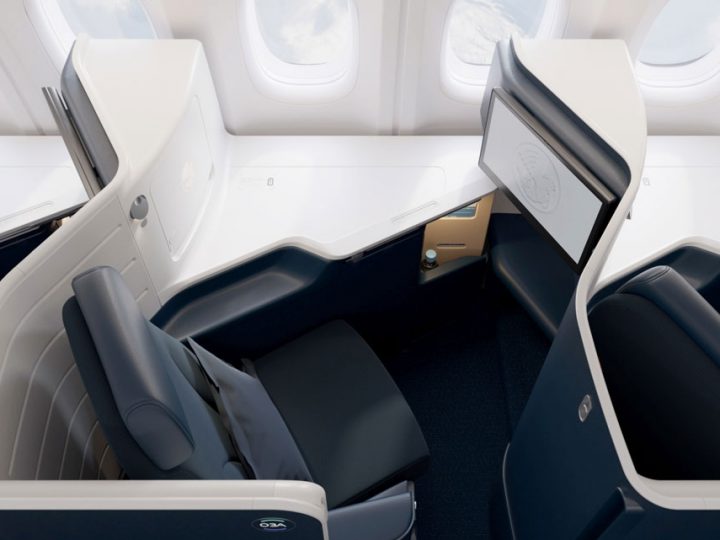
Immanuel Debeer | 09/06/2024
Buy Air France Flying Blue Miles With 70% Bonus
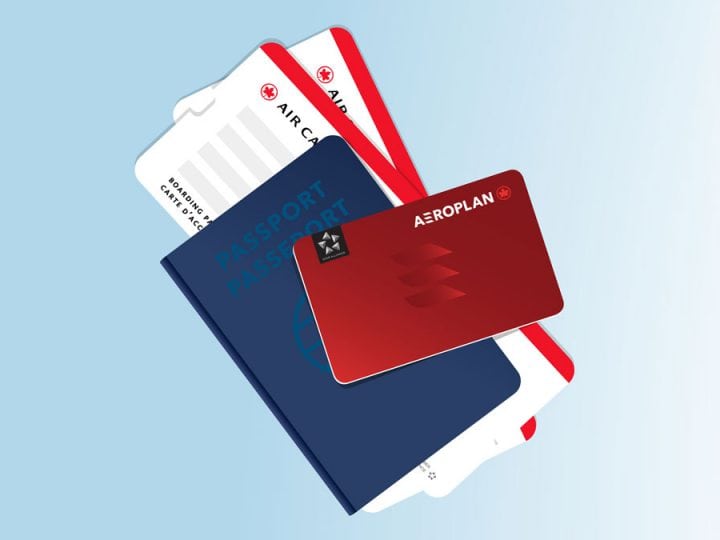
Tom Goward | 07/06/2024
100% Bonus When You Buy Air Canada Aeroplan Points [June 2024]
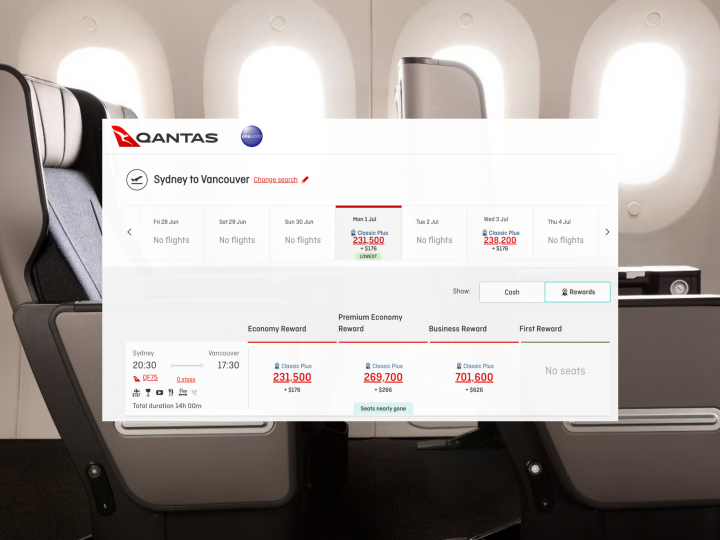
Tom Goward | 21/05/2024
Ultimate Guide To Qantas Classic Plus Rewards
- Join CHOICE
Travel money cards with the lowest fees
We look at seven travel money cards from the big banks and airlines..
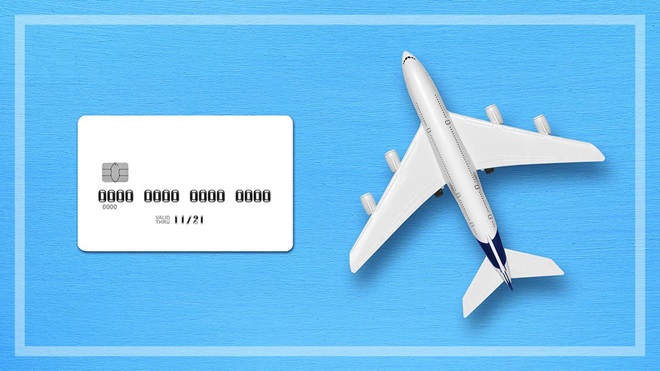
Prepaid travel money cards are offered by major banks, airlines and foreign exchange retailers like Travelex. Before travelling overseas, you load money into the card account, which locks in the exchange rate for foreign currencies at that time.
You can then use the card for purchases and cash withdrawals just like a debit or credit card, usually wherever Visa and Mastercard are accepted.
You can reload money on-the-go via an app or website, and if the card is lost or stolen, it can be replaced (usually at no cost to you).
Prepaid travel money cards also give you assurance that you're not handing the details of your everyday banking account to merchants you're not familiar with, and they provide easy access to cash when you want some, says Peter Marshall, head of research at money comparison website Mozo .
CHOICE tip: Travel money cards are best for longer trips. They're usually not worth your while if you're only taking a short trip, as some have closure, cash out and inactivity fees.
Travel money card fees
A major difference between prepaid travel cards and debit or credit cards is their fees. Some costs aren't immediately apparent, such as hefty margins built into the exchange rates.
And although fees have come down since we looked at these cards two years ago, you still need to watch out for:
- fees to load the card – either a percentage of the total or a flat fee
- ATM withdrawal fees
- a cross currency fee or margin when you use the card in a currency you haven't preloaded
- further fees if you close the account or haven't used the card for a period of time.
Travel money card with the lowest fees and best exchange rate
Westpac worldwide wallet.
Westpac closed its Global Currency Card in July 2021 and offers its new card in partnership with Mastercard. It's also available from Bank of Melbourne and BankSA.
Currencies: AUD, USD, NZD, EUR, GBP, SGD, THB, JPY, HKD, CAD, ZAR.
Key features:
- No loading, reloading, closing or inactivity fees.
- Free to use it in network ATMs in Australia and partner ATMs overseas in a range of countries including the UK, US and New Zealand.
- A charge applies at non-Westpac and non-partner ATMs in Australia and overseas.
- Best exchange rates for the US dollar, the Euro and GBP in our comparison.*
- The only card that lets you preload the South African rand.
Other travel money cards
Next to the Westpac Worldwide Wallet, there are six other travel money cards available.
Australia Post Travel Platinum Mastercard
Available online or at post offices.
Currencies : AUD, USD, NZD, EUR, GBP, SGD, THB, JPY, HKD, CAD, AED.
- Fee to reload the card via BPay, debit card or instore, but free via online bank transfer.
- Closure fee.
- Fees for ATM withdrawals in Australia and overseas.
Cash Passport Platinum Mastercard
It's issued by Heritage Bank and is available online and from a number of smaller banks and credit unions (like Bendigo Bank and Bank of Queensland) as well as travel agents.
- Fee to reload with a debit card or instore, but free via BPay.
CommBank Travel Money Card
CommBank Travel Money Card (Visa)
As NAB and ANZ have closed their travel money cards, this is the only other travel money card available from a major bank. This card has the largest variety of currencies that can be preloaded.
Currencies : AUD, USD, NZD, EUR, GBP, SGD, THB, JPY, HKD, CAD, AED, VND, CNY.
- Fee if you make a purchase with currencies not preloaded.
- Fee for withdrawals at overseas ATMs.
Qantas Travel Money Card
Qantas Travel Money Card (Mastercard)
The only travel money card offering from an airline. It can be added as a feature to your Qantas Frequent Flyer card, so you don't need a dedicated card, and you can earn points using it.
- Free to reload via bank transfer or BPay, but there's a reload fee if using debit card.
Travelex Money Card
Travelex Money Card (Mastercard)
Travelex is an international foreign exchange retailer. In Australia, it operates more than 140 stores at major airports and shopping centres, across CBDs and in the suburbs. It was the card with the best exchange rate for New Zealand dollars.*
Currencies : AUD, USD, NZD, EUR, GBP, SGD, THB, JPY, HKD, CAD.
Fees :
- Load fee instore, but free via Travelex website or app.
- Reload fee instore or via BPay, but free via Travelex website or app.
- Closure fee and monthly inactivity fee (if not used for 12 months).
Travel Money Oz Currency Pass
Travel Money Oz Currency Pass (Mastercard)
The Travel Money Group is owned by Flight Centre and is a foreign exchange retailer.
- Reloading the card via an online bank transfer or instore is free, but there's a fee if you reload via BPay, debit card or credit card.
- Cash out (closure) fee.
Travel money card tips
- Make sure the card allows the currencies you'll need, and also consider stopovers. For example, the South African rand is only supported by the Westpac card.
- Try to load your card with the right currencies and amounts on days with good exchange rates.
- Make sure you know how to reload your card if you run out of funds while overseas.
- It may be more convenient to choose a card that has an app that can be linked to your bank account.
- Avoid loading more money than you'll need as there may be fees and exchange rate margins to get the unused money back.
- Remember to cancel the card once you're finished your trip, especially if it has inactivity fees.
- Be mindful that you still may need a credit card, as travel money cards may not be accepted as security for hotels and car rental agencies.
Stock images: Getty, unless otherwise stated.
Join the conversation
To share your thoughts or ask a question, visit the CHOICE Community forum.
NAB credit card complimentary travel insurance
Got a nab credit card with complimentary travel insurance here’s the lowdown on what’s covered and how to make a claim..
In this guide
Which NAB credit cards have complimentary travel insurance?
How to get cover with nab credit card international travel insurance, what's covered by nab complimentary international travel insurance, what's not covered, pre-existing medical conditions, how to make a claim through your nab credit card complimentary international travel insurance policy, other types of nab complimentary credit card travel insurance, nab credit card complimentary insurance for shopping, nab business credit card complimentary insurance options, frequently asked questions, what you need to know:.
- NAB credit cards with complimentary international travel insurance offer comprehensive cover for up to 3 months with a Level 2 card and up to 6 months with a Level 1 card.
- You'll get cover when you meet the requirements before travelling (e.g. by paying for your trip with the card).
- Your spouse and dependants travelling with you can also get cover, but there are some requirements and exclusions .
- Do you have a question or need to make a claim right now? Call the insurance provider, Allianz Global Assistance, on 1800 187 025 (from Australia) or +61 7 3305 8800 (from overseas).
- Use your NAB credit card to pay for at least $500 of overseas travel costs before you leave Australia (e.g. your overseas airfare or accommodation bookings).
- Have a return ticket to Australia before the start of your trip.
- Permanently live in Australia or have a visa that entitles you to residency under the Migration Act (1958).
- Be under 81 years of age at the time you meet the rest of these requirements.
- Make sure your trip is for 3 consecutive months or less with a Level 2 Card (e.g. NAB Rewards Platinum) or up to 6 consecutive months with a Level 1 Card (e.g. NAB Qantas Signature). Trips over these length requirements won't be covered by this policy.
When you meet all of these requirements, cover is automatically available to you and eligible family members travelling with you (when they also meet the requirements).
Need written confirmation of cover? Use the “Check eligibility” tool online or call Allianz on 1800 187 025 for more details.
Here, we've broken down the key options for different types of claims and situations. But remember: you should always read the insurance policy booklet for complete details of the cover.
Medical, dental and emergencies cover with a NAB credit card
Example of when you might use this cover on an overseas trip.
If you got sick overseas and had to go to hospital for a few days, you could get cover for costs related to:
- Doctor's fees
- Hospital fees
- Changes in your travel plans
Just keep in mind that each travel claim is subject to an assessment and there may be excess payments if you're eligible for a payout.
NAB complimentary international travel insurance for cancellation, delays, accommodation and transport
⚠️ Keep in mind: Cancellations and other changes to your travel plans are only covered under specific circumstances. For example, if you missed a flight because you needed urgent medical treatment for a covered health issue.
Luggage and personal items cover offered with NAB credit card complimentary insurance
Hijacking, personal liability, death and other cover offered with nab complimentary credit card travel insurance.
Claims under these benefits are less common and usually only apply in extreme circumstances. None of them have an excess payment but we have listed their claim limits.
- Hijacking: Up to $10,000 per cardholder or spouse
- Emergency accommodation due to terrorism: Up to $300 per day and a maximum of $3,000 per cardholder or spouse
- Personal liability: Up to $2.5 million for Level 1 cards and up to 1 million for Level 2 cards
- Legal expenses: Up to $15,000 per cardholder or spouse
- Accidental death: $50,000 per cardholder or spouse, up to $25,000 per dependant and a maximum total of up to $150,000.
- Funeral expenses: Up to $60,000 for a cardholder or spouse
Note: Unless a specific limit is listed for dependants, any claims related to them will come out of the limit for the cardholder and/or their spouse.
Some of the key things you won’t be covered for with NAB credit card complimentary international travel insurance include:
- If you don’t follow advice from any government, official body or mass media announcements
- Issues related to drinking alcohol or taking non-prescription drugs
- Travel that’s for the purpose of medical treatment
- If you or your partner give birth during the trip, or there are complications arising after week 26 of the pregnancy
- Dangerous activities including rock climbing (with equipment), white water rafting, bungy jumping, off-piste snowboarding or skiing and quad or motorbike riding if the engine has a capacity of 200cc or more
Does NAB complimentary credit card travel insurance cover COVID?
Yes, if you are diagnosed with COVID-19 or another epidemic/pandemic illness, this insurance offers cover for claims relating to:
- Overseas emergency assistance
- Overseas emergency medical
- Cancellation
- Additional expenses
If you're travelling with someone who tests positive for COVID-19, some cover is also available under the cancellation and additional expenses benefits.
⚠️ Remember: Check the NAB credit card insurance policy booklet or call Allianz on 1800 187 025 for more details about COVID-19 claims and any exclusions.
Does NAB credit card travel insurance cover family members?
Yes, your spouse and dependants (i.e. your children) can also get cover when they are travelling with you for at least 50% of your trip. They also need to meet the same travel booking requirements and other conditions of the insurance policy. Check the policy document for full details.
This travel insurance doesn’t automatically offer cover for any pre-existing conditions. But you can apply for an assessment of your pre-existing condition/s by calling Allianz Global Assistance on 1800 187 025.
If you are eligible, you will get written confirmation from Allianz that a pre-existing medical condition is covered. A $75 administration fee applies as part of this process.
What if I don’t apply or get approval for a pre-existing condition?
You won't get cover for any claims related to the pre-existing condition/s. This includes conditions that you've had professional treatment for and untreated conditions you're aware of before you travel.
Got a pre-existing health condition? Compare other travel insurance policies that offer cover for conditions including anxiety, high blood pressure and knee replacement.
If it's an emergency, call Allianz on +617 3305 8800 when you're overseas or 1800 010 075 in Australia. You can also submit a claim online by following these steps:
- Go to the online claims portal at https://claimmanager.com.au/nab/agreement
- Confirm you agree with the terms and conditions, then select "Create new claim"
- Select the "Credit card insurance" option and provide details of your card
- Fill in the details on the claim form and upload your supporting documentation
You will be contacted about your claim within 10 business days, according to the online claims website.
What to include in your claim
With insurance claims, include as many details as you can. This makes it easier for the insurer to look at the claim and your eligibility for a payout. Some examples include:
- A referral or letter from a doctor or other professional you see in relation to a claim
- Photo evidence
- Police reports
Tip: Use a travel wallet or create an online folder to keep all your important documents together. This could include your passport, itinerary, printed tickets, a copy of the NAB card insurance policy booklet – plus anything that could become supporting documentation for claims.
Domestic travel insurance
- What is it? Cover for specific issues that come up when you're travelling to a different state or territory in Australia. This includes:
- Cancellation: Up to a maximum of $3,000.
- Flight delay expenses: After 4 hours or more, $125 per person up to a maximum of $300.
- Additional expenses: Up to $3,000.
- Luggage: Up to $750 per covered item with a maximum of $2,000.
- Luggage delay: After a delay of 12 hours or more, $150 per person up to a maximum of $400 for all claims combined.
- When can I use it? If you have paid for your return domestic flight with your eligible NAB credit card before you leave. Or, if you have a return domestic flight and have paid for at least $250 domestic travel costs with your NAB credit card before you leave (such as accommodation).
- Is there an excess cost? There is a $75 excess for cancellation, additional expenses and luggage claims.
Rental vehicle excess in Australia insurance
- What is it? Cover for damage or theft of a car or other vehicle you have hired in Australia, up to a maximum of $5,000 for Level 2 cards and a maximum of $10,000 for Level 1 cards.
- When can I use it? If you’ve used your NAB credit card to pay the full cost of the vehicle rental. The rental contract also needs to specify an amount that you would need to pay if the vehicle is damaged or stolen while you have it.
- Is there an excess cost? $100 per claim.
How to make a claim under one of these policies
You can also get access to other types of insurance for items you buy with an eligible NAB credit card. Here's a basic explainer of each one:
- Purchase protection insurance: Offers cover for up to 90 days when you buy a new item with your eligible card and it's then stolen, accidentally damaged or lost. It covers household and personal items such as jewellery, watches, glasses and new works of art. There is no excess but specific claim limits may apply.
- Extended warranty insurance: Cover that doubles the manufacturer's warranty for items bought in Australia, up to a maximum period of 12 months.
Don’t have complimentary insurance on your credit card yet? Compare NAB credit cards or other cards that offer insurance .
NAB business credit cards offer complimentary unauthorised transaction insurance to help protect you if an additional cardholder uses the account for something that's not allowed.
Some NAB business credit cards also offer complimentary transit accident insurance. These are your options with different NAB business cards:
Can I get proof of my cover?
Yes. If you're going on a cruise or tour that requires proof of insurance, you can get a letter of eligibility online at www.checkyourcover.com.au/nab
How do I get cover with a NAB Platinum Visa Debit Card?
The NAB Platinum Visa Debit Card is classified as a Level 2 card, giving you access to complimentary insurace options including international travel insurance. If you have met the eligibility requirements, you can make a claim online at https://travel.agaassistance.com.au/nab/make-a-claim or by calling Allianz on +617 3305 8800 from overseas or 1800 010 075.

Amy Bradney-George
Amy Bradney-George was the senior writer for credit cards at Finder, and editorial lead for Finder Green. She has over 16 years of editorial experience and has been featured in publications including ABC News, Money Magazine and The Sydney Morning Herald. See full profile
More guides on Finder
The NAB Rewards Platinum offers up to 80,000 bonus NAB Rewards Points, a reduced first-year annual fee and other perks.
This offer on the NAB Low Rate Card gives you a way to get $300 cashback as a new cardholder. Is it right for you?
The NAB Rewards Business Signature lets you earn points as you manage your business expenses and offers exclusive business travel and retail deals from Visa.
Offers up to 180,000 bonus NAB Rewards Points, premium perks and $0 international transaction fees.
With up to 100,000 bonus NAB Rewards Points, a reduced first-year annual fee and perks, is this NAB card right for you?
The NAB Business Card offers additional cardholders with individual credit limits, up to 35 interest-free days on business purchases and liability insurance.
The NAB Low Rate Business credit card offers cards for employees and low-cost features, including 0% p.a. on purchases for the first 12 months.
The NAB Low Rate credit card offers cost-saving features, including a 0% balance transfer for 28 months and $0 annual fee for the first year.
You can use the NAB Low Fee Platinum Card to consolidate your debts and reduce your interest costs with a balance transfer offer.
The NAB Low Fee Card offers up to 44 interest-free days on purchases, a competitive annual fee and a low minimum credit limit.
How likely would you be to recommend Finder to a friend or colleague?
Our goal is to create the best possible product, and your thoughts, ideas and suggestions play a major role in helping us identify opportunities to improve.
Important information about this website
Advertiser disclosure.
finder.com.au is one of Australia's leading comparison websites. We are committed to our readers and stands by our editorial principles
We try to take an open and transparent approach and provide a broad-based comparison service. However, you should be aware that while we are an independently owned service, our comparison service does not include all providers or all products available in the market.
Some product issuers may provide products or offer services through multiple brands, associated companies or different labeling arrangements. This can make it difficult for consumers to compare alternatives or identify the companies behind the products. However, we aim to provide information to enable consumers to understand these issues.
How we make money
We make money by featuring products on our site. Compensation received from the providers featured on our site can influence which products we write about as well as where and how products appear on our page, but the order or placement of these products does not influence our assessment or opinions of them, nor is it an endorsement or recommendation for them.
Products marked as 'Top Pick', 'Promoted' or 'Advertisement' are prominently displayed either as a result of a commercial advertising arrangement or to highlight a particular product, provider or feature. Finder may receive remuneration from the Provider if you click on the related link, purchase or enquire about the product. Finder's decision to show a 'promoted' product is neither a recommendation that the product is appropriate for you nor an indication that the product is the best in its category. We encourage you to use the tools and information we provide to compare your options.
Where our site links to particular products or displays 'Go to site' buttons, we may receive a commission, referral fee or payment when you click on those buttons or apply for a product. You can learn more about how we make money .
Sorting and Ranking Products
When products are grouped in a table or list, the order in which they are initially sorted may be influenced by a range of factors including price, fees and discounts; commercial partnerships; product features; and brand popularity. We provide tools so you can sort and filter these lists to highlight features that matter to you.
Terms of Service and Privacy Policy
Please read our website terms of use and privacy policy for more information about our services and our approach to privacy.
We update our data regularly, but information can change between updates. Confirm details with the provider you're interested in before making a decision.
Learn how we maintain accuracy on our site.
- Travel Advice
Travel money cards were ranked in order of highest value of USD/ euros after fees and conversions
HERE’S a list of the Top 10 best travel money cards to use when holidaying in the United States and Europe, revealing the least withdrawal fees.

‘Six times’: Bad news if you’re going to Japan
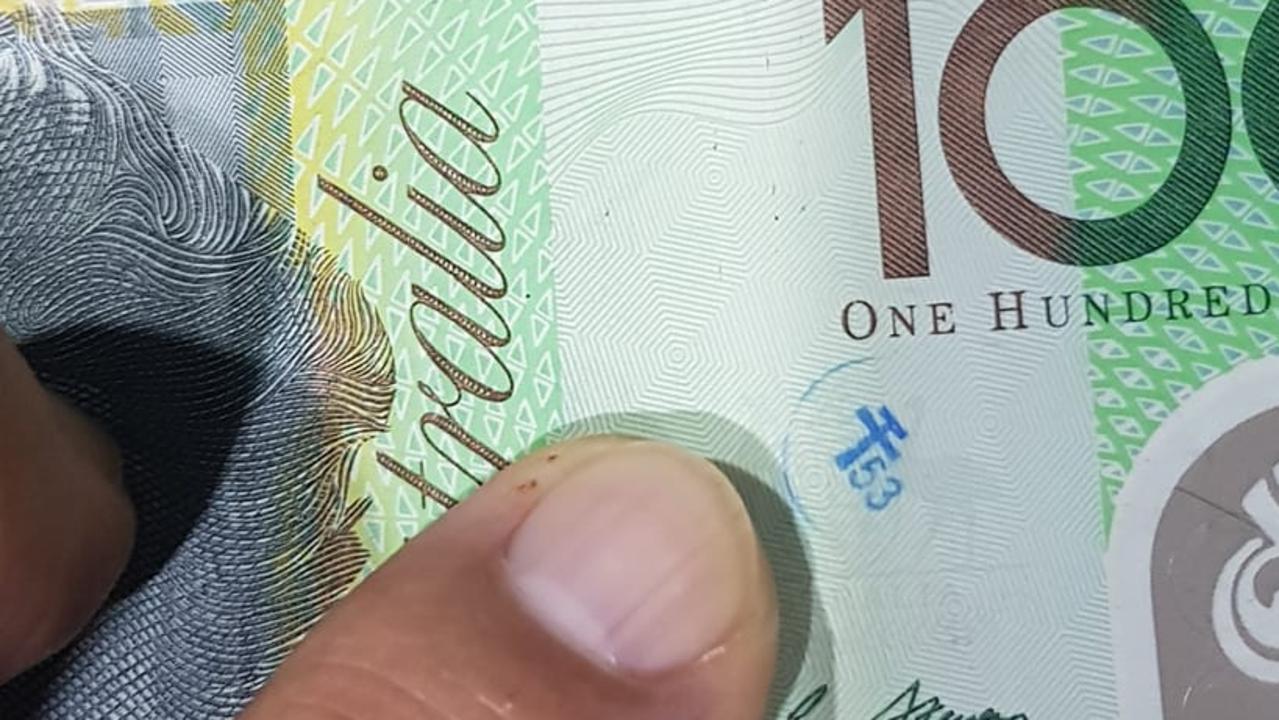
Tiny detail makes $100 note ‘worthless’

Emirates staff cash in on wild paycheck
WHEN it comes to travelling there’s lots to tick off the “to-do” list and more often than not, travel money cards become an afterthought.
But don’t be lazy, that’s the advice from comparative site finder.com.au ’s money expert Bessie Hassan, who says by settling for your standard credit or debit card it can leave you with plenty of unsuspecting fees .
“Taking your everyday credit or debit card on holiday instead of getting a travel money card will mean you’ll be charged on average 3 per cent per transaction,” Ms Hassan said. “That’s a lot in fees so don’t be lazy or leave it to the last minute.”
Most people will turn to their avid travelling mate for advice on which banks provide the best travel cards and according to the site that’s Travelex Money Card and ANZ Travel Card.
The Best Travel Money Card analysis also revealed that NAB’s Traveller Card was the only one not to have any fees, but it ranked fifth for not offering as much as the others when converting $10,000 to US dollars and euros.
Unfortunately for some travellers, it’s not until they check out of that luxurious hotel on the Amalfi Coast or go on that major shopping spree in Hawaii, when they realise their everyday card has clocked a bunch of fees.
Ms Hassan said prepaid travel money cards are often a better alternative than taking your standard card as you can load it with different currencies at a locked-in exchange rate.
“Often, you can load up to 10 different currencies on the card and they typically come with fewer fees, such as $0 foreign currency conversion fees,” she said.
“Travel money cards protect you from exchange rate fluctuations while you’re travelling, and they also help you better stick to your budget.”

TRAVELLING TO AMERICA
Based on the lowest withdrawal fees, reload fees and initial load fees, the best travel money card is Travelex, according to the finder.com.au.
It topped its Best Travel Money Card survey for having no ATM fees when it comes to withdrawing money and gives you the most when converting $AU10,000 to US dollars at $7140.
While the NAB Traveller Card was the only one out of the 10 to not have any withdrawal, reload or initial loading fees, it gives you $US7,066 when converting it from $10,000 (that’s $US74 less than Travelex) — ranking it as fifth on the list.
ANZ Travel Card came in second, followed by CBA and Suncorp.
All three slapped customers with a $AU3.50 withdrawal fee but gave the most US dollars when converting $AU10,000.
Westpac Global Currency Card had a $AU2.00 withdrawal fee and Qantas came second, behind Tavelex and NAB for having the least overall fees, but respectively came sixth and seventh on the list when it came to converting it to $US10,000.
Travel Money Oz had a $AU3.50 withdrawal fee and the highest reload fee at 1.10 per cent.
Finder.com.au assessed the travel money cards based on fees and conversion rates then ranked them in order of the highest value of US dollars after fees and conversions.
TRAVELLING TO EUROPE
Based on the lowest withdrawal fees, reload fees and initial load fees, the best travel money card is the ANZ Travel Card, according to finder.com.au.
Please note, the ranking in the euro table is different when compared to the USD table due to the conversion rate.
Again, NAB Traveller Card was the only one out of the 10 with no fees.
It only ranked fifth for giving €95 less than ANZ’s card when converting it euros (€6,047 compared to ANZ’s €6,142).
In second spot was Travelex Money Card which also had no additional fees, except a 1 per cent reload fee.
Suncorp Cash Passport Platinum and CBA Travel Money Card both have $3.50 ATM withdrawal fees but no reload or initial load fees, ranking them in third and fourth place.
Westpac Global Currency Card and Qantas Cash followed Travelex and NAB for having the lows withdrawal fees at $2.00 and $1.95 respectively, but their overall currency conversion offered less than those who had the higher withdrawal fees.
Travel Money Oz had the most all-round fees, offering just €5,988 when converting $10,000, compared to ANZ at €6,142.
But it was AusPost Cash Passport that ranked 10 for its $AU3.50 withdrawal fee combined with its currency conversion of €5,951 which was €191 less than ANZ.
Finder.com.au accessed the travel money cards based on fees and conversion rates then ranked them in order of the highest value of euros after fees and conversions.
TOP TIPS — finder.com.au
- The right travel money card depends on your personal situation, including your destination, the length of your trip, and the features you value most.
- Opt for a travel money card with $0 conversion or ATM withdrawal fees, and one that supports the currencies you’ll need.
- Be cautious of fees including initial load fees and inactivity fees that may apply to ensure you get the most cost-effective product.
- If you choose a card with an inactivity fee, make sure to take any remaining funds off your card when you get home as fees can result in your money dripping away unnoticed.
BIGGEST MISTAKES — finder.com.au
- Taking your everyday credit or debit card on holiday instead of getting a travel money card will mean you’ll be charged on average 3 per cent per transaction.
- Withdrawing too little from the ATM — having to find an ATM when you’re travelling is not only annoying when but will add up if your bank charges international ATM fees.
- Not all travel cards give you the same exchange rates, and while only 1c seems small, it can add up substantially if you’re converting thousands of dollars so don’t forget to compare the exchange rates between providers.
- Using a card with foreign transaction fees — by using a card with no international transaction fees you’ll save on ATM fees. Depending on where you’re travelling to, it may also be safer and more convenient than having to carry cash.
THE MAIN FEES TO LOOK OUT FOR — finder.com.au
- Initial load fee: Depending on the card, you might be charged a fee (such as a percentage of the loading amount) when you first load funds on the card.
- Reload fees: If the card doesn’t charge an initial load fee, it may charge another fee each time you load funds on the card. If this is the case, you might want to reconsider how often you reload the card.
- ATM withdrawal fees: Some cards will charge a different ATM withdrawal fee depending on where you’re withdrawing your cash. If the bank provider belongs to an ATM alliance, you might be able to avoid ATM withdrawal fees from the issuer. It’s important to note that local ATM fees may still apply.
- Inactivity fee: An inactivity fee is charged if you don’t use the card (usually after 12 months) and there’s money remaining on the account.
- Currency conversion fees: Charged when you make a purchase overseas.
Japan is experiencing an influx of tourists and it’s now considering a move that will cost Aussies “six times more” if it goes ahead.
Australian travellers are being warned to only take their most pristine notes to be exchanged in Asia.
Emirates has revealed it made a record profit $7.6 billion - and as a thank you, it will award staff with a hefty bonus.
- Argentina
- Australia
- Brasil
- Česko
- Canada
- Deutschland
- España
- France
- India
- Italia
- Magyarország
- Malaysia
- Nederland
- New Zealand
- Österreich
- Polska
- Portugal
- România
- Schweiz
- Singapore
- United Kingdom
- United States
- 繁體中文 (香港)
- 简体中文 (中国)
The 6 Best Prepaid Travel Cards for Australians 2024
Here is a list of the 6 best prepaid cards you can take with you on your travels and the positives and negatives for each one:
- Wise - our pick for prepaid cards
Revolut - low fees
- Citibank - good for use at home
- Travelex - no fees for ATM withdrawals
- Australia Post - lock in exchange rates
HSBC - no international transaction fees
Prepaid travel money cards let you load money - either in AUD or the foreign currency you need - in advance, which you can then use as you travel , for spending and withdrawals. Lots of cards let you top up and manage your account through an app, which means you can always keep up with your money, even when you’re away from home.
Picking the right prepaid card can mean you get more convenient ways to spend and withdraw when you’re abroad - and lower overall costs, too. Let’s look at some of the best prepaid travel cards for Australians , so you can pick your perfect match:
Wise - our pick for prepaid travel card
- Top up for free in AUD using PayID or bank transfer
- No annual fee, hidden transaction fees or exchange rate markups
- No minimum balance requirements
- Allows you to make payments and withdrawals wherever you are in the world in over 40 currencies
- Local bank account details in Australia (AUD), the UK (GBP), the USA (USD), Europe (EUR), Canada (CAD) and New Zealand (NZD)
- Available in the US, UK, Europe, Australia, Singapore, Japan and New Zealand
Find out more about the Wise card .
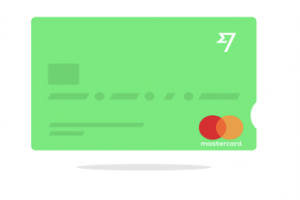
With this card:
- It's very easy to set up and order
- Available as a virtual card
- You can receive foreign currency into a multi-currency account linked to the card
- Pay with your Wise card in most places overseas where debit cards are accepted
- You can transfer money to a bank account overseas
It's not all good news though
- There is a 2% ATM withdrawal fee when you withdraw over $350 during a month
- It takes 7-14 days for delivery
Go to Wise or read our review .
- No hidden fees or exchange rate mark-ups (except on weekends)
- Very easy to use app
- Free to set up account and top up
- You can use it to transfer money to a bank account overseas
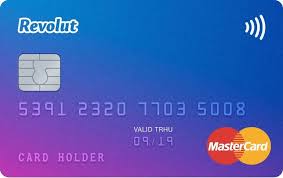
Read the full review
- No purchase fee, load fee, reload fee, exchange rate margin or minimum balance requirements
- Unlike other Travel Cards, its free and easy to use the balance of your currency or convert it back to AUD
- The exchange rates are unbeatable. They use the same rate you see on XE or Google with no hidden mark-up
- For the free Standard account, there is a 2% ATM withdrawal fee when you withdraw over $350 during a month
- The premium account costs $10.99 a month, which can really add up if you are not using it often
- Additional fees for using the card on a weekend
- 2% ATM fee once you withdraw more than $350 in any 30 day period
- 3-4 business days before you receive your card
Click here to see the full list of cards and how Revolut compares
Australia Post Prepaid Travel card - lock in exchange rates
- Load up to 11 different major world currencies
- Spend and withdraw easily around the world
- Get access to extras like free wifi when you travel
- Manage your card in online and via an app
- Transfer instantly to another Travel Platinum Mastercard
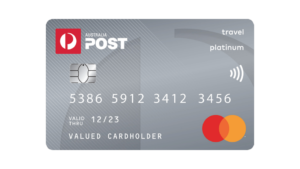
- Load up to 11 different currencies for easy spending and withdrawals
- Lock in exchange rates so you know what your travel money budget is in advance
- Get extra perks like free wifi when you load 100 AUD or more
- Get fraud protections from Mastercard
- 3.5 AUD international ATM fee, or 2.95% domestic ATM fee
- Exchange rates to add money in a foreign currency or spend a currency you don’t hold are likely to include a markup
- Some fees apply depending on how you top up your account
Travelex - no fees for international ATM withdrawals
- Load up to 10 major currencies at a time
- Spend and withdraw anywhere Mastercard is accepted
- Contactless payments so you can just tap and go
- No Travelex fees for international ATM withdrawals
- Free to spend currencies you hold in your account
- Order online and have it delivered to your home - or collect in store
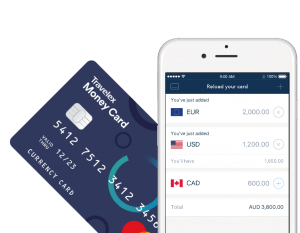
- Top up and hold up to 10 currencies at a time
- View and manage your account online
- Spend online and in person, and make withdrawals as you travel
- No membership or account fees to pay
- Get exclusive Mastercard discounts and perks
- Inactivity fees apply if you don’t use the card for a year
- Not all major currencies are supported for holding - double check they have the currency or currencies you need
Go to Travelex or read our review .
Citibank Saver Plus - best for use at home
- No international ATM or transaction fees
- Fee-free international money transfers to any account worldwide
- SMS notifications through Citi Alert
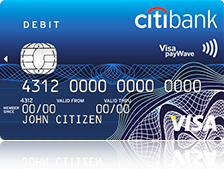
With this card you can:
- withdraw money for free at over 3000 ATMs Australia-wide and overseas
- take advantage of no foreign transaction fees, monthly fees, or minimum opening balance
- transfer money to friends and family anywhere in the world for free
- Cash deposits available within 24-48 hours
- Can’t have two cards active at the same time
- $5 account closure
- Hold and exchange 10 currencies: AUD, USD, GBP, EUR, HKD, CAD, JPY, NZD, SGD, and CNY
- No account opening or annual fees to pay
- No foreign transaction fee and no HSBC ATM fee at home or abroad
- Some cashback earning opportunity on local spending
- Easy online overseas transfers - 8 AUD fee and exchange rate markups apply
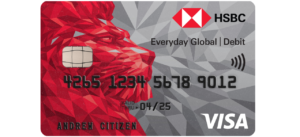
- Hold and exchange 10 currencies
- No account opening fee, no ongoing fees
- Get up to 2% cashback on eligible card spend
- No HSBC ATM fee
- No international transaction fee
- 8 AUD fee for sending money overseas
- Cashback on low value transactions made in Australia only
- Limits apply on how you can use CNY within your account
Read our HSBC Everyday Global Account review .
What are Prepaid Travel Cards?
Prepaid travel cards are a good international card alternatives to carrying cash. They look like credit or debit cards, but they function differently.
You're able to load the card with a set amount of money in the currency you need and can use it to make purchases online, in stores and to withdraw money at ATMs.
Most travel cards allow for multiple currencies to be loaded onto the card. So it's important to know what currency you'll be using on your travels. Airlines also offer prepaid cards so the money you spend can earn you reward points.
Find out how our 5 best prepaid travel cards for Australians compare in our best and worst travel cards article .
Looking for something different?
Read our guides on:
- The best travel debit cards
- The best travel cards for Europe
- The Wise debit card review
- Best virtual debit cards for Aussies

How does a prepaid travel card work?
Order a prepaid travel card online, through a provider app , or - in some cases - pick one up at a physical location or store. Generally to get your card you’ll need to show or upload some ID documents for verification - this is to keep your account safe and is a legal requirement.
Once you have your card account open , you can load funds . Different cards have their own supported methods for topping up, which usually include bank transfer, PayID, credit and debit card, and which may also allow you to deposit cash in some cases. Once you have funds on your card, you can switch to the currency you need for overseas spending. In some cases you can also leave your funds in AUD and just allow the card to convert for you - but do check that no additional fees will apply in this case.
Prepaid travel cards can then be used to tap and pay , make withdrawals and shop online . You can often also add them to mobile wallets like Apple Pay for convenient spending. Because your card isn’t attached to your everyday account it’s secure, and you can only spend the funds you’ve loaded, which means there’s no chance of accidentally blowing your budget.
Advantages and disadvantages of prepaid cards
Prepaid cards can be a handy addition when you’re abroad, as they are secure and convenient to use for payments and withdrawals. However, they’re not the only option. If you’re not sure about whether a prepaid card is right for you, check out these advantages and disadvantages to help you decide:
Advantages:
- More convenient than carrying cash, with easy access to ATMs to withdraw when you need to
- Not linked to your primary day to day account, which can be more secure and make budgeting easier
- Some accounts let you buy currency in advance to lock in exchange rates when they’re good
- You may be able to access better exchange rates and lower fees compared to using a regular bank card
Disadvantages:
- Some prepaid cards have fairly high fees - including charges when you add money to the account. Read more on how to find the best travel cards with no foreign transaction fees
- Not all prepaid cards support a broad range of currencies - check the currencies you need are covered
- Prepaid cards aren’t always accepted for things like paying security deposits - so it’s safest to have a credit card as well
Who is a prepaid debit card for?
A prepaid debit card is handy for many different customer needs. For example, you may choose a prepaid debit card in the following situations:
- You’re planning travel and want to set your budget in advance with no chance of accidentally overspending
- You want to be able to hold and exchange a selection of foreign currencies all in the same account
- You want to increase security by using a payment card that’s not linked to your main everyday account when you travel
- Some cards also offer other perks like ways to receive foreign currency payments conveniently, or cashback
How can I get a prepaid travel card?
Different prepaid cards have their own order and activation processes. However, to comply with local and international law, providers will usually need to see some ID before you’re able to get a card - this verification step may be available online by uploading images of your paperwork, or in person by visiting a branch.
Here’s an outline of the basic steps you’ll take to get a prepaid travel card:
- Pick the right card for your needs
- Visit the provider’s website or app - or call into a branch if you’d prefer a face to face service
- Complete a travel card order from, which will include your personal information
- Get verified - usually this involves showing or uploading ID like a passport or driving licence
- Add money to your card, which could be in cash, with a bank card, or by bank transfer
- You can now get your card, and manage your account online or in the app
If you’re ordering a card in person you’ll be able to start using it right away. If you’ve ordered online for delivery, you’ll need to wait a few days, to a couple of weeks, depending on the provider you’ve picked, for your card to be available. You might be able to access virtual card details in the meantime, to start spending right away.
How to choose a prepaid debit card
There are many different prepaid debit cards on the Australian market - so picking the best one for you will require a bit of research. Starting with this guide, compare a few different prepaid debit cards based on features and fees. Here are a few pointers to think about:
- Make sure you know about any opening or card delivery fee which will apply once you order your card
- Check how long it’ll take to get your card if you’re ordering online for home delivery
- Make sure the card you pick can hold a broad selection of currencies, so you can use it for more than one trip away
- Check the fees for adding funds, making ATM withdrawals and converting currencies
- Look to see if there are any account close, cash out or dormancy fees that apply once you stop using the card
- Make sure the card is well rated by other users, and from a trustworthy provider
Where can I get a prepaid debit card?
Generally you can order your prepaid debit card online or by downloading your preferred provider’s app. Some cards, like the Auspost card, can also be collected in physical branch locations.
FAQ - 6 Best Prepaid Travel Cards
Are prepaid cards free.
Prepaid cards may be free to order, or you may pay a small one time fee, depending on the provider and card you pick. Once you have your card you may also pay transaction fees such as exchange rate markups when you switch currencies, and ATM withdrawal charges. Read the card’s terms and conditions carefully so you’re aware of the costs involved.
What are the best prepaid debit cards for international travel?
There’s no single best prepaid debit card - it’ll come down to your personal preferences, where you’re travelling, and the type of transaction you need to make. Pick a prepaid card which is easy to use, which supports the currency you need, and which offers a good balance of low fees and good exchange rates.
What is the best reloadable prepaid card?
There’s no single best reloadable prepaid debit card. Use this guide to compare a few options to pick the one that’s right for you, thinking about features, fees and the range of supported currencies you’ll need.
Should I use a Mastercard or Visa for overseas?
Both Visa and Mastercard are very broadly accepted globally. It’s often a good idea to have a prepaid, debit or credit card on each of these networks, so you’ll always have a backup if for some reason one network isn’t available wherever in the world you are.

Are prepaid currency cards worth it?
Picking the right prepaid currency card can help you save money on currency exchange and access low fee international transaction services. You might also get extra perks like easy ways to lock in exchange rates in advance, so you can get a good deal and fix your travel budget before you go away.
Your currency knowledge centre

5 Best Debit Cards for Australians Travelling Overseas
Travel debit cards are a good alternative to carrying cash. They also offer the convenience of a credit card, but work differently. Here is a list of the 5 best travel debit cards you can take with you on your travels and the positives and negatives for each one.
- Read more ⟶
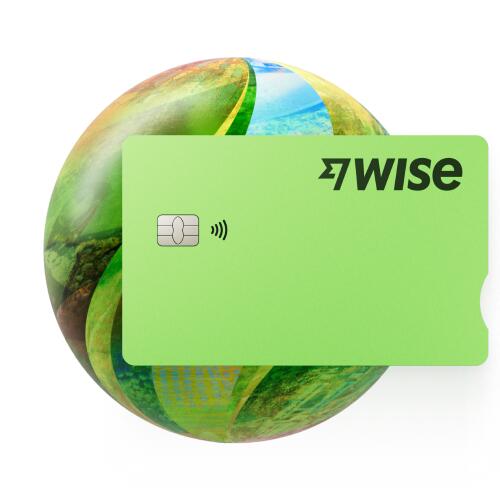
Wise Debit Card Review
The Wise Debit card give customers an easy way to spend their balances in multiple countries. With interbank rates and low fees, this product is available in Australia for both personal and business customers.

8 Travel Traps to Avoid If You're Heading to Europe
To help you avoid spending money unnecessarily, here are some pretty important travel money traps you want to avoid if you travel to Europe.
The journalists on the editorial team at Forbes Advisor Australia base their research and opinions on objective, independent information-gathering.
When covering investment and personal finance stories, we aim to inform our readers rather than recommend specific financial product or asset classes. While we may highlight certain positives of a financial product or asset class, there is no guarantee that readers will benefit from the product or investment approach and may, in fact, make a loss if they acquire the product or adopt the approach.
To the extent any recommendations or statements of opinion or fact made in a story may constitute financial advice, they constitute general information and not personal financial advice in any form. As such, any recommendations or statements do not take into account the financial circumstances, investment objectives, tax implications, or any specific requirements of readers.
Readers of our stories should not act on any recommendation without first taking appropriate steps to verify the information in the stories consulting their independent financial adviser in order to ascertain whether the recommendation (if any) is appropriate, having regard to their investment objectives, financial situation and particular needs. Providing access to our stories should not be construed as investment advice or a solicitation to buy or sell any security or product, or to engage in or refrain from engaging in any transaction by Forbes Advisor Australia. In comparing various financial products and services, we are unable to compare every provider in the market so our rankings do not constitute a comprehensive review of a particular sector. While we do go to great lengths to ensure our ranking criteria matches the concerns of consumers, we cannot guarantee that every relevant feature of a financial product will be reviewed. We make every effort to provide accurate and up-to-date information. However, Forbes Advisor Australia cannot guarantee the accuracy, completeness or timeliness of this website. Forbes Advisor Australia accepts no responsibility to update any person regarding any inaccuracy, omission or change in information in our stories or any other information made available to a person, nor any obligation to furnish the person with any further information.
Guide To NAB Bank Products
Updated: Mar 18, 2024, 12:40pm
Table of Contents
Nab bank accounts, nab credit cards, frequently asked questions (faqs).
NAB, or National Australia Bank, is one of the country’s big four banks in terms of market capitalisation and customers. Founded in 1981, NAB is said to have served more than nine million Austrtalians at the time of writing.
As one of the largest banks in the country, NAB has a wealth of producst: from personal loans to business credit cards, international banking and corporate specialist solutions.
For the purpose of this guide, Forbes Advisor Australia will solely focus on NAB’s personal banking capabilities.
The national bank offers Australians both standard transaction acconts, as well as ways to save money with interest-earning savings accounts and term deposits. The specifics of its personal banking offerings are outlined below.
Note that interest rates are subject to change at any time, and the interest rates specified for the products and services are accurate at the time of writing.
Related: A Guide To Bank Interest Rates
- NAB Classic Banking Account
The NAB Classic Banking Account is an everyday transaction account linked to a debit card, with NAB offering two debit card choices: the NAB Visa Debit Card and the NAB Platinum Visa Debit Card.
Regardless of which debit card you choose , NAB’s transaction account has $0 monthly account keeping fees; $0 transaction fees within Australia; and $0 withdrawal fees at over 4,000 ATMs across the country.
The difference between the two debit cards is that the Platinum option is more suitable for overseas spending as there is no international transaction fee on purchases abroad. There are also complimentary insurances included, such as travel insurance among others, and the opportunity to earn 1% cashback on contactless purchases.
The regular visa card does not cost anything, whereas, the Platinum option charges a monthly card fee of $10.
NAB Retirement Account
Targeted at retired Australians , this account helps retirees earn interest on every dollar in their balance. Just like the daily transaction account, the NAB Retirement Account does not charge monthly account-keeping fees, transaction fees or withdrawal fees inside Australia.
The interest rate you will earn on your account depends on the balance. These interest rate tiers are:
- $1 to $9,999: 0.15% p.a.
- $10,000 to $49,999: 1.50% p.a.
- $50,000 to $249,999: 2.00% p.a.
- $250,000 and over: 2.15% p.a.
Interest on the NAB Retirement Account is calculated daily and paid quarterly.
Those eligible for an account will also receive a visa debit card.
- NAB Reward Saver
The NAB Reward Saver is a type of bonus high interest saving account , offering account holders a high interest rate if they meet the monthly conditions of no withdrawals and at least one deposit, of any amount, within the calendar month.
Account holders will then receive the bonus interest rate of 4.65%. This is on top of the variable base rate, which is 0.35%. So, if you meet the conditions each month, you’ll receive a total interest rate of 5.00% on your account balance.
Should you not meet the conditions, you’ll only receive the base rate of 0.35%. The interest rates shown are for balances up to $49,999; for higher balances, a tiered interest rate applies.
For a savings account linked to your transaction account, customers would usually park their money with NAB iSaver. The card allows you to make regular withdrawals with your card and still earn interest.
The account is known as an ‘introductory offer’ savings account , as the high-interest lasts for only four months: the first four months is at a rate of 2% p.a. base variable rate and 3% p.a. fixed margin. This means the introductory interest rate is 5% p.a. for the first four months.
After the first four months, the base variable rate of 2% p.a. will apply.
No matter the time period, there is a $0 monthly account service fee and no minimum deposit required with the account.
- NAB Term Deposit
A term deposit is a method of earning interest over a certain period of time (known as the term) on funds that you’ve invested and do not touch.
At NAB, the length of term you can choose ranges from 30 days to five years. A 30-day term deposit has an interest rate of 1.25%, paid on maturity (the end of the term), while a five-year term deposit has an interest rate of 3.80%, paid out annually.
The highest interest rate one can receive with a NAB Term Deposit is by choosing a 12-month term, where you’ll earn 4.70% interest on your deposit at maturity, which is roughly the rate of inflation.
There are no account-keeping fees nor application fees with an NAB Term Deposit, however, there is a minimum deposit requirement of $5,000.
Related: Our Pick Of The Best Term Deposits In Australia
NAB Joint Accounts
You can open a joint account online via NAB for a:
For a joint NAB retirement account, you will need to visit an NAB branch in-person.
NAB specifies that for any joint account, you will have to open a new account in order for it to be joined—you can’t be added to someone else’s personal account to make a joint account.
Aside from the debit cards mentioned above that are linked to transaction accounts, NAB also offers a range of credit cards to its customers.
NAB offers Australians eight different choices when it comes to personal credit cards, ranging from reward cards to interest free credit cards .
The credit cards currently on offer from NAB are:
- NAB Rewards Platinum Card
- NAB Rewards Signature Card
- NAB Qantas Rewards Premium Card
- NAB Qantas Rewards Signature Card
- NAB Low Rate Card
- NAB Low Fee Card
- NAB Low Fee Platinum Card
- NAB StraightUp Card
Each credit card has different minimum credit limits, eligibility requirements, annual fees, interest rates and additional perks. To find the best credit card for you at NAB, you’ll need to consider your own financial situation and then decipher which one would suit you best.
NAB has a credit card selector tool to help you narrow down your choices, establishing what the card will be used for and your objectives. You can also use NAB’s online credit card comparison tool to differentiate between your options.
It should be noted that from April 18, 2024, NAB is making updates to its credit card offerings and their terms and conditions. This means the following conditions may not be applicable at the time of your application.
It’s also worth adding that even though NAB may make it easy for you to take out a credit card, it’s worth asking yourself whether you’re in a financial position to use it wisely and are able to pay it off in full each month and avoid the high interest rate, which is often around the 20% mark.
NAB offers both personal loans and home loans to its customers, which we discuss in greater detail below.
NAB Personal Loans
A personal loan allows you to borrow money to pay for a specific item or event (such as a car or your wedding day), or to consolidate your debts. You then must repay the money you’ve borrowed via the loan in installments, plus any interest or fees.
When taking out a personal loan with NAB, you won’t be charged any penalties when you make early repayments, no exit fees when you pay off your loan sooner and no late payment fees. Ultimately, there are no surprise fees to consider when taking out a NAB personal loan. Instead, you’ll pay $150 when you apply, and then $10 each month after that.
In terms of the amount you can lend, NAB offers personal loans ranging from $5000 to $55,000. You can also choose a loan term between one and seven years, with weekly, fortnightly or monthly repayment options.
The interest rate you will be required to pay back will depend on the size of your loan and your repayment capabilities; however, NAB says it falls between 6.99% p.a. to 21.33% p.a.
NAB offers home loans to Australians (also known as a mortgage ), whether for a home to live in or a residential investment property. The rates offered include a basic variable rate, a fixed interest rate or a combination of both.
The minimum repayment, terms and frequency of repayments will depend on your specific loan. You can find out what this may be with NAB by inputting your property value and other specifics into NAB’s loan calculator .
Related: Best Home Loan Interest Rates This Year
Is NAB Australia’s biggest bank?
No, NAB isn’t Australia’s biggest bank, but it’s not far behind. In our recent research on the big four , we found that banks delivered a record full-year profit of nearly $32.5 billion in FY2023, a 12.4% improvement over the previous financial year.
The Commonwealth Bank accounted for the largest share of this windfall at $10.2 billion, followed by NAB at $7.7 billion. Therefore, on profit, NAB was Australia’s second largest bank.
How do I contact NAB bank?
NAB’s customer service number is 13 22 65, or +61 3 8641 9083 for those calling from overseas. Customers can also contact NAB via its online chat, available 24/7, and via the NAB app.
Which NAB credit card is the best?
The best NAB credit card is going to be the credit card that suits your specific needs best: whether that’s one that offers frequent flyer rewards, a balance transfer, or no annual fee.
When Forbes Advisor Australia analysed the best credit cards on the market for Australians , our top contender was the NAB Straight Up Credit Card. This is due to its 0% interest rate and no fees on international purchases, making it a great choice for Australians looking for a no-hassle option.
- Best Personal Loans
- Best Car Loans
- Best Wedding Loans
- How to Get a Personal Loans in Australia
- What Is a Secured Loan
- How To Consolidate Your Debts Into One Loan
- OurMoneyMarket Review
- How To Get A Business Loan
- Bank Interest Rates
- Big Four Banks
- How To Set Up A Bank Account Online
- Judo Bank Guide
- Best Business Bank Accounts
- How To Open A Business Bank Account
More from
Judo banking products: a guide, our pick of the best business bank accounts for australians, how to set up a bank account online in australia, the big four banks: the complete guide, bank interest rates: a guide, revolut business review: pros and cons.
Sophie Venz is an experienced editor and features reporter, and has previously worked in the small business and start-up reporting space. Previously the Associate Editor of SmartCompany, Sophie has worked closely with finance experts and columnists around Australia and internationally.
Does NAB offer travel money cards?
See whether national australia bank offers travel cards.
NAB suspended offering travel cards in September 2022.
If you have additional questions, please call 13-22-65.
- Can I deposit cash in the ATMs of NAB?
- Can I withdraw money without a card from the ATMs of NAB?
- Does NAB cooperate with the RediATM network?
- Does NAB offer step-up loans?
- How can I replace my NAB card?
- How can I send money overseas in NAB?
- How do I close my NAB account
- How do I create a PayID?
- How do I deposit money in NAB ATMs?
All National Australia Bank FAQ
Author: Prostobank Consulting
Updated: 01.07.2024
Popular Banks in Australia
Commonwealth Bank of Australia
Westpac Bank
Australia and New Zealand (ANZ)
National Australia Bank
Macquarie Bank
HSBC Bank Australia
Citibank Australia
Bank of Melbourne
Bendigo and Adelaide Bank
Suncorp Bank
Popular Banks FAQ
Commonwealth Bank
Bank of Queensland
Bank of Sydney
Beyond Bank Australia
St. George Bank
Note: Our company doesn’t provide financial services. If you have questions or comments about the webpage, read here .
- Investing & super
- Institutional
- CommBank Yello
- NetBank log on
- CommBiz log on
- CommSec log on
Help & support
Popular searches
Travel insurance
Foreign exchange calculator
Discharge/ Refinance authority form
Activate a CommBank card
Cardless cash
Interest rates & fees
Travel / Travel Money Card
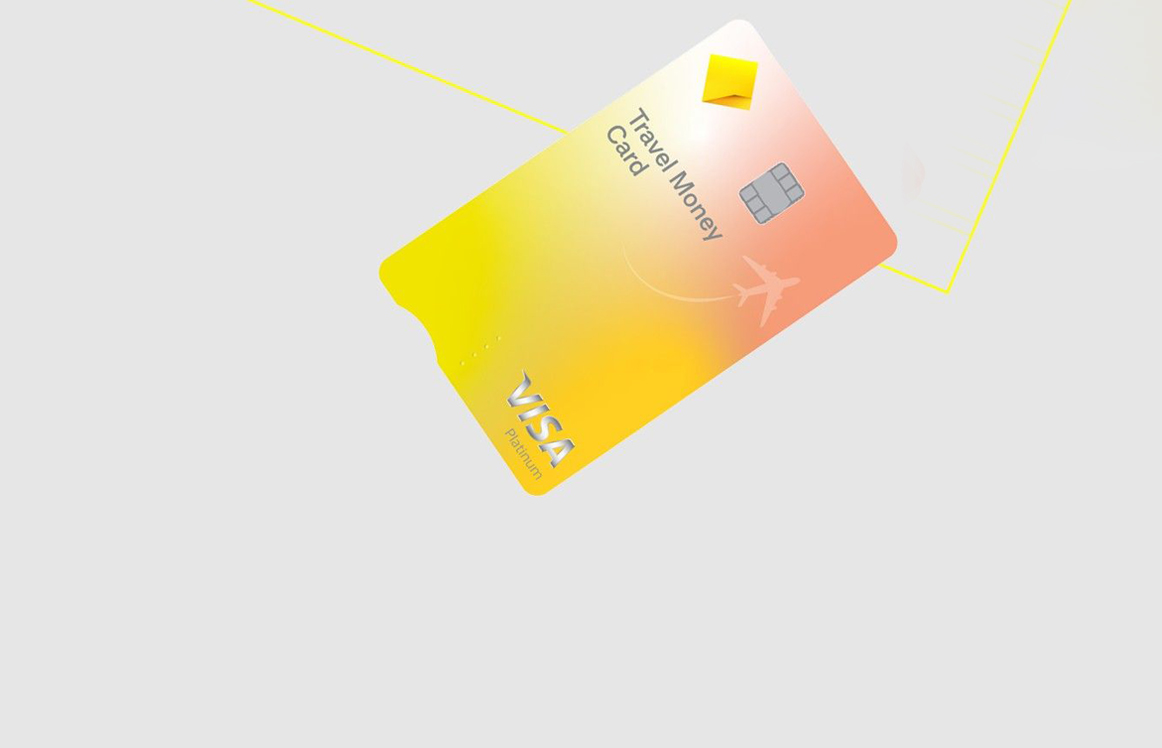
Travel Money Card
Lock in exchange rates and load up to 13 currencies on one account to easily access your money while you’re travelling.
Features & benefits
$0 card issue fee.
Order a Travel Money Card for free in branch or online (search 'Travel Money Card' in the CommBank app or log into NetBank ).
Lock in exchange rates
Load up to 13 currencies on one card before your trip, so you know how much you have to spend, no matter how the Australian Dollar moves.

Spend anywhere in the world
Shop online, in-store, or over the phone wherever Visa is accepted, plus get access to Visa ® travel offers .
Easily manage your travel budget
Manage your holiday money and track your spending via the CommBank app or NetBank.

Your purchases, covered
Lost or stolen personal belongings? We may be able to cover the cost to repair or replace them up to 90 days after purchase. 2
Extra card security
Lost, misplaced or stolen card? Lock it and report it in the CommBank app or NetBank.
- Currency converter
Exchange rates
Load up to 13 currencies on one account
Lock in exchange rates and load up to 13 currencies easily on one account – wherever you are in the world – through NetBank or the CommBank app:
- United States Dollars (USD)
- Euros (EUR)
- Great British pounds (GBP)
- Australian Dollars (AUD)
- Japanese Yen (JPY)
- New Zealand Dollars (NZD)
- Hong Kong Dollars (HKD)
- Canadian Dollars (CAD)
- Singapore Dollars (SGD)
- Thai Baht (THB)
- Vietnamese Dong (VND)
- Chinese Renminbi (CNY)
- Emirati Dirham (AED)
No load or reload fees
You can load up to 13 currencies on your Travel Money Card with no load or reload fees. The exchange rate is the CommBank Retail Foreign Exchange Rate at the time of the conversion.
When you’re ready to pay for something, we will always try to complete the transaction for the country you are in. Make sure you have enough of the correct currency for the country you’re in on your card to avoid additional fees. If you don’t have enough of the local currency, we’ll use the next available currency instead, so long as there’s enough of it loaded on your card.
If you load multiple currencies on your Travel Money Card, you can change the order (the next available currency) anytime online.

Rates & fees
See all fees and charges
Who can apply
To get your Travel Money Card, you’ll need to:
- Be at least 14 years old;
- Be registered to use NetBank, or register online New to CommBank? Sign up to NetBank at your nearest branch ;
- Provide a valid email address; and
- Have an Australian residential address
How to apply
Before your trip.
- Order a Travel Money Card in the CommBank app (search 'Travel Money Card'), NetBank , or at your nearest branch .
- Load at least AUD 50 or the foreign currency equivalent to get started
- Once you’ve got your card, activate and set your PIN online in NetBank, or under Cards in the CommBank app
- Lock-in the exchange rate by loading currency on your card in NetBank or the CommBank app
How it works
During your trip.
- The local currency will be automatically applied when you pay for something, as long as it’s loaded on your card and you have sufficient funds
- Reload in real time , fee-free if your balance gets low
- Stick to daily transaction limits
- The maximum value of purchases per day is unlimited, however no more than your available balance
- The maximum amount you can withdraw from ATMs per day is AUD 2,500 or the foreign currency equivalent. Keep in mind most ATM operators have a limit on how much you can withdraw from an ATM per transaction
- The maximum amount for over-the-counter withdrawals per day is AUD 2,500 or the foreign currency equivalent.
When you’re home
- Got leftover currency? Exchange it for another currency or back into your CommBank account from NetBank or the CommBank app
- Top up your Travel Money Card (it’s valid for 4 years) in preparation for your next trip
- Donate your foreign (and local) currency to any CommBank or Bankwest branch and every cent will go to UNICEF
- How to manage your Travel Money Card
You’ve got your new card – here’s how to get the most out of it.
Find detailed info on getting started, loading and reloading currencies, setting a currency order, checking your balance and tracking your spend. Plus, info on Purchase Security Insurance Cover and access to Visa ® travel offers .
Manage your Travel Money Card

Need foreign cash? Have it ready before you travel
If you’re a CommBank customer, you can buy or sell up to 9 foreign currencies at selected CommBank branches in exchange for Australian Dollars.
You can also order foreign cash in over 30 currencies online – even if you’re not a CommBank customer.
Discover Foreign Cash

Planning an overseas trip?
Discover travel tips to help make the most of your European summer holiday.
See travel tips

Emergency support & tools
What to do if you’ve lost your card or it’s stolen.
If you’ve lost your Travel Money Card, or you think it might’ve been stolen, we can have an emergency replacement card sent to you anywhere in the world.
You may also be eligible for an Emergency Cash Advance, giving you access to cash within 24-48 hours (often on the same day).
Call us in an emergency on:
- 1300 660 700 within Australia
- +61 2 9999 3283 from overseas (reverse charges accepted).
When calling from overseas using your mobile, standard roaming charges may apply. To avoid roaming charges, call the international operator in the country you’re in from a landline and give them our reverse charges number +61 2 9999 3283.
Tools & calculators
- Saving calculator
- Budget planner
- Managing multiple currencies on your Travel Money Card
- Travelling overseas: 10-step money checklist
- Beginners guide to exchange rates
- Online banking while overseas
- Planning an overseas holiday
We can help
Your questions answered
Get in touch
Visit your nearest branch
Things you should know
1 The cash withdrawal fee will not apply to cash withdrawals made in Australia.
2 For more information relating to the complimentary Purchase Security Insurance refer to Travel Money Card Complimentary Insurance Information Booklet (PDF) .
As this advice has been prepared without considering your objectives, financial situation or needs, you should before acting on this advice, consider its appropriateness to your circumstances. The Product Disclosure Statement and Conditions of Use (PDF) issued by Commonwealth Bank of Australia ABN 48 123 123 124 for Travel Money Card should be considered before making any decision about this product. View our Financial Services Guide (PDF) .
To raise a dispute related to your Travel Money Card please complete this form for transactions (PDF) or this form for ATM disputes (PDF) .
Any withdrawal or balance enquiry fee will come from the currency for which you are using your card. If this currency is not loaded on your card, the fee will be taken from the first (or sole) currency loaded on your card. Any SMS balance alert fee will come from the first (or sole) currency loaded on your card.
The target market for this product will be found within the product’s Target Market Determination, available here .
How to pick the right travel credit card for you

Editor's Note
So you've decided to get a travel credit card — congratulations. Now comes the hard part: finding the card that makes the most sense for your wallet.
With so many options on the market, it can be difficult to pick out what kind of credit card will offer you the most value based on your lifestyle and spending habits. To help you make the decision that's best for you, follow these four simple steps.
Decide between a cobranded or general travel rewards card
First and foremost, you'll want to consider the type of travel card you want and the type of rewards you wish to earn. There are two main categories to consider here: cobranded travel credit cards and general travel rewards credit cards.
Cobranded travel credit cards are affiliated with a particular airline or hotel and often come with brand-specific travel benefits. For airline cards , that means perks like free checked bags, priority boarding and inflight discounts. Hotel cards may include annual hotel credits or automatic hotel elite status.
Since cobranded cards help you earn rewards within a specific travel program, they're best suited for frequent travelers loyal to a particular brand, like United Airlines or Marriott.
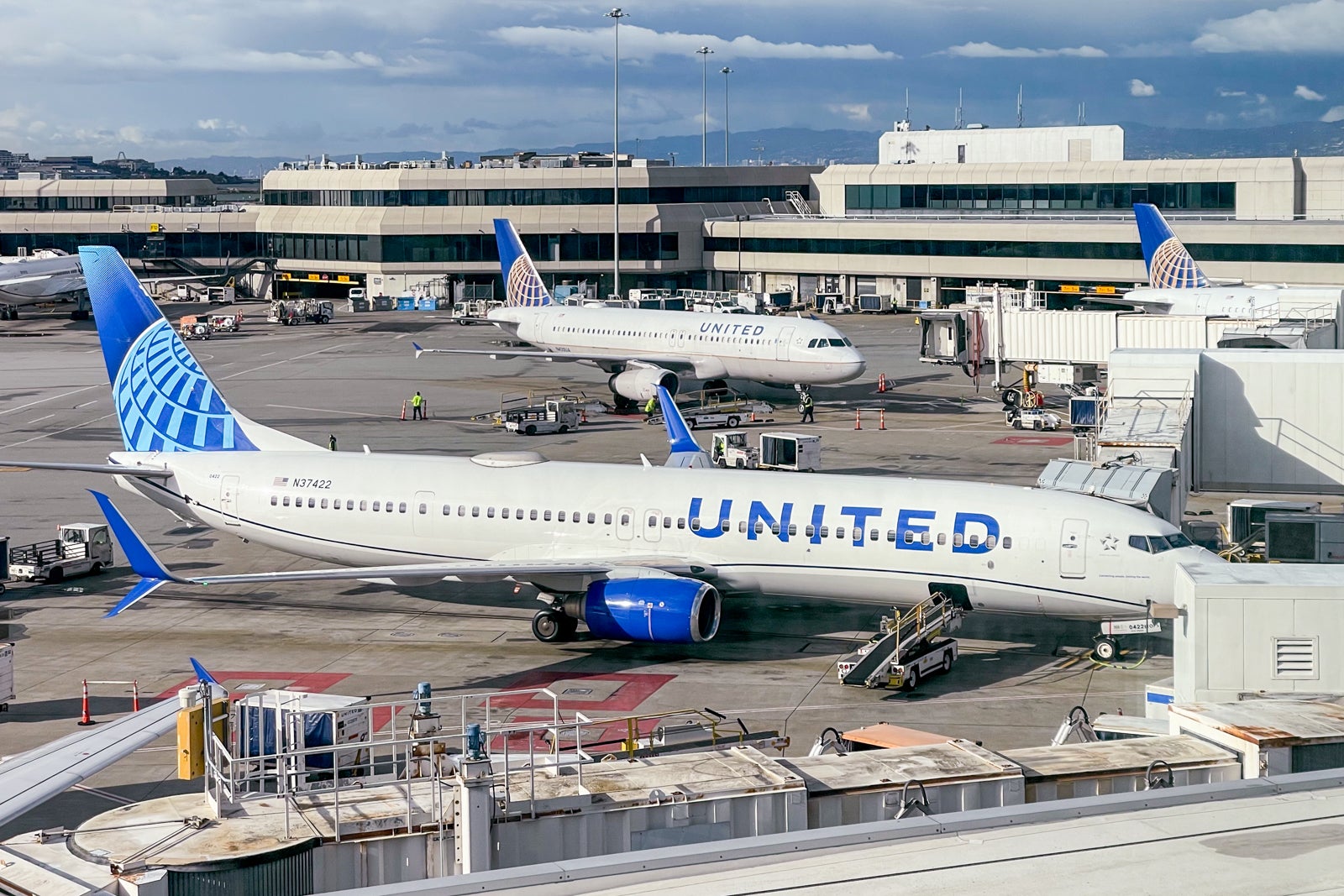
General travel rewards credit cards allow you to earn rewards within a credit card rewards program with various redemption options. With a general travel card, you might be able to transfer your rewards to multiple airline and hotel loyalty programs or use them to book travel through your card issuer's travel portal. You may also be able to redeem your rewards for statement credits, gift cards and select merchandise.
General travel credit cards are typically better for those who want flexibility in their rewards without being tied to a specific airline or hotel brand.
Related: Why all travelers should earn transferable rewards
Find a valuable welcome offer
Next, you'll want to identify a card with a hefty — yet achievable — welcome offer, which can sometimes single-handedly justify your ownership of the card for years on end.
Take stock of your ability to meet the minimum spending requirements on a given offer. For example, the popular Chase Sapphire Preferred® Card 's typical welcome offer is 60,000 bonus points after you spend $4,000 on purchases in the first three months from account opening. Spending $4,000 in three months isn't a terribly high bar to clear, but make sure you can meet that spending level if you're considering getting the card.
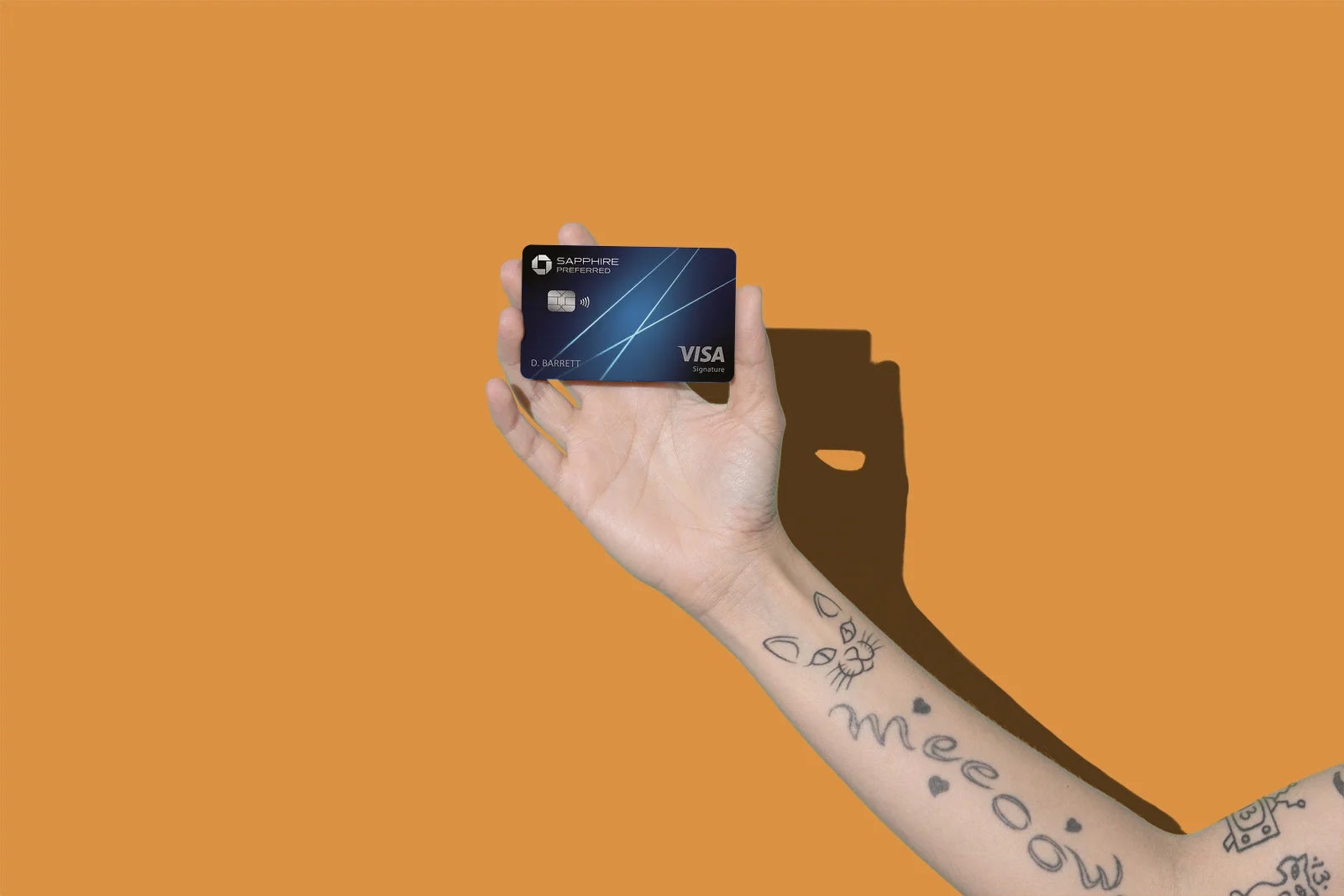
Rewards cards with higher welcome offers typically come with higher minimum spending requirements. You'll also want to keep an eye on card offer histories and potentially take advantage of any elevated welcome offers on cards you're interested in.
Related: The best welcome offers this month
Maximize bonus categories
If you've found a card with a nice sign-up bonus, be sure that it has bonus categories conducive to your spending habits so that you can take advantage of them as much as possible.
If you spend a lot in a given category, like restaurants, groceries or travel , find a card that earns multiple points or miles per dollar when you spend at those places. Predictably, most travel cards also offer bonus rewards when you spend on travel, with Marriott Bonvoy cards offering bonus rewards at Marriott properties, for example, or more general Chase cards offering bonuses when you book travel through Chase Travel℠ .

Welcome offers and bonus categories will make up a major chunk of how you earn rewards, so choose wisely.
Justify the annual fee
Lastly, we recommend only considering the cards with perks that will make a difference to you, with benefits that will help you justify an annual fee (if the card has one) and that you can derive value from the next time you book a trip.

For example, premium offerings like The Platinum Card® from American Express offer lavish perks that are seemingly never-ending. The Amex Platinum has well over $1,400 worth of benefits and statement credits, mostly to offset its $695 annual fee (see rates and fees ), but if you can't take advantage of those perks and find yourself paying almost $700 for benefits you aren't taking advantage of, the card won't be worth it.
There are plenty of cards with no annual fee , which is a good place to start. That said, most annual fees on cards are justifiable and can be more than offset if you use the card and its perks wisely.
Related: The complete guide to credit card annual fees
Bottom line
With so many cards on the market, we know it can be difficult to find the one that's right for you, especially if you're new to the world of points and miles . Our advice is to go for a general travel rewards card if you are a free agent or a specific airline or hotel card if you are loyal to a particular brand. Follow the simple steps in this guide to help narrow your options, and keep it locked on TPG for more advice on finding the right card to help fund your next big trip.
Related: Best travel cards of 2024
For rates and fees of the Amex Platinum, click here .
- Credit cards
- Personal Finance
NAB Rewards Signature Credit Card Overview 2024
NAB Rewards Signature Credit Card
The NAB Rewards Signature Credit Card — one of the bank’s two options for collecting uncapped NAB Rewards Points — has the highest NAB Rewards Points earning rate and is the only NAB rewards card with no international transaction fees.
Fees, interest rates and other details
Basic overview, offers and rewards, eligibility, how to submit an application, customer satisfaction ratings.
With the NAB Signature Credit Card, you can earn up to 3 NAB Reward Points for every $1 spent, and the number of points you can earn each month is not limited. The card’s monthly fee of $24 can be reversed if you spend at least $5,000 per billing period.
This travel rewards card also comes with a complimentary suite of insurance coverage and travel perks, like complimentary flight lounge passes for delayed flights.
You can transfer NAB Rewards Points to other rewards and loyalty programs , such as flybuys, Velocity Frequent Flyer, Accor Live Limitless (ALL), KrisFlyer, Cathay or Air New Zealand Airpoints programs, but you cannot use them to redeem Qantas points.
Understanding the monthly fee’s value
Over time the rewards and benefits of a credit card could potentially outweigh the monthly fee, depending on how you use the card. Here are a few ways you can ‘cover’ the $24 monthly cost:
- Spending at least $5,000 in a statement period to have the fee reversed.
- Redeeming at least 12,500 NAB Rewards Points for $50 cashback.
- Claiming the 180,000 bonus-point introductory offer — which, if exchanged for cashback, could cover the monthly fee for up to 29 months (assuming no restrictions apply).
🤓 Nerdy Tip : Know the true cost of rewards
To earn credit card rewards, your account must be in good standing and you may need to meet spending minimums. It’s important to remember that in doing so, you may incur fees and interest charges in addition to the annual or monthly card fee. These costs may offset the overall value of the rewards you accumulate and potentially any ‘savings’ you make through an introductory offer or through redeeming points for other benefits. So, balancing your spending and account management to maximise benefits whilst mitigating costs is crucial.
Understanding the balance transfer offer
The NAB Rewards Signature Credit Card offers 0% interest on balance transfers for the first 12 months. This means you can move over an existing credit card balance and pay zero interest on your transferred balance for a year.
To retain the 0% interest rate on your balance transfer, you must make the interest-free days payment by the due date shown on your statement each month.
It’s also important to know that you won’t be able to transfer your balance from every card. For example, NAB cannot process balance transfers for cards from the following issuers :
- Bendigo Bank
- Great Southern Bank
- Heritage Bank
- Adelaide Bank
- credit unions
- AMEX cards.
🤓 Nerdy Tip : Mind the revert rate
If you have a credit card balance on a card with a high interest rate, moving the balance to one with 0% interest could save you money — and give you time to pay down the balance. Keep in mind that the new card’s standard interest rate applies once the promotional period ends. So, ideally, you want to pay off the debt during the 0% interest period. It’s also important to consider the new card’s standard rate versus the interest rate you are paying on your current card, especially where you may not be able to pay the balance transfer off within the 0% interest rate period.
180,000 NAB Rewards Points may be available during the first year of ownership.
- Earn 130,000 bonus points when you spend at least $3,000 on eligible purchases in the first 60 days.
- Get an extra 50,000 bonus points if you keep the card for more than one year.
What’s the welcome offer worth?
The value of the welcome offer differs based on how points are redeemed. Here are a few examples of what you could get with 180,000 NAB Rewards Points:
- $880 in gift cards
- $720 in cashback
- Various merchandise and experiences, such as a hot air ballooning trip for two over Hunter Valley.
When transferred to another frequent flyer program, 180,000 NAB Rewards Points equals:
- 180,000 Flybuys points
- 90,000 Velocity Frequent Flyer points
- 30,000 Accor Live Limitless (ALL) points
- 60,000 Singapore Airline KrisFlyer Miles
- 60,000 Asia Miles (Cathay Membership Programme)
- 900 Airport Dollars (Air New Zealand Airports).
The above offers and the redeemable values of the points were current at the time of writing and are subject to change.
Beyond the constraints of your credit limit, there is no limit on the number of NAB Rewards Points using the Signature card. Here are a few examples of how purchases may earn you NAB Rewards:
Earn 3 NAB Rewards Points per $1 spent with Webjet.
Earn 1.5 NAB Rewards Points per $1 on all eligible purchases, up to $15,000 per statement period.
Earn 0.5 NAB Rewards Points per $1 on all eligible purchases after you spend $15,000 in a statement period.
You can redeem NAB Reward Points in the following ways:
- Cash back: 12,500 NAB Rewards Points equals $50 cashback.
- Travel with Webjet: You can redeem points for flights, selected hotels and holiday packages through the Webjet website.
- NAB Rewards Store: You can redeem points for merchandise, experiences, gift cards and charity donations through the Store.
- 3,000 Flybuys points
- 1,500 Velocity Points
- 500 Accor Live Limitless (ALL) points
- 1,000 KrisFlyer Miles
- 1,000 Asia Miles
- 15 Airpoints Dollars.
Who may be eligible?
To apply for the NAB Rewards Signature Credit Card, you must:
- be at least 18 years old
- receive a regular income
- be an Australian resident for tax purposes
- be an Australian or New Zealand citizen, an Australian permanent resident or a non-resident holding an acceptable visa.
Who might be suited to this card?
According to NAB’s Target Market Determination (TMD) [1] , this product may be suitable for :
- a person who wants a credit card for everyday spending or large household purchases and to flexibly manage their monthly spending
- a person who wants to make the most out of their purchases by earning NAB Rewards Points at a higher earn rate and is likely to make purchases at a rate to achieve those points.
- a person who wants access to complimentary travel and purchase insurance.
- a person who wants to manage and reduce the interest on their card.
- a person who is willing to pay a higher annual fee and interest rate or get access to additional features and benefits.
- a person who is not likely to carry a substantial balance over an extended period.
Who might not be suited to this card?
NAB’s TMD also states that this product is not suitable for a person:
- a lower minimum credit limit
- a lower annual fee
- a lower interest rate
- a basic credit card without rewards points
- who is likely to carry a substantial balance over an extended period.
To apply for the NAB Rewards Signature Credit Card online, click the ‘Apply now’ button and follow the prompts. New customers to NAB should have the following items handy to submit:
- identification, such as a driver’s license or passport
- employment details
- income, assets, debt and data about living expenses
- proof of income, such as payslips and bank statements.
The application takes roughly 15 minutes to complete. If your application is approved, your NAB Rewards Signature Credit Card will arrive in the mail within five business days.
» MORE: How to activate your new credit card
Note: Customer review websites can be insightful, but keep in mind that the reviews may not accurately reflect the average experience; for example, unhappy customers may be overrepresented in these reviews. Products also change over time, and reviews may reflect experiences with features and benefits that are no longer available. Nevertheless, these sites are just one way to learn more about the company and the products on offer before you make a decision.
As of this writing:
- Based on over 290 Trustpilot reviews , NAB scored: 1.8 out of 5 stars .
- Based on less than 10 ratings from Product Review , the NAB Rewards Signature Credit Card scored: 3 out of 5 stars .
NerdWallet does not endorse the above scores or reviews and provides them for illustrative purposes only.
Frequently asked questions
No strict minimum income requirements are advertised online for the NAB Rewards Signature Credit Card. However, applicants must receive regular income to apply. Each applicant must also meet NAB’s credit assessment criteria, which will be at the Bank’s sole discretion.
No. The NAB Rewards Signature Credit Card earns NAB Rewards Points, which you cannot redeem for Qantas points.
Article Sources
- NAB , “ Target Market Determination NAB Rewards Signature Card ,” accessed June 27, 2024.
About the Author
Georgia Rose is a lead writer on the international team at NerdWallet. Her work has been featured in The Washington Post, The New York Times, The Independent and The Associated…
DIVE EVEN DEEPER
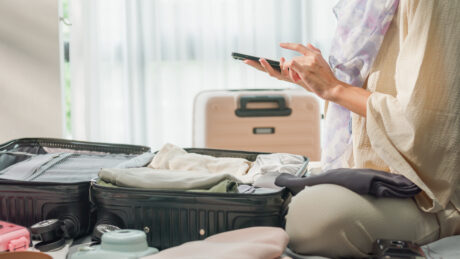
How Does Credit Card Travel Insurance Work?
Travel overseas with the safety of insurance — and get it for free through your credit card.
8 Tips For Using A Credit Card Overseas
Follow best practices when using a credit card overseas, like using a travel money card, carrying cash and leveraging frequent flyer points.

How To Pay Off Your Credit Card
Tricks to paying off credit cards include repaying more than the minimum, consolidating debt, using a balance transfer, and other debt relief strategies.
How To Choose A Credit Card Rewards Program
Everyone should experience the feeling of their first free flight, thanks to credit card rewards. Here’s how to compare programs and choose a rewards credit card that suits you.
Latest offers
Update your browser..
This website doesn't support your browser and may impact your experience.
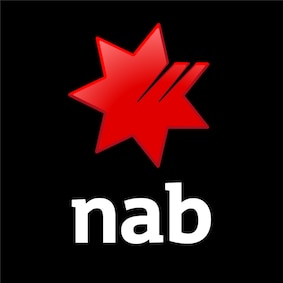
NAB Mobile Banking app
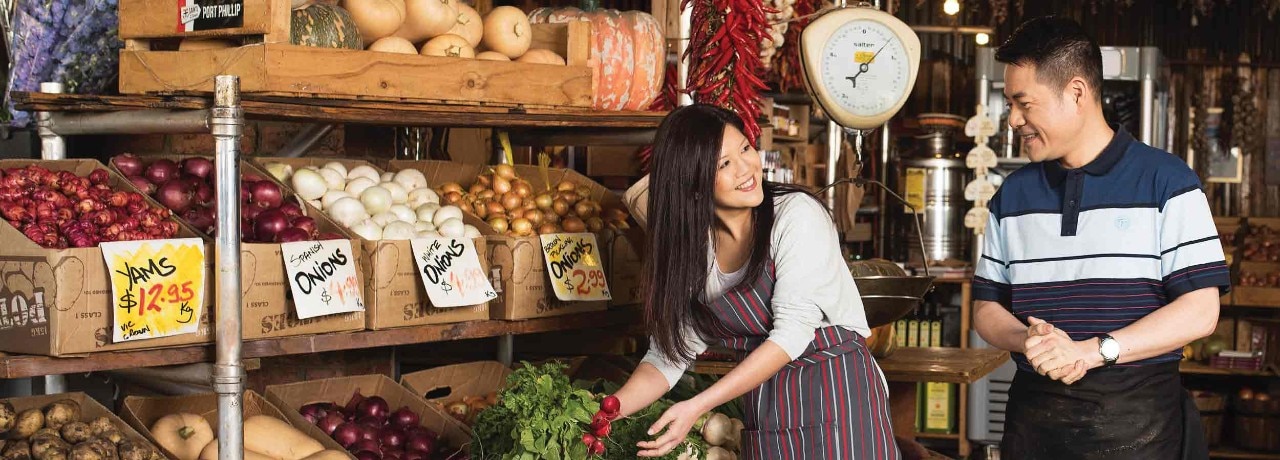
International transaction fee on your card explained
Learn about the International transaction fee, and when it may apply to your card.
What is an international transaction fee?
An international transaction fee is a charge that applies to any transaction processed outside of Australia, or in a foreign currency.
The international transaction fee applies when you use your NAB Visa Debit cards or NAB credit cards for purchase/cash withdrawal transactions with an overseas merchant which is processed outside Australia or in a foreign currency. Knowing when you’ll be charged the fee, how much it is and how to avoid it can be confusing. Let’s break it down and simplify it for you. It’s important to know that you don’t have to be overseas for the fees to apply.
International transactions are transactions where the merchant, financial institution, or entity processing the transaction is located outside Australia. These transactions are either:
- Single-currency international transaction: where the transaction or cash withdrawal is made in Australian dollars (AUD).
- Multi-currency international transaction: where the transaction or cash withdrawal is made in a currency other than AUD.
The NAB International Transaction Fee applies to all NAB personal credit cards and NAB Visa Debit cards except the NAB Visa One Fee-Free Card, NAB Rewards Signature Card, NAB StraightUp Card and purchase transactions on the NAB Platinum Visa Debit Card.
When you’ll be charged a fee
Here are some of the most common examples of when the fee applies.
Shopping online
Do you love online shopping or frequently book holidays or hotels online? If you do, be aware that any transaction processed outside of Australia or in any foreign currency (e.g. USD or GBP) will attract the fee.
It may not always be obvious that your purchase is being processed overseas. For example, you could be on a '.com.au' website and paying for the purchase in Australian dollars (AUD). However, the transaction is actually being processed by the merchant outside of Australia and the fee will apply.
Travelling overseas
The NAB International Transaction Fee applies when you use your NAB credit card or NAB Visa Debit card overseas to:
- make a purchase
- withdraw cash from an ATM (a 'cash advance' * ).
When buying something overseas, you may be given the option to pay in either local currency or Australian dollars (AUD). In either case, you’ll be charged your card’s international transaction fee.
While it may seem helpful to see the amount you’re paying in Australian dollars (AUD), you should check the exchange rate to determine which option is better for you.
You can find up-to-date Visa currency conversion rates in the NAB app by selecting More from the menu before logging in and selecting Foreign exchange . If you choose to pay in Australian dollars (AUD), be aware that the exchange rate the merchant uses to convert the transaction amount might be different to the exchange rate Visa uses.
Products with no international transaction fee
To avoid the international transaction fee, look for products that allow you to shop overseas without incurring them.
The NAB Rewards Signature Card doesn't charge an international transaction fee on purchases processed overseas and cash withdrawals from an overseas ATM. Standard cash advance fees and fees for using international ATMs still apply.
The NAB StraightUp Card comes with no interest as well as no international transaction fee. There’s just a simple monthly fee and minimum monthly payment based on your credit limit.
The NAB Platinum Visa Debit card doesn’t charge an international transaction fee on purchase transactions processed overseas. It does charge an international transaction fee on overseas cash withdrawals, and fees for using international ATMs.
NAB Now Pay Later has no international transaction fees, plus no late fees, account fees or interest. Our buy now pay later account is a simple way to split your everyday purchases into four equal repayments. Available in the NAB app only * .
Learn more about how to choose the right credit card for your next holiday .
Fee amounts for different transactions
See what fees apply when using your card for international purchases.
Explore travel benefits and rewards
Get the most from your next holiday with rewards points, cashback offers, zero foreign transaction fees, complimentary travel insurance and more.
More holiday tips
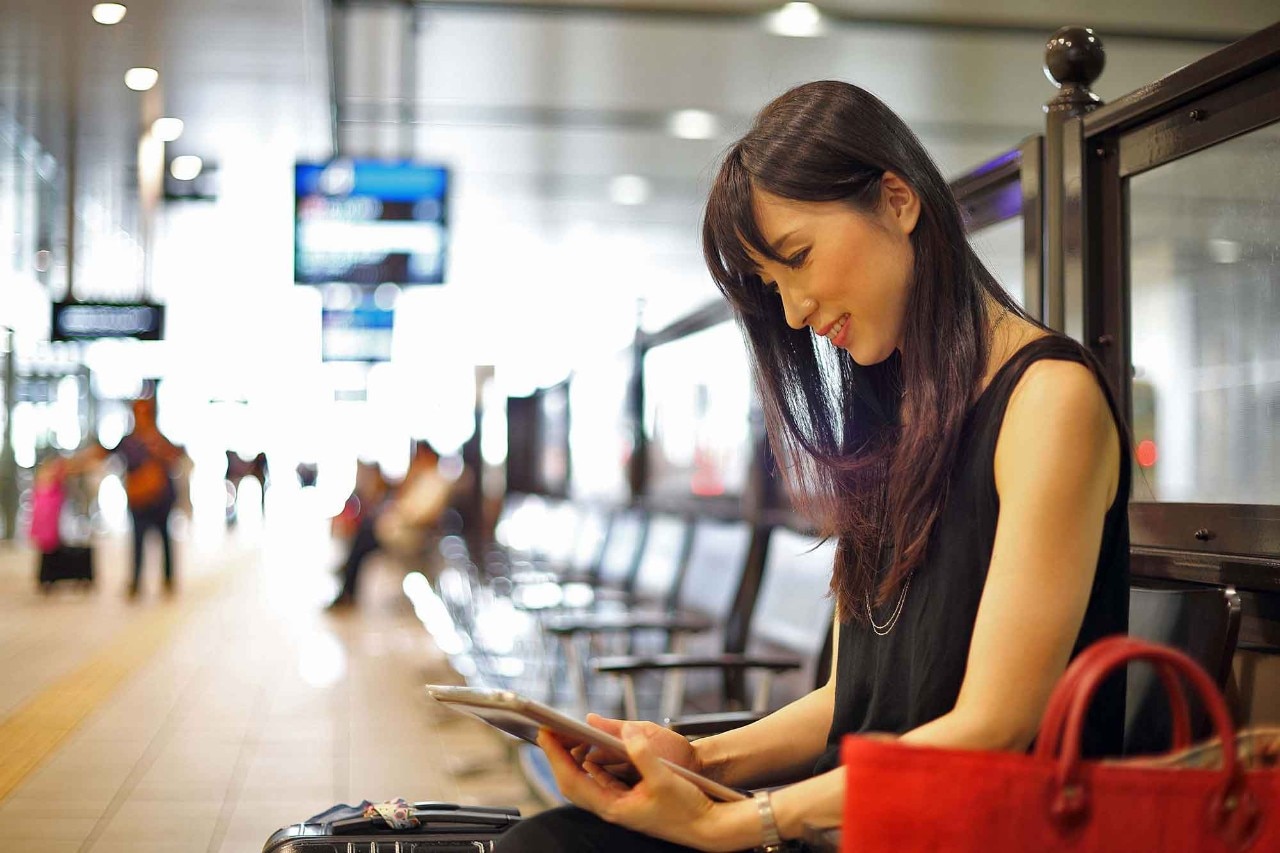
Common credit card fees and ways to avoid them
Understand the different types of fees and ways to avoid paying them.

Travel smart with the NAB app
Use the NAB app's travel tools to track your spending on your NAB Visa card.
Related products and services
Nab platinum visa debit card.
With additional benefits and features, this platinum debit card is your premium everyday card both at home and overseas.
NAB Foreign Currency Account
A transaction account for customers who frequently make or receive payments in a foreign currency.
Foreign currency cash service unavailable
Due to COVID-19 restrictions, you’re currently unable to order foreign currency cash in branch or online.
Get in touch
Customer support tool.
Solve problems quickly online with our easy-to-follow guides. Simply select a topic and we’ll direct you to the information you need.
Visit our personal banking contact page for FAQ’s and how-to-guides, help from our virtual assistant and contact numbers.
Visit a NAB branch
Visit us in person at your nearest NAB branch or business banking centre.
Important Information
Important information.
This section contains Important Information relevant to the page you are viewing, but you can't see it because you have JavaScript disabled on your browser. Please enable JavaScript and come back so you can see the complete page. It's important that you read the Important Information in this section before acting on any information on this page.
Apologies but the Important Information section you are trying to view is not displaying properly at the moment. Please refresh the page or try again later.
Target Market Determinations for these products are available at nab.com.au/TMD .
Full terms and conditions will be available in the NAB app when applying for NAB Now Pay Later.

COMMENTS
Spend your money the way you want. You'll be able to use your card wherever Visa is accepted, including overseas and online. Remember, you're only ever spending funds from your transaction account. Use your NAB Visa Debit card to: Withdraw money at ATMs or at a branch, and to make purchases in person, online or over the phone. You can also use ...
Send money overseas. Send money around the world with a $0 international transfer fee when you use the NAB app or NAB Internet Banking and send the money in a foreign currency. 1. Track payments 2. No minimum transfer. See how to make international transfers easily with NAB.
NAB Platinum Visa Debit card. Annual/Monthly Fee. $0. $0. $10 per month. ATM Withdrawal Fee. No charge from NAB while overseas; $3.75 AUD charged in Australia. $5 per withdrawal and 3% of cash ...
charge at least $500 of your prepaid travel costs to the accountholder's card account before leaving Australia; ... (Allianz), has issued an insurance group policy to National Australia Bank Limited ABN 12 004 044 937 AFSL and Australian credit licence 230686 (NAB) which allows eligible persons to claim under it as third-party beneficiaries. ...
National Australia Bank has made its Traveller Card even easier for jetsetters to use with a new capability to manage funds through internet banking from anywhere in the world. ... Todd Copeland said NAB was the first Australian Bank to link a travel card to its internet banking platform, giving customers the ability to manage their travel ...
Faster, easier top up. Now you can securely store your payment card details in the Cash Passport app, so whenever and wherever you are, you can top up with up to 10 currencies, including Euros, US, Australian and Canadian Dollars and British Pounds at the touch of a button. Smarter money management.
Withdrawing €500 From An ATM. Our Picks: Best Travel Debit Cards In 2024. Up Debit Card. Ubank Debit Card. Revolut Australia. Macquarie Transaction Account. HSBC Everyday Global Account. Wise Multi-Currency Account. Honourable Mentions - Best Travel Debit Card.
Australia Post Travel Platinum Mastercard. Available online or at post offices. Currencies: AUD, USD, NZD, EUR, GBP, SGD, THB, JPY, HKD, CAD, AED. Fees: Fee to reload the card via BPay, debit card or instore, but free via online bank transfer. Closure fee. Fees for ATM withdrawals in Australia and overseas.
How to make a claim through your NAB credit card complimentary international travel insurance policy. If it's an emergency, call Allianz on +617 3305 8800 when you're overseas or 1800 010 075 in ...
The Best Travel Money Card analysis also revealed that NAB's Traveller Card was the only one not to have any fees, but it ranked fifth for not offering as much as the others when converting ...
Here is a list of the 6 best prepaid cards you can take with you on your travels and the positives and negatives for each one: Wise - our pick for prepaid cards. Revolut - low fees. Citibank - good for use at home. Travelex - no fees for ATM withdrawals. Australia Post - lock in exchange rates. HSBC - no international transaction fees.
NAB Traveller Card (Travel Money or Currency Exchange): 1.6 out of 5 stars from 194 genuine reviews on Australia's largest opinion site ProductReview.com.au. ... On ill advice of this bank, I loaded a NAB Travel card with USD at a terrible exchange rate, then I was charged 4% conversion fees on transactions because - although I made purchases ...
Just like the daily transaction account, the NAB Retirement Account does not charge monthly account-keeping fees, transaction fees or withdrawal fees inside Australia. The interest rate you will ...
See whether National Australia Bank offers travel cards. NAB suspended offering travel cards in September 2022. If you have additional questions, please call 13-22-65. ... All National Australia Bank FAQ. Author: Prostobank Consulting. Updated: 01.06.2024. Popular Banks in Australia. Commonwealth Bank of Australia.
0% International transaction fee for online purchases, or when overseas. Complimentary insurances, including purchase protection, extended warranty and travel insurances 3. Full 24/7 access to NAB Concierge Service 4. Plus all the benefits of a NAB Visa Debit card. Open online in less than 5 minutes.
When you open a new Travel Money Card account online via NetBank or in branch. $0. Initial load/reload fee. When you initially load/reload funds onto your Travel Money Card or transfer funds from your Travel Money Card to an eligible CommBank account via NetBank or the CommBank app. The rate applicable is the CommBank Retail Foreign Exchange ...
So you've decided to get a travel credit card — congratulations. Now comes the hard part: finding the card that makes the most sense for your wallet. With so many options on the market, it can be difficult to pick out what kind of credit card will offer you the most value based on your lifestyle and spending habits. To help you make the decision that's best for you, follow these four simple ...
Use a NAB Visa Debit card. NAB Visa Debit cards give you easy and secure access to your money wherever Visa is accepted in the world. Your card is linked to your NAB Classic Banking account or NAB Retirement Account (where eligible) so you can use your own savings to pay for day-to-day purchases and spending while you're overseas.
If you leave Australia to live in another country, we'll cancel your card when you depart. If you travel for a short term, your card will remain current for up to 6 weeks. But you must be getting your main payment. If your main payment stops, we'll cancel your card. Check the travel rules for your main payment while outside Australia to ...
The NAB Platinum Visa Debit card gives you all the trimmings of a Visa Debit card with additional features - discover more now. ... The NAB Concierge Service is a complete travel and lifestyle service available anywhere in the world 24 hours a day, seven days a week. ... These products are issued by National Australia Bank Limited.
The NAB Rewards Signature Credit Card costs $24 per month (equal to $288 annually), earns up to 3 NAB Rewards Points, and comes with complimentary insurance. Annual fee $24 per month ($0 if you ...
The NAB Platinum Visa Debit card doesn't charge an international transaction fee on purchase transactions processed overseas. It does charge an international transaction fee on overseas cash withdrawals, and fees for using international ATMs. NAB Now Pay Later has no international transaction fees, plus no late fees, account fees or interest.